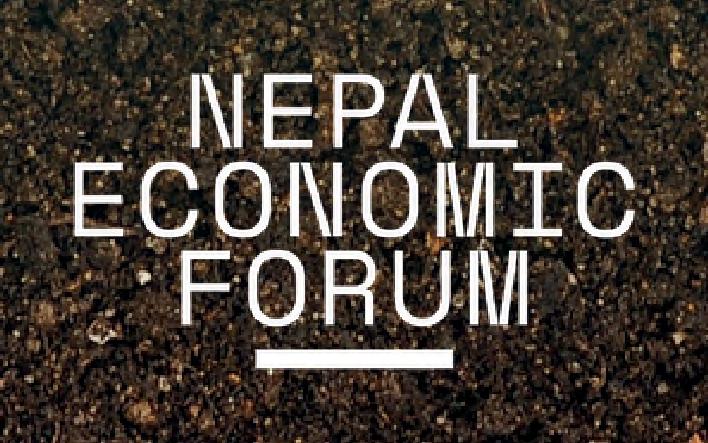





































Issue 52: March 2023
Publisher: Nepal Economic Forum
Website: www.nepaleconomicforum.org
P.O Box 7025, Krishna Galli, Lalitpur – 3 Nepal Phone: +977 1 554-8400
Email: info@nepaleconomicforum.org
Contributors:
Kaatya Mishra
Karun Dhakal
Krisha Shakya
Nasala Maharjan
Sadichchha Sanjel
Sakshee Singh
Sugam Nanda Bajracharya
Sukeerti Shrestha
Special Section Authors: Neha Thapa, Sr. Area Coordinator, KISAN II Project, CEAPRED Sagar GC, Team Leader, Green Karnali Project, LI-BIRD Interview of Yuvaraj Gurung, Managing Director of Agro Manang
Design & Layout: Thuprai Solutions support@thuprai.com
Cover Design: Sakshee Singh
The issue of Nefport takes into account news updates from 1 December 2022 to 28 February 2023.
The USD conversion rate for this issue is NPR 131.32 to a dollar, the quarterly average of the review period for this issue.
Reproduction is authorised provided the source is acknowledged. The views and opinions expressed in the article/publication are those of the author(s) and do not necessarily reflect the official opinion of Nepal Economic Forum. Neither the organisation nor any person acting on their behalf may be held responsible for the use which may be made of the information contained therein.
Executive Board Members:
Alpa B. Shakya
Chandni Singh
Shayasta Tuladhar
Sudip Bhaju
Sujeev Shakya
Advisory Board:
Arnico Panday
Kul Chandra Gautam
Mahendra Krishna Shrestha
Prativa Pandey
Shraddha Gautam
Sneh Rajbhandari
Senior Distinguished Fellows:
Bibhakar Shakya
Giuseppe Savino Suman Basnet
Senior Fellows:
Amish Raj Mulmi
Apekshya Shah
Ashraya Dixit
Bibek Raj Kandel
Diva Shrestha
Himal Neupane
Mark Perrin
2
NEPAL FACTSHEET 2 EDITORIAL 5 Contents MARKET REVIEW 76 Financial Market 77 Capital Market 84 4 SPECIAL SECTION: AGRICULTURE - PERSPECTIVES FROM THE GROUND 87 ENDNOTES 97 5 SECTORAL REVIEW 42 Agriculture and Livestock 43 Energy and Environment 47 Infrastructure and Real Estate 53 Information and Communication Technology 56 Education 60 Health 65 Tourism 69 3 2 MACROECONOMIC OVERVIEW 20 1 GENERAL OVERVIEW 6 Political Overview 7 International Economy 14
Nepal Factsheet
6 7
4 5
3
KEY ECONOMIC INDICATORS
2
*Preliminary estimate of FY 2022/23 (y-o-y mid-July to mid-July)
**World Bank, Global Economic Prospects January 2023 update
***HDI figure from Human Development Report of the UNDP 2021/22
**** Current Macroeconomic and Financial Situation of Nepal (Based on three months' data ending mid-Janaury 2022/23)
***** Current Macroeconomic and Financial Situation of Nepal (Based on annual data of FY 2021/22)
GDP (estimated 2022/23)* USD 39 billion GDP growth rate** 5.10% GNI (PPP)**** USD 13.5 Inflation (y-o-y)**** 7.26% Gross Capital Formulation (% of GDP)**** 37.30% Agriculture Sector (% of GDP)***** 23.95% HDI value*** * 0.602 Industry Sector ***** 14.29% HDI rank*** 143 Service Sector (% of GDP)***** 61.76%
Koshi Province
Madhesh Province
Bagmati Province
Gandaki Province 5 Lumbini Province
Karnali Province 7 Sudurpashchim Province
1
2
3
4
6
1
Editorial
The year 2023 for Nepal began with a focus on the new government, the second administration after the new constitution was promulgated in 2022. The coalition that came to power could not sustain itself and a new coalition went ahead to lead the government. While these adjustment went on, Nepal elected its new President. Every now and then, the country reaches a moment of steadiness, however, political uncertainty returns to disrupt. The political quagmire continues to impact the next wave of reforms critical to economic growth and development. Laws and reforms stalled since July 2019 have finally been picked to be amended and passed but with the current parliament has completed only 4 out of 60-month tenure with any major business being conducted. Evidently, this impacts the smooth functioning of bureaucracy in the country as people delay and look forward to a reshuffle to take place – further delaying processes and systems to follow.
The economic activities have been impacted by high interest rates and liquidity squeeze. Definitely this has put discussion on economic challenges and opportunities to the forefront. The fundamentals of Nepali economic growth and development still lies in agricultural activities and Nefport 52nd’s theme has been chosen keeping it in mind. In this special issue, the focus is to explore Agriculture with Perspectives from the Ground bringing in voices that echo the lived experiences and realities of individuals and communities who influence the policy and/or decision-making processes from an agri-business and private sector perspective. This issue focuses on the policy gaps and potentials that cultivate conversations around agriculture in Nepal. Time and again, these conversations prove to be essential for promoting food security, mitigating climate change impacts, promoting rural development, and empowering gender responsiveness. Agri-businesses are essential for ensuring food security, creating employment opportunities, promoting innovation, and supporting sustainable agriculture practices. Agri-businesses and the private sector help to recognize and fill in the gaps in farming practices, policies, and programs in Nepal that are both sustainable and resilient to the impacts of a changing climate.
Nefport 52, in its special section, Agriculture - Perspectives from the Ground, will examine the prospects of effectively integrating climate responsiveness and agricultural growth from the voices of those who have had first-hand experience with the agri-business and private sector landscape. The section includes multiple perspectives and outlooks to ensure a sustainable and resilient future for farmers and communities. It will also explore the ways Nepal can determine the most efficient, effective, and equitable food systems that address various issues across productive landscapes.
In the next quarter, we are looking forward to launching the – NEF Economic Dashboard and a publication titled “Introspecting Change: Nepal’s Economic Awakening”. The dashboard will be a one stop portal to access key economic data of Nepal and would help us integrate better with global platforms The publication will be retracing Nepal’s journey across different sectors - agriculture, energy, finance, manufacturing, information and communication technology, and tourism.
We are incredibly appreciative of all the voluntary contributions from many individuals who have enhanced the content of each issue. We would like to thank our readers, patrons, and everyone else who for their continued support and engagement. We’d like to acknowledge the contributions made by Neha Thapa, Sagar GC, and Yuvaraj Gurung this edition of Nefport.

We are working continuously on recalibrating our Nefports to make them more useful to our readers. Please feel free to write to us at info@nepaleconomicforum.org for any further comments or feedback.
Sujeev Shakya Chair, Nepal Economic Forum
NEFPORT ISSUE 52 – MARCH 2023 5
General Overview

DOCKING NEPAL’S ECONOMIC ANALYSIS 6 1
Political Overview
Nepali politics witnessed several ups and downs during the review period. Pushpa Kamal Dahal, the Chair of the Communist Party of Nepal-Maoist Center (CPN-Maoist Center), was elected as the Prime Minister of Nepal on December 25, 2022, with the support of 169 lawmakers. However, after only 64 days, Prime Minister Dahal-led government fell into the minority. With the withdrawal of the Communist Party of Nepal – United Marxists Leninists (CPNUML) and Rastriya Prajatantra Party (RPP), the government is now in the minority with only 77 members of parliament on board. Similarly, Nepali Congress leader Ramchandra Poudel was elected as Nepal’s third President with the CPN-Maoist Center’s support. During the review period, the Federal Budget's midterm review was also presented. The government decided to reduce the size of the budget as well as the anticipated revenue because it was unable to spend its allotted funds or adequately collect the targeted revenue.
EXECUTIVE UPDATES
Coalition Government Led by CPN-Maoist Leader
Pushpa Kamal Dahal Formed
CPN - Maoist Center Chairperson
Pushpa Kamal Dahal was sworn in as the new Prime Minister of Nepal on December 26, 2022, as per Article 76 (2) of the Constitution of Nepal (2015). Dahal was given support by 169 Members of Parliament (MPs) from the CPNMaoist Center, the CNP - UML, the Rastriya Swatantra Party (RSP), the Rastriya Prajatantra
Party (RPP), the Janamat Party, the Janata Samajbadi Party (JSP), the Nagarik Unmukti Party (NUP) and three independent MPs in his bid to serve as prime minister for the first two years of the new parliament's fiveyear mandate.5 The members of the former coalition, which included the Nepali Congress (NC), CPN – Maoist Center, CPN – United Socialists (CPNUS), Loktantrik Samajbadi Party (LSP), and Rastriya Janamorcha Party (RJP) had an agreement to maintain the coalition to form the new government. Nevertheless,
NEFPORT ISSUE 52 – MARCH 2023 7
FACTSHEET Particulars Nepal's Rank Score Press Freedom Index 20221 76th 62.67 Democracy Index 2021 101st 4.41 Freedom in the World Index 2021 123rd 56
Index Rank Score Economic Freedom Index 20232 (Out of 176 countries) 142 51.4 Fragile State Index 20223 (Out of 179 countries) 49 80.6 Corruption Perception Index 20224 (Out of 180 countries) 110 34
Pushpa Kamal Dahal, and Sher Bahadur Deuba, the President of the NC, were unable to agree on who would take office as a prime minister first. Deuba reportedly insisted on becoming the prime minister for the sixth time. Meanwhile, CPN-UML chair, KP Sharma Oli, was willing to offer Dahal two and a half years as Prime Minister if Dahal renounced his coalition with the NC, which Dahal accepted.6
Prime Minister Pushpa Kamal Dahal Wins Vote of Confidence
Prime Minister, Pushpa Kamal Dahal, received a vote of confidence from the House of Representatives on January 10, 2023, per the provisions of Article 76(4) of the Constitution of Nepal (2015). Prime Minister Dahal received a vote of confidence from 268 MPs out of 270 MPs who took part in the vote. He received the support of all political parties and independent lawmakers, except for Prem Suwal of the Nepal Majdoor Kisan Party and Chitra Bahadur KC of the Rastriya Janamorcha.7 According to Sher Bahadur Deuba, Chairperson of the Nepali Congress, the party supported Prime Minister Dahal during the vote of confidence motion because they believed he would defend the constitution and work for the good of the nation as well as its citizens in light of the challenges facing it.
Parliamentary experts contend that the Nepali Congress has joined the ruling coalition by voting to support the prime minister, despite the party's assertion that it will continue to serve as the main opposition party in the legislature.8 It has been clear that Deuba backed
Dahal in the hopes of securing a favorable outcome for the upcoming presidential election from the Maoist side.
Rabi Lamichhane Loses Member of Parliament Status
RSP Chair, Rabi Lamichhane, lost his position as the Member of Parliament, Deputy Prime Minister, and Home Minister on January 27, 2023, after the Supreme Court ruled that Lamichhane had failed to reclaim his Nepali citizenship following the law.9 The Constitutional Bench concluded that after renouncing his American citizenship, all of Lamichhane’s actions as a Nepali citizen would be unlawful because he had used the citizenship that had been revoked without obtaining his new Nepali citizenship. Consequently, Lamichhane also lost the position of RSP Chairperson. In the midst of all of this, he received his citizenship certificate from the District Administration Office in Kathmandu days after and was re-appointed to the position of RSP Chair. Questions and interest are still being raised by the Lamichhane citizenship case. While he gave up his US citizenship in 2018, he utilized his void citizenship certificate to acquire a Nepali passport in 2015. According to Section 21 (A) of Nepal's Passport Act 2019, getting a passport using false information is a crime subject to a fine of up to NPR 500,000 (USD 3807.23), a sentence of one to three years in jail, or both.10
Rastriya Swatantra Party Quits the Dahal-led
Government
RSP currently holds 19 seats in the
lower house after the Supreme Court’s verdict that stripped RSP Chairperson Rabi Lamichhane’s status as one of the Members of Parliament (MP) and the Home Minister. However, on February 5, 2023, the RSP decided to quit the government as Prime Minister Pushpa Kamal Dahal refused to return the home portfolio to the party. A joint meeting of the RSP’s central and parliamentary committee decided to recall its ministers. Three ministers from the RSP, namely - Shishir Khanal (Minister of Education, Science, and Technology), Dol Prasad Aryal (Minster for Labour, Employment and Social Security), and Toshima Karki (Minister of State for Health and Population) tendered their resignations. However, Lamichhane stated that his party would not withdraw support from the government to avoid political instability.11
Rastra Prajatantra Party Quits the Dahal-led Government
On February 25, 2023, the Rastriya Prajatantra Party (RPP) announced that it was leaving the government due to changes in the political climate. A joint meeting of the Central Executive Committee of the party and MPs decided to terminate the coalition and recall every RPP minister from the Cabinet.12 Four ministers from the RPP handed in their resignation letters to Prime Minister Pushpa Kamal Dahal. The ministers included Rajendra Lingden (Deputy Prime Minister and Minister for Energy, Water Resources, and Irrigation) along with Bikram Pande (Minister for Urban Development), Dhruba Bahadur Pradhan (Minister for Law, Justice, and Parliamentary
DOCKING NEPAL’S ECONOMIC ANALYSIS 8
Affairs,) and Dipak Bahadur Singh (Minister of State for Energy).13 The RPP also decided to discontinue supporting the federal and provincial governments.
CPN-UML Pulls Out of Government
The CPN-UML decided to leave the Pushpa Kamal Dahal-led government and withdraw its support to the government on February 27, 2023, in light of an altered political landscape in the lead-up to the presidential election. The party had earlier decided to hold off on making a definitive decision over leaving the government until after the March 9 presidential election. However, following Prime Minister Dahal's decision to prevent Foreign Minister, Bimala Rai Paudyal, from traveling to Geneva to attend a high-level UN Human Rights Council session, the party decided to pull out.14
Seven ministers from the UML party handed in their resignations. The ministers included Bishnu Paudel (Deputy Prime Minister and Finance Minister), Jwala Kumari Shah (Minister for Agriculture and Cooperatives),
Bimala Rai Paudyal (Minister for Foreign Affairs), Damodar Bhandari (Minister for Industry, Commerce, and Supply), Padam Giri (Minister for Health and Population), Hari Upreti (Minister for Defense), Bhagwati Chaudhary (Minister for Women, Children, and Senior Citizens), and Rajendra Kumar (Minister for Land Reforms).
With both CPN-UML and RPP withdrawing support to the government, the Dahal-led government has fallen in minority with the support of only 77 lawmakers.
Size of the Federal Budget Reduced
In its half-yearly budget review, the Finance Ministry decided to reduce the federal government's budget by 13.59% for FY 2022/23. The original budget of NPR 1,793.83 billion (USD 13.65 billion) has been reduced to NPR 1,549.99 billion (USD 11.80 billion) in the amended budget, a reduction of NPR 243.83 billion (USD 1.85 billion).15 The recurrent expenditure budget was decreased from NPR 1,183.23
billion (USD 9 billion) to NPR 1,021.92 billion (USD 7.78 billion). In the first six months, the government's recurrent expenses totaled NPR 455.12 billion (USD 3.46 billion). Based on the capital spending for the first half of the FY 2022/23, which totaled a mere NPR 53.45 billion (USD 407 million), the government's capital expenditure budget was also cut from NPR 380.38 billion (USD 2.89 billion) to NPR 313.85 billion (USD 2.38 billion). Likewise, the financing budget was reduced from NPR 230.21 billion (USD 1.75 billion) to NPR 214.21 billion (USD 1.63 billion). The revenue collection target for the current fiscal year has also been reduced from NPR 1,403.14 billion (USD 10.68 billion) to NPR 1,244.75 billion (USD 9.47 billion).16 Economic activity shrank as a result of the COVID-19 pandemic's negative effects on the world supply chain, the Russia-Ukraine war, and the government's import embargo to protect the dwindling foreign exchange reserves. Because of all of these, the revenue collection in the first half of the current fiscal year fell short of expectations, forcing the government to reduce the budget.
NEFPORT ISSUE 52 – MARCH 2023 9
0 500 1000 1500 2000 TotalBudget Recurrent… Capital… Financing… Revenue… Revised Federal
(in
Source: The Kathmandu Post17 Original Budget Revised Budget
Figure 1: Revised Federal Budget 2022/23 (in NPR Billion)
Budget 2022/23
NPR Billion)
Rupak Sapkota appointed Foreign Affairs Advisor to Prime Minister
Dr. Rupak Sapkota has been appointed as Prime Minister Pushpa Kamal Dahal's Foreign affairs advisor Following the decision of the cabinet meeting held on February 21, 2023, Sapkota, who possesses a doctorate in international relations from Renmin University of China, was appointed to the position. Dr. Rupak Sapkota is the son of Agni Prasad Sapkota, the former speaker of the Upper House and a member of the CPN-Maoist Center’s central committee. Sapkota is a former deputy executive director at the Institute of Foreign Affairs and has been working as a professor of international affairs and diplomacy at Tribhuvan University. He is also a member of the university’s international affairs and diplomacy committee.18
LEGISLATIVE UPDATES House Regulation Drafting Committee Agrees to not Suspend Accused Lawmakers until Found Guilty
Members of the House of Representatives regulations drafting committee have agreed to add a clause in the proposed “House of Representatives Regulation” bill preventing the suspension of lawmakers who have been detained or placed in custody for criminal charges. The committee decided during its meeting on February 10, 2023 that no lawmaker should be suspended until the member of the legislature has been
convicted by a court of law. Nonetheless, MPs from the Nepali Congress, CPN (Maoist Centre), and CPN (Unified Socialist) supported suspending such lawmakers. They believed that the ruling would convey the wrong message that only the general people were subject to the laws, while lawmakers were exempt. However, the Rastriya Prajatantra Party (RPP), Janata Samajbadi Party (JSP), and other Madhesh-based parties opposed suspending MPs before their conviction. The committee came to an agreement that the accused lawmakers would not be suspended, but they would not be eligible for perks and benefits from the parliament secretariat.19 If the draft provision is passed by the parliament, MPs serving jail time would be allowed to continue serving as parliamentarians.
ELECTION UPDATES
Election Commission announces Chitwan-2 ByElection on April 23
The Election Commission (EC) has decided to hold the by-election for Chitwan Constituency-2 for the House of Representatives on April 23, 2023. Rabi Lamichhane, Chair of Rastra Swatantra Party (RSP) won the constituency with 49,261 votes, defeating Umesh Shrestha who garnered just 15,0191 votes in the elections held on November 20, 2022. However, Lamichhane lost his position as a lawmaker after the Supreme Court's Constitutional Bench invalidated his Nepalese citizenship on January 27, 2023. 20
The election is being held under
Article 84(7) of the Nepalese Constitution, which states that if a House of Representatives member's seat becomes vacant while their term is still in effect for more than six months, a new election must be held to fill the vacancy.21 The commission's voter list update program will run from February 13 to March 30, and the date for nominations registration has been set for April 3.22 Lamichhane will likely be fielded by the RSP in the constituency once more. Although the RSP Chair is the subject of an inquiry by the police into charges of possible passport fraud, the law does not prevent him from running for office because he has not yet been found guilty.
Election Code of Conduct for Presidential Election Comes into Effect
The Election Commission (EC) has enforced the code of conduct for the election of the President and Vice President from March 1 until March 19, 2023.23 The new President will be elected on March 9 and the Vice President on March 17, by the decision announced by the EC on February 28. According to the constitution, an electorate will be constituted for both elections that consist of 332 voters for the federal parliament and 550 for the provincial legislature. The EC's decision states that the code of conduct applies to the Government of Nepal and its ministers, provincial governments and their ministers, unions, provincial and local level employees, security organizations, security personnel, and employees, as well as government, semi-government,
DOCKING NEPAL’S ECONOMIC ANALYSIS 10
and public organizations and their employees, political parties, and the fraternal organizations of those parties, as well as candidates and candidates' representatives.24
Ram Chandra Poudel Elected President of Nepal
Ram Chandra Poudel, a prominent leader of the Nepali Congress, was elected as Nepal's third President on March 9, 2023.25 With President Bidya Devi Bhandari’s tenure ending on March 12, the election for the new President took place on March 9, 2023. There are 884 members of the electoral college for the Presidential Election, including 275 from the House of Representatives, 59 from the National Assembly, and 550 from the seven provincial assemblies. The vote cast by a member of the federal Parliament, including both upper and lower Houses, has a weightage of 79 votes, whereas the vote cast by a member of the provincial assembly has a weightage of 48 votes. This means that a total of 52,786 electoral votes are cast to elect Nepal’s new president. Poudel received 33,802 of the weighted total of 52,628 votes1, while CPN-UML candidate Subas Nembang received 15,518. 214 members of the federal parliament and 352 members of the provincial assembly cast votes for Poudel, according to the Electoral Commission. RPP and Nepal Majdoor Kishaan Party lawmakers abstained from voting. The Nepali Congress, the CPN (Maoist Centre), the CPN (Unified Socialist), the Janata Samajbadi Party Nepal,
Janata Samajbadi Party Nepal, the Loktantrik Samajbadi Party Nepal, the Janamat Party, and Nagarik Unmukti Party, Rastriya Janamorcha and Nepal Samajbadi Party supported Poudel as their joint candidate.26
BILATERAL AND MULTILATERAL UPDATES
India Increases Annual Grant to Nepal through its Budget
India has upped its pledged annual grant to Nepal by a significant 29.41%. The grant amount to Nepal has increased to NPR 8.8 billion (USD 67 million), according to Indian Finance Minister, Nirmala Sitharaman, who announced on February 1 when announcing the Indian government's union budget for the fiscal year 2023/24. India initially committed NPR 12 billion (USD 91.37 million) in grants for 2022/2023, however, that amount was later reduced to NPR 6.8 billion (USD 51.77 million). India provided Nepal grants totaling NPR 7.13 billion (USD 54.29 million) in the year 2021/22. Nepal received the second-highest grant pledge among the South Asian nations following Bhutan. A pledge of NPR 38.4 billion (USD 292.39 million) has been made to Bhutan (NPR 26.11 billion (USD 198.81 million) in grants and NPR 12.28 billion (USD 93.5 million) in loans. India has increased the amount it had pledged to Sri Lanka, increasing it to NPR 2.4 billion (USD 18.27 million), citing the nation's current financial situation. While Bangladesh's pledge amount has increased Afghanistan's annual grant pledge
has decreased.27
USAID Announces Nearly USD 60 Million in Assistance for Nepal
On February 7, 2023, USAID Administrator, Samantha Power, announced that USAID would, subject to funding availability, provide up to USD 58.5 million (NPR 7.68 billion) to support Nepal's democratic advancement. USD 40.2 million (NPR 5.28 billion) of this amount is part of an agreement for USD 659 million (NPR 86.55 billion) in development objectives that were announced in 2022.28 Up to USD 20 million (NPR 2.63 billion) in investments have been pledged to support Nepal's municipal and provincial governments in their efforts to provide public services in a more fiscally transparent and responsible manner. This aims to improve inclusive democracy and prosperity in the country. Additionally, up to USD 18.5 million (NPR 2.43 billion) is to be invested to assist independent civil society groups and media that are led by and for marginalized communities like women, young people, and minorities to advance their needs, fundamental rights, and accountability. To further support free and fair elections, enhance the rule of law, and combat human trafficking, USAID plans to collaborate closely with and support regional Nepali organizations and governmental institutions.29
Budgetary Support Expected from Development Partners
According to the mid-term
NEFPORT ISSUE 52 – MARCH 2023 11
review of the Federal Budget, the government has set a goal to receive NPR 65.65 billion (USD 499 million) in budgetary support from major development partners including the World Bank, Asian Development Bank, International Monetary Fund, and European Union in FY2022/23, to use in the priority sectors. This represents around 31% of the overall foreign
aid anticipated for the current fiscal year. The government has reduced the target for foreign grants and loans from the initial target of NPR 297.71 billion (USD 2.26 billion) to NPR 209 billion (USD 1.59 billion) in the midterm review of the budget. According to the finance ministry, the government has already received budgetary support of NPR 15
billion (USD 114.217 million); the remaining funds would be received in due time for projects that are nearing completion. According to the government, the World Bank has provided NPR 12 billion (USD 91.37 million) in development policy credit (DPC) for the Green, Resilient, and Inclusive Development (GRID) framework.30
PROVINCIAL UPDATES
Province 1 Named Koshi Province
Province 1 has officially been named “Koshi Province”.32
Despite objections from some political parties who were seeking an ethnicity-based name, the provincial assembly, on March 1, 2023, accepted the new name through a resounding majority. Assembly members
from the Nepali Congress, the CPN-Maoist Centre, and the Rastriya Prajatantra Party (RPP) supported the CPN-UML’s proposal for the new name. Koshi is the seventh and final province of Nepal to receive a
DOCKING NEPAL’S ECONOMIC ANALYSIS 12
Project Donor Amount GRID, DPC World Bank NPR 12 billion (USD 91.37 million) (Already received) Finance for Growth, DPC World Bank NPR 12 billion (USD 91.37 million) Fiscal DPC World Bank NPR 12 billion (USD 91.37 million) Assistance for Higher Education World Bank NPR 1.49 billion (USD 11.35 million) Strengthening Public Management and Devolved Service Delivery Asian Development Bank NPR 13 billion (USD 98.99 million) SASEC Customs and Logistic Reform Program Asian Development Bank NPR 6.50 billion (USD 49.49 million) PBL-FSACP Asian Development Bank NPR 3 billion (USD 22.84 million) Extended Credit Facility International Monetary Fund NPR 6.6 billion (USD 50.25 million) Contribution to Agriculture and Rural Development EU NPR 1.56 billion (USD 11.88 million) Source:
Annapurna express31
The
Table 1. Budgetary Support by Donors in FY 2022/23
name. Due to disagreements between the parties over the suggested names, the provincial assembly was unable to name the province during its previous five-year mandate.33 Biratnagar, the provincial capital, saw demonstrations all day long in protest to the province being called Koshi. Many ethnic-based organizations, such as Limbuwan and Kirant Joint Struggle Committee, organized protests at Devkota Chowk to call for the province's new name to represent the region's ethnic identity.34
Provinces Spending in the First Half of the Current FY Remains Disappointing
The provincial governments
continue to perform worse than the federal government in terms of spending the allocated budget. For the first half of the FY2022/23, the provincial government spent 16.21% of its total budget, compared to 32% spent by the federal government. The midterm evaluation of the budget for 2022–2023 shows that provincial governments spent NPR 49.53 billion (USD 377.14 million) out of the total NPR 305.5 billion (USD 2.33 billion) that was allotted to them. The average capital spending for seven provincial governments over the first half of the current fiscal year was 12.45%, according to the mid-term review. When it comes to spending among the provinces, Koshi
Province comes out on top. The Koshi Provincial government spent 24.88% of its overall budget and 19.27% of its capital budget. Madhesh Province had the least overall expenditure, i.e. 10.9%. Nevertheless, Karnali Province had the least capital expenditure – a mere 9% of the budgeted capital expenditure.35
NEFPORT ISSUE 52 – MARCH 2023 13 Province Total Expenditure Capital Expenditure Koshi Province 24.88% 19.27% Madhesh Province 10.90% 10.24% Bagmati Province 15.75% 10.46% Gandaki Province 16.33% 13.82% Lumbini Province 18.44% 14.75% Karnali Province 13.04% 9.08% Sudurpaschim Province 14.28% 10.91%
Source: The Annapurna express36
Table 2. State of Provincial Governments' Expenditure (First Six Months)
International Economy
In the review period, the battle against inflation and Russia's war in Ukraine has weighed on economic activities globally, keeping growth low and sluggish. Some of the negative incidents, such as rising inflation, abrupt hikes in interest rates, and growing geopolitical tensions, could trigger a global recession given the precarious economic conditions. Two worldwide recessions occurring within the same decade would be the first in more than 80 years.47 Due to the high inflation, which averaged over 9% in late 2022, monetary expenditure has been constricted in several developed and developing countries. High levels of private and governmental debt have resulted in tighter financial conditions, which have raised debt servicing costs, reduced budgetary space, and raised sovereign credit risks. Fast increases in interest rates by the US Federal Reserve have led to capital flight and currency devaluation in developing nations, escalating balanceof-payment pressures and heightening problems associated with debt sustainability. The review period was, thus, marked by high inflation, declining purchasing power, appreciation of the US dollar, continuing energy crisis, and annual international meetings of international organizations. However, the global economy is experiencing unexpectedly strong household consumption, business investment, and economic growth due to the European energy crisis’s greater resilience than anticipated,48 but it needs more strengthening and consistency.
ECONOMIC CRISIS UPDATES
Subpar Global Growth
According to the World Bank’s latest Global Economic Prospects
report released in January 2023, the global economy is predicted to grow by 1.7% in 2023 and 2.7% in 2024.49 The forecasts for 2023 have been revised downward for 95% of advanced economies and roughly 70% of emerging market and developing economies,
indicating that the significant slowdown in growth is projected to be rife. The 2023 projection is 0.2 % points higher in comparison to the forecasts of the World Economic Outlook (WEO) for October 2022, although it is still below the historical (2000-
DOCKING NEPAL’S ECONOMIC ANALYSIS 14
FACTSHEET Global inflation in 2023 (expected) 2.9%37 Global inflation in 2023 (expected) 6.538 Global Multidimensional Poverty Index 19.1%39 World Population 8.04 billion40 (as of February 2023) Food Price Index 131.241 Total Global Debt USD 300 trillion42 (as of June 2022) Food Price Inflation +28%43 (since January 2020) Energy Price Inflation 23%44 (since January 2020) Shipping Price Inflation -26%45 (since January 2022) Coronavirus vaccination (at least one dose vaccinated) 72.3%46
2019) average of 3.8%.50 Likewise, global inflation is predicted to decline from 8.8% in 2022 to 6.60% in 2023 and 4.30% in 2024, remaining above pre-pandemic levels of roughly 3.50% (20172019).51
In emerging markets and developing economies, percapita income (PCI) growth is anticipated to average 2.8% during the next two years, which is a full percentage point less than the average for the period 2010–2019. It is predicted that growth in advanced economies will decrease from 2.5% in 2022 to 0.5% in 2023.52 Slowdowns of this size have predicted a worldwide recession over the next 20 years. At this rate, poverty rates may increase rather than decline.
Impact of the US Dollar
In 2022, the US central bank raised its interest rate to its highest level in the last 15 years. The overnight borrowing rate was increased by half a percentage point by the Federal Open Market Committee, bringing it to the range of 4.25% to 4.5%.53 For the first time in decades, the US dollar skyrocketed nearly 10% and almost reached the same level as the Euro.54 However, in February 2023, the US central bank announced that it would stop increasing interest rates to avoid a potential economic downturn, providing relief to the rest of the world.
When the US Federal Reserve relaxes its rate policies, it will also be flexible to other forms of financial strain. This will be a big boon to developing countries as it will make it easier for them to
attract international investment and opportunities. Especially, Africa, Latin America, and Asia have the opportunity to increase their per capita growth and stabilize their exchange rates as a result of the low-interest rates of the US dollar.
Global Prosperity Gamble
A year of conflict in Ukraine resulted in a severe negative impact on the global economy. The Russia-Ukraine war added fresh uncertainties to the COVID-19 pandemic's economic distress, which had already resulted in record-high public debt increases, cost-of-living difficulties fueled by inflation, and labor shortages in crucial industries.55 As a result of the war's effects on demand and pricing, as well as other policy initiatives, these growth-restraining factors were observed throughout the world.
According to the International Monetary Fund (IMF), the global economy expanded by 3.4% in 2022, which was only 0.1% less than what had been predicted before the conflict. The global economy must wait and see if global growth can now equal IMF's 2.9% projection for 2023.56 This revised estimate is significantly greater than the 2.1% consensus forecast of private economists surveyed by Reuters, which was much more pessimistic.57 The World Trade Organization (WTO) estimates that if the Western countries keep sanctions against Russia, the global output could decrease by up to 7% and trade could fragment into adversarial trading blocs.58 This could prove to be a slippery predicament as
long-term economic prosperity and goodwill will be shaken to its core.
INTERNATIONAL FINANCIAL UPDATES
IFC releases its Economic Resilience Action Program to aid Ukraine
The World Bank Group launched a new USD 2 billion (NPR 262.658 billion) package of help for the Ukrainian private sector, led by the International Finance Corporation (IFC),59 as a result of Russia's invasion of Ukraine.
The Economic Resilience Action (ERA) program of the IFC serves as the operational foundation for its short-term advisory and investment activities. The USD 2 billion (NPR 262.658 billion) response package combines financial support from IFC's account with governmentdonor-backed guarantees. The ERA gives IFC a framework to meet the financial needs of the private sector throughout the war and get ready for the reconstruction phase.
The ERA concentrates on ensuring access to essential products and services throughout the war and the early stages of reconstruction. It provides emergency liquidity support for trade financing and agriculture, including fuel imports. Maintaining economic activity, assisting critical economic infrastructure, such as agricultural trade routes and logistics, and meeting the needs of displaced individuals and affected towns are additional key areas for the program at this point. The IFC will also start
NEFPORT ISSUE 52 – MARCH 2023 15
laying the groundwork for private investment in reconstruction along with the World Bank and the Government of Ukraine.60
INTERNATIONAL TRADE UPDATES
A Decade of Stagnation in Global Trade
According to a 2023 analysis by the Business Standard, the war in Ukraine will change strategic alliances and the flow of crossborder trade. This will result in slower growth in international trade compared to the global economy for the majority of the next decade. It is predicted that through 2031, the annual growth rate of global commerce will be 2.3%, while the average annual growth rate of the global Gross Domestic Product (GDP) will be 2.5%.61
Currently, the world is experiencing a new East vs. West dynamic, with a US and EU-led community and a ChinaRussia counterpart, as well as the potential appearance of a third grouping of non-aligned countries, after nearly 30 years of relatively peaceful trading climate.62 Forecasts from the Boston Consulting Group (BCG) predict that the next 9 years of trade upheaval will cause Russia’s trade with China and India to grow by USD 110 billion (NPR 14.44 trillion), including USD 90 billion (NPR 11.81 trillion) with China alone. In addition, with an anticipated USD 1 trillion (NPR 131.3 trillion) in new trade, Southeast Asia will mostly benefit from expanded
trade with China, Japan, the US, and the EU.63
India-China Trade Deficit Crosses a New High
In December 2022, the trade between India and China touched an all-time high of USD 135.98 billion (NPR 178.59 trillion).64 Nevertheless, New Delhi's trade deficit with Beijing also surpassed USD 100 billion (NPR 131.32 trillion). The total India-China trade for 2022 was 8.4% higher than the USD 125 billion (NPR 164.16 trillion) mark in 2021.65 China's exports to India increased by 21.7% year over year (YoY) to USD 118.5 billion (NPR 155.62 trillion). India's exports to China decreased to USD 17.48 billion (NPR 229.56 trillion) during the same time which represented a decrease of 37.9% YoY.66
India's trade deficit increased from USD 69.38 billion (NPR 911.16 billion) in 2021 to USD 101.02 billion (NPR 132.66 billion) in 2018.67 With this growth of approximately 46% YoY, India's trade imbalance with China has officially surpassed the USD 100 billion (NPR 131.32 billion) threshold.68 Similarly, trade with China as a whole reached USD 125.62 billion (NPR 164.42 billion) in 2021, up 43.32% YoY and surpassing the USD 100 billion (NPR 131.32 billion) threshold for the first time.69 This could lead to significant economic and social effects, including current account imbalances, job losses, hindering economic growth, dependence on foreign countries, trade tensions, and exchange rate pressures.
KEY HIGHLIGHTS OF INTERNATIONAL REPORTS
Global Risks Delay Economic Development
The World Economic Forum (WEF) released its 18th edition of the Global Risks Report, titled Global Risks Report 2023. The study is supported by the WEF’s annual Global Risks Perception Survey, which compiles the best advice from more than 1,200 experts throughout the diverse network of the WEF. It highlights several sectors suggesting how the world is at a crucial turning point. It is a call to action to prepare for the next potential global disaster and pave the way for a more peaceful, resilient future.70
According to the report, the global economy is heading towards a wide spectrum of risks that are both entirely new and uncannily familiar to the Great Depression (1929–1939). The combination of old risks, such as inflation, cost-of-living crises, and trade wars, and new risks, such as unsustainable levels of debt and growing pressure of climate change impacts, could spell irreversible disaster if not treated strategically and on time.71
The 18th edition of the Global Risks Report highlights the perceived dangers to economies and society that could spell irreparable disaster if the brewing geopolitical tensions and the convergence of socioeconomic threats are not resolved soon.72
DOCKING NEPAL’S ECONOMIC ANALYSIS 16
Managing Cross-border Mobility Ensures Sustainable Growth
‘The World Development Report 2023: Migrants, Refugees, and Societies’ released by the World Bank Group predicts that global dynamics influencing migration and forced displacement can be mitigated and controlled through various techniques, regulations, and initiatives. People from developing nations, comprising the vast majority of the 295 million individuals who live outside of their country of birth, are predominantly involved in the cross-border movement.73
The report states that more than a third of the 260 million economic migrants and more than 85% of the 35 million refugees and asylum seekers globally choose to settle in developing nations.74 Although refugees—those who have been forcefully displaced abroad—make up 40% of the total number of displaced people, they only account for roughly 0.5% of the global population.75 Voluntary migration makes up only about 3% of the world's population, significantly less than what actual welfare disparities between nations have implied.76 Cross-border mobility can help to ensure sustainable growth by facilitating trade, knowledge exchange, investment, human development, and cultural exchange.77 By promoting international cooperation and collaboration, cross-border mobility can help to address global challenges and create a more sustainable future.
Rising Inflation Causing Worldwide Wage Decline
The Global Wage Report 202223 released by the International Labour Organization (ILO) reveals that the COVID-19 pandemic initially had a significant negative impact on wages and household purchasing power, followed by a global increase in inflation as the global economy began to recover from that crisis.78 The ILO report indicates that rising inflation is driving real wage growth to drop into negative numbers in several nations, decreasing the purchasing power of the middle class and particularly affecting low-income individuals.
The report states that the COVID-19 outbreak which had the greatest impact on low-income groups in many countries, resulted in significant wage bill reductions for workers and their families, in addition to the current cost-of-living crisis. Without appropriate policy responses, real earnings for workers and their families might sharply decline shortly, leading to greater inequality and possibly jeopardizing the global economic recovery. According to the research, global monthly earnings decreased in real terms by 0.9% in the first half of 2022.79
KEY DEVELOPMENTS
Highs and Lows of Global Trade
The latest United Nations Conference on Trade and Development (UNCTAD)’s Global Trade Update highlights raising
concerns about the value of global trade decreasing in the first quarter of 2023 both for goods and for services. In 2022, the UNCTAD updates anticipated that global trade would hit a record high of roughly USD 32 trillion (NPR 4202.53 trillion). The updates further estimated the value of goods traded to be close to USD 25 trillion (NPR 3283.23 trillion), an increase of about 10% from 2021.80 During the third quarter of 2022, trade in goods declined by about 1% relative to the second quarter of 2022. However, trade in services increased by about 1.3% during the same period.81
The update also shines some positive prospects. Global ports and shipping companies have been accustomed to the challenges presented by the COVID-19 pandemic. More ships are already entering service, as a result, clearing up port congestion. Additionally, new trade agreements such as the Regional Comprehensive Economic Partnership and the African Continental Free Trade Area can materialize and provide international trade some pace.
Recalibration of the Aid System
The Organization for Economic Co-operation and Development (OECD) released a report on strategies and programs to keep international development cooperation impactful during challenges. The 60th-anniversary edition of the Development Cooperation Report examines the issues of international aid systems
NEFPORT ISSUE 52 – MARCH 2023 17
and makes recommendations along four action axes: modernize business models and financial management procedures; support locally led transformation in partner countries; unlock progress to deliver existing commitments; and rebalance power dynamics in global decision-making and partnerships.82 According to the report, more transparency about aid distribution and its connection to development finance is requested by the Global South, further igniting the discussion about how to assess and track such monetary efforts. Developing nations are working to partner with all OECD providers and Group of Twenty (G20) nations to meet their requirements, eligibilities, and priorities for international aid.
High Electricity Prices and Economic Uncertainty
The International Energy Agency (IEA) states that despite the economic slowdowns and energy crises, the global electricity demand may remain resilient in 2023. For the years 2023-2025, the world's electricity demand is anticipated to increase at a rate of 3% annually, which is significantly faster than the growth rate of 2022.83 In 2022, the European Union's (EU) electricity consumption fell sharply by 3.5% YoY, as the region was severely hit by high energy prices that substantially reduced demand from industrial consumers.84
Electricity security needs more focus in a world where both supply and demand for electricity are becoming increasingly climate-dependent.
While COVID-19 limitations had an impact on China's growth, the electricity demand increased in both India and the US, two of the leading giants of the world. Between 2023 and 2025, it is predicted that China will account for about 45% of the growth in renewable generation, with the EU coming in second place with 15%. It is anticipated that by 2025, renewable energy sources would account for 35% of the world's electricity generation, up from 29% in 2022.85
GLOBAL EVENTS UPDATE
World Economic Forum (WEF) Annual Meeting 2023
From January 16-20, 2023, global leaders gathered in Davos Klosters, Switzerland for the WEF’s annual meeting. With an overall theme of “Cooperation in a Fragmented World”, pressing topics like inflation and rising debt were among several that gained the spotlight.86 The meeting constituted five subthemes: resilience, sustainability, reimaging globalization, inclusion, and space economy. Participants noted that geopolitical competition, technology decoupling, and protectionism have all altered the corporate and political environment of the world, posing both challenges and opportunities.87
The annual meeting stressed doubling down on improved weaponry and financial help for Kyiv to protect itself against Russia’s attack, according to the country's allies. Nonetheless, concerns about an economic slowdown outside of the West showed global tensions, and
several delegates urged a hasty return to the bargaining table.88 Despite facing external variables like cybersecurity threats, there was more pressure on leaders to finance the global shift to a greener future much more quickly than they have been doing thus far.
India's Budget 2023/24
On February 1, 2023, the Indian Minister of Finance delivered India's 2023 Union Budget. This is the fourth budget in the second term of the Narendra Modi-led National Democratic Alliance NDA administration, which began in 2020.89 Before the budget, the Economic Report for 2022–2023 was published on January 31, 2023.
The Indian government released its spending plan for the upcoming fiscal year, which will begin in April 2023. To spur economic growth while reducing the fiscal deficit ahead of the country's 2024 elections, the budget is worth INR 45 trillion (USD 544.96 billion) of which total capital expenditure is INR 10 trillion (USD 121.10 billion).90 The new budget is higher compared to the third budget which was INR 39.45 trillion (USD 477.90 billion).91
Turkey-Syria earthquakes
On February 6, 2023, earthquakes with magnitudes 7.8 and 7.6 shook Southeast Turkey and neighboring Syria, killing about 48,000 people and displacing one million.92 Nearly 140,000 buildings collapsed and more than 115,000 people were injured.93 The calamity is likely to cost
DOCKING NEPAL’S ECONOMIC ANALYSIS 18
the economy tens of billions of dollars in reconstruction efforts.94 Two weeks after the region was devastated by quakes and tremors, two earthquakes with magnitudes 6.4 and 5.8 hit the Turkey-Syria border additionally. The initial earthquakes triggered widespread destruction in Southern Turkey and Northern Syria.
Outlook
Turkey frequently experiences powerful earthquakes due to its location near tectonic plate borders. In the past 25 years, the nation has had seven earthquakes with a magnitude of 7.0 or higher, but the one on February 6 was the most devastating and powerful so far.95 According to a report by the European Bank for Reconstruction and
Development (EBRD), as Turkey has the 19th largest economy in the world, global repercussions of the earthquake in Turkey could cause a loss of up to 1% of the nation's GDP this year.96
Due to tighter financial conditions, geopolitical risks, and inflation, global economies will continue to experience a variety of macroeconomic challenges. It is anticipated that the rate of global economic development will continue to decelerate, while cities will experience modest increases in consumer spending. Global supply chains will likely recover and commodity prices will likely decline, but inflation risks on the upside will persist. Pharmaceuticals, food and beverage, and other sectors are also anticipated to be resilient, while the forecast for energy-intensive industries remains challenging.
The existing multilateral institutions are being put to the test by the pandemic, energy crisis, climate dangers, and the impending debt crisis in many developing nations. There is a need for international cooperation to address the numerous crises facing the globe and get it back on track for accelerating the Sustainable Development Goals (SDGs) as well as each country’s respective growth agendas. Business leaders must equip for rising inflation, increasing interest rates, and shrinking GDP, all of which are combined with low unemployment rates and high demand for skills.
NEFPORT ISSUE 52 – MARCH 2023 19
Macroeconomic Overview
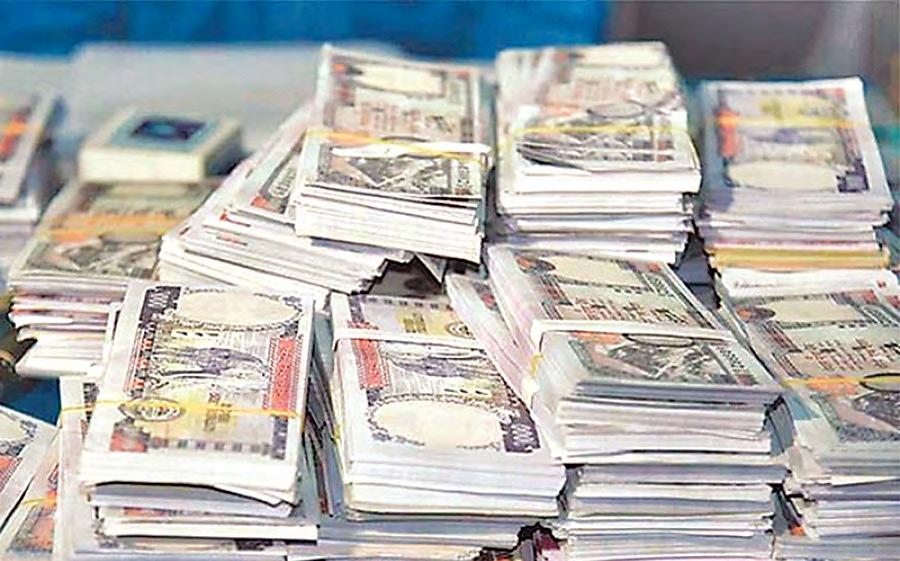
DOCKING NEPAL’S ECONOMIC ANALYSIS 20
2
Macroeconomic Overview
During the review period, the macroeconomic indicators indicated a rise in the cost of goods and services, which was reflected in an increase in inflation, with further increments anticipated over the next three months. In addition, while foreign aid commitments to Nepal increased, net foreign direct investments decreased by more than 90%, indicating a mismatch between actual investments received by the country and commitments made. In addition to a widening trade deficit and a negative balance of payments, the gross foreign exchange reserves were seen to be shrinking. The high government expenditures relative to revenues are also indicative of the country's dire situation. Similarly, the review period highlighted the mid-term review of the budget for the current FY 2022/23, which lowered the revenue and expenditure targets from the previously stated amounts due to political instability, policy inefficiencies, and project extensions, among other factors. In this situation, contractionary monetary policy has been continued by the central bank for the upcoming months; however, enhanced domestic production, domestic demand, and good governance are urgently required to reach the estimated growth target of 8% by the end of FY 2022/23.
Gross Domestic Product (GDP)
According to the ‘Current Macroeconomic and Financial Situation’ released by the central bank of Nepal, Nepal Rastra Bank (NRB), on 16 August 2022, the Gross Domestic Product (GDP) at current prices stood at NPR 4.85 trillion (USD 36.93 billion) in the twelfth month of FY 2021/22 in comparison to NPR 4.27 trillion (USD 32.51 billion) in the corresponding period of
FY 2020/21.98 This indicates an encouraging 13.42% increase despite bleak macroeconomic indicators in the FY. In addition to this, NRB released the national quarterly GDP by economic activities (at the basic price of FY 2010/11) for its first quarter (mid-July to midOctober 2022)99 in January 2023. The report gives insights into the seasonally adjusted and unadjusted growth rate of national quarterly GDP by
*Annual data of FY 2021/22 ending mid-July 2022
economic activities such as agriculture, manufacturing, accommodation and food service, mining, construction, and others. Figure 1 below shows the trend of the growth rate over the last decade.
NEFPORT ISSUE 52 – MARCH 2023 21 FACTSHEET97 Particulars Amount/ Percentage GDP at current prices* NPR 4.85 trillion Year-on-year CPI 7.26% Food and beverage CPI 5.62% Non-food and service 8.57% Net Foreign Direct Investment NPR 2.55 billion Remittance inflows NPR 585.07 billion Gross foreign exchange reserves NPR 1.33 trillion Total Domestic Debt NPR 964.18 million Total External Debt NPR 1.02 trillion Government expenditure NPR 576.35 billion Government revenue NPR 458.99 billion Total exports NPR 80.81 billion Total imports NPR 792.67 billion Total trade balance (NPR 711.86 billion) Current Account (NPR 29.5 billion) Balance of Payment NPR 97.09 billion
Seasonally adjusted data allows for more meaningful comparisons of economic conditions across different industries in various periods than unadjusted data. As per the figure above, the seasonally adjusted growth rate was significantly high in FY 2020/21 owing to an increase in wholesale and retail trade (93.08%), accommodation and food service (88.41%), and construction (33.03%), whereas agriculture and manufacturing grew by only 3.97% and 16.40% respectively.100 After FY 2020/21,
there has been a significant decrease in the growth rate in FY 2022/23 due to a reduction in economic activities related to manufacturing (-20/30%), construction (-18.02%), and (-6.65%) among many others.101
The reduction in the earlier increasing economic activities was majorly due to a rise in inflation, election-induced spending, and surging political as well as geopolitical pressures. It is also in strong contrast to this FY’s budget objective of making Nepal self-reliant by
prioritizing agriculture, industrial development, hydroelectricity, and transmission line expansion, and boosting foreign investment and tourism.
In light of this, the government of Nepal should place its immediate focus on targeting the most affected economic activities mentioned above to restore the path to steady growth and achieve the World Bankforecasted GDP growth rate of 5.8% in FY 2022, 5.1% in 2023 and 4.1% in 2024.102
DOCKING NEPAL’S ECONOMIC ANALYSIS 22
Source: Current Macroeconomic and Financial Situation of Nepal (ending mid-Jan 2023)
Source: Current Macroeconomic and Financial Situation of Nepal (ending mid-Jan 2023)
Figure 2. Seasonally adjusted and unadjusted growth rate of national quarterly GDP by economic activities (at basic prices of FY 2010/11) in percentage
Figure 3. Year-onyear CPI as of midJanuary of the last six FYs (in %)
4.00 4.58 6.82 3.56 5.65 7.26 0.00 1.00 2.00 3.00 4.00 5.00 6.00 7.00 8.00 2017/18 2018/19 2019/20 2020/21 2021/22 2022/23 Y-O-Y CPI (IN PERCENTAGE) UNTIL MID-JAN OF FISCAL YEAR 3.71 1.31 2.12 -0.86 -1.35 1.18 2.27 1.48 -1.55 18.55 6.78 -1.21 3.1 7.5 0.7 9.6 -7.4 12.9 7.4 10.4 2.7 0.9 3.0 0.8 2011/12 2012/13 2013/14 2014/15 2015/16 2016/17 2017/18 2018/19 2019/20 2020/21 2021/22 2022/23 (IN PERCENTAGE) FISCAL YEAR Seasonally Adjusted Seasonally Unadjusted
Inflation
The average inflation rate is measured by Consumer Price Inflation (CPI). As per the data released by the NRB, the yearon-year CPI stood at 7.26% in the sixth month of the current FY 2022/23 ending mid-January 2023 compared to 5.62% in the corresponding period of the previous FY 2021/22.103 While there has been a notable 29.18% decrease in the inflation rate, it is worth noting that inflation has increased by multi-folds since the past FYs as shown in Figure 2 below.
During the last quarter of FY 2021/22 and the second quarter of FY 2022/23, the political
parties had injected billions of rupees into the economy and spent excessively on marketing campaigns to woo and lure voters for the local and general elections conducted on 13 May 2022 and 20 November 2022 respectively. This had led to an increase in inflation majorly, among many other reasons.104 With the effects of the election cooling down in this review period, inflation has shrunk to 7.26%. If this trend continues, the government may be successful in achieving its inflation target of 7% laid out in the budget statement of the current FY.
However, contrary to this anticipation, the Inflation Expectations Survey conducted
by NRB among 2010 respondents from 60 market areas through field interviews, and published on February 15, 2023, revealed that 84.6% of individuals expect inflation to increase in the coming three months.105
Consumption of Goods and Services
The Consumer Price Index is a measurement to calculate the weighted average price of a basket of consumer goods and services.106 The basket of goods refers to a fixed set of consumer products and services whose prices are evaluated regularly.107 Table 1 shows the pattern of consumption over a series of two consecutive periods.
The changes in the consumer price index during the review period have been attributed to the rise in food and beverage inflation from 4.92% in 2021/22 to 5.62% in 2022/23. Within food and beverage, the price of restaurant and hotel, tobacco, milk products and eggs, cereal grains and products, and alcoholic drinks sub-groups rose 15.56%, 11.81%, 9.70%, 9.56%, and 8.84% respectively on a year-onyear basis.
Likewise, the review period
also witnessed an increase in non-food and service inflation, represented by a rise from 6.23% in 2021/22 to a significant 8.57% in 2022/23. Under this, the prices of transportation, health, recreating & culture, miscellaneous goods & services, and furnishing & household equipment rose by 16.43%, 11.22%, 8.76%, 8.68%, and 8.33% respectively on a year-onyear basis.108
While the limited domestic production capacity of Nepal, fueled by high petroleum prices,
high cost of doing business, and high-interest rates of banks majorly have led to an increase in consumer prices109, there are several other inconsistencies as well. For instance, there are also notable cases of policy inefficiencies in the food market of the country. For instance, although the National Dairy Development Act and Policy allows a hike in the market prices of milk once every two years, the Ministry of Agriculture and Livestock Department (MoALD) has proposed the National Dairy
NEFPORT ISSUE 52 – MARCH 2023 23
Source: Current Macroeconomic and Financial Situation of Nepal (ending mid-Jan 2023)
Headings Nov/Dec 2021 Dec/Jan 2021/22 Nov/Dec 2022 Dec/Jan 2022/23 Consumer Price Inflation 3.56 5.65 7.38 7.26 Food and beverage 4.27 4.92 5.85 5.62 Non-food and service 2.99 6.23 8.59 8.87
Table 3. Food and Non-food Consumer Price Index over two consecutive periods (in percentage)
Development Board increase the prices of milk by NPR 14 (USD 0.106) per liter from NPR 10 (USD 0.076) per liter.110 As a result, the prices are set to increase from March 2023. Due to some of these reasons, consumer prices for goods and services have risen in the review period.
Mid-term Review of Budget for Current FY 2022/23
The Ministry of Finance (MoF) released the budget for the
current FY 2022/23 amounting to NPR 1.793 trillion (USD 13.65 billion) on May 29, 2022.111 The budget targeted achieving economic growth of 8% by doubling exports and reducing imports by 20%. Likewise, it also aimed at curbing inflation to 7% while also generating meaningful implementation by enhancing domestic production in the economy.
In this regard, the mid-term budget review of the current FY 2022/23 released by the MoF
on February 15, 2023, revealed that the Ministry has only spent 32.13% of the total budget, i.e., NPR 506.78 billion (USD 3.85 billion), until six months of the FY (mid-January 2023).112 The table below shows a breakdown of the amounts envisaged in the budget initially and the spending till the six months.
DOCKING NEPAL’S ECONOMIC ANALYSIS 24
Particulars Targets (in NPR billion) Spending till six months (mid-Jan) (in NPR billion) Percentage change in comparison to the target (in %) FY 2021/22 FY 2022/23 FY 2021/22 FY 2022/23 FY 2021/22 FY 2022/23 Recurrent expenditure 1065.29 1183.23 4065.47 4551.27 38.16% 38.46% Capital expenditure 378.09 380.38 507.59 534.55 13.43% 14.05% Financing 189.43 230.21 494.74 677.65 26.12% 29.44% Total budget 1632.82 1793.83 5067.82 5763.47 31.04% 32.13%
Table 4. Comparison of budget from targets till mid-term spending
Source: Mid-term review of budget FY 2022/23, Ministry of Finance
Figure 4. Comparison of budget from targets till midterm spending
38.16% 38.46% 13.43% 14.05% 26.12% 29.44% 31.04% 32.13% FY 2021/22 FY 2022/23 PERCENTAGE SPENDING TILL SIX MONTHS OF FY (OUT OF TOTAL BUDGET ALLOCATED) SIX MONTHS OF FY Recurrent expenditure Capital expenditure Financing Total budget
Source: Mid-term review of budget FY 2022/23, Ministry of Finance
Citing reasons that the new government formed after elections were supposed to mobilize more resources to meet people’s desire for development
and economic growth but have been unable to do so, Finance Minister Bishnu Poudel announced that the MoF will reduce the budget size by 13.59%
to stand at NPR 1.549 trillion (USD 11.79 billion).113 It has been illustrated in Table 3.
In addition, the revenue collection target envisaged in the budget has also been revised and reduced to NPR 1.244 trillion (USD 9.472 billion) from earlier NPR 1.403 trillion (USD 10.63 billion).114 Further, although the government did not revise the economic growth rate of 8%, Finance Minister acknowledged that the growth target seems unachievable. Since this poses a grave concern regarding the sustainability of economic growth and targets set by the government, there is a need for115
• Reprioritizing expenses by maintaining frugality in current expenses,
• Suspending (whole or in parts) projects or programs where standards, procedures, and guidelines as well as operating methods have not been approved so far, and
• Restricting the implementation (fully or partially) of projects or programs where standards, procedures, and guidelines
as well as operating methods have not yet been enacted.
Finance Status Investments
In the review period, the net Foreign Direct Investment (FDI) reached NPR 79.6 million (USD 0.606 million) in the midmonth ending January 2023 in FY 2022/23 from NPR 11.34 billion (USD 86.34 million) in the corresponding period of
NEFPORT ISSUE 52 – MARCH 2023 25
Table 5. Revised estimates of the budget for the current FY 2022/23
Source: Mid-term review of budget FY 2022/23, Ministry of Finance
Figure 5. Net foreign direct investments in Nepal until midJan for seven consecutive FYs (in NPR million)
Source: Current Macroeconomic and Financial Situation of Nepal (ending mid-Jan 2023)
Particulars
Percentage change Initial target Revised target Recurrent expenditure 1183.23 1021.92 -13.63% Capital expenditure 380.38 313.5 -17.58% Financing 230.21 214.21 -6.95% Total budget 1793.83 1549.99 -13.59%
(In NPR billion)
7,393.1 14,334.9 4,358.9 12,203.8 7,659.2 11,344.2 749.4 2016/17 2017/18 2018/19 2019/20 2020/21 2021/22 2022/23 NET
UNTIL MID-JAN OF FY
FDI (IN NPR MILLION)
the previous FY 2021/22.116 This indicates a decrease of 93.4% compared to an increase of 48.1% respectively. Figure 3 depicts the change in net FDI in Nepal until mid-Jan of seven consecutive FYs.
With Nepal’s graduation from the Least Developed Country (LDC) category to a developing country by 2026 as per the decision of the United Nations General Assembly (UNGA) in November 2021, the country must formulate a transition strategy to ensure that the graduation is smooth and sustainable, and the remaining criteria of the three criteria of graduation (i.e., achieving per capita income threshold of USD 1,222 (NPR 160,484) from its
current USD 1,027 (NPR 134,875).117 For this, experts state that FDI plays a crucial role in fostering growth, level of domestic wages, distribution of income, and many more.118 However, the state of the net FDI that has been depicted in Figure 3 looks bleak due to a significant decrease in investment.
Some of the possible reasons behind such a significant decrease could be the long gestation period between actual FDIs and approvals, lag in implementing encouraging policies (such as lowering the minimum threshold for FDI took five months for implementation), and others. Hence, to tackle this, the Government of Nepal should
place its immediate focus on decreasing the gap between actual FDIs and approved FDIs, shortening the gestation period of approvals and actual investments, and implementing more investor-friendly FDI policies.
FOREIGN AID
Bilateral and Multilateral Aid Aid Disbursement from Donor Agencies
During the review period, Nepal received aid from a multitude of donor agencies such as the U.S. Agency for International Development (USAID), the United Nations Development Programme (UNDP), Norway,
Source: Ministry of Finance, 2023
German Development Cooperation (GIZ), and others.119
While USAID remains the largest donor agency for Nepal, there seems to be no report of aid disbursement from the Swiss
Agency for Development and Cooperation (SDC) in this review period, which was the secondlargest donor accounting for 14% in the last review period.120 As per the Ministry of Finance, the
breakdown of the disbursements of the donor agency support has been presented in the chart below:
DOCKING NEPAL’S ECONOMIC ANALYSIS 26
Figure 6. Aid disbursement of donor agencies from December 1, 2022, to February 28, 2023 (in %)
23.40% 23.30% 21.70% 16.30% 9.60% 5.70%
Others USAID Norway WVI UNDP GIZ
European Union to Provide Humanitarian Funding Assistance
The European Union (EU) provided approximately NPR 27 million (USD 0.205 million) as humanitarian assistance to Nepal.121 The funding by the EU targeted 11,000 families in the Sudurpashchim Province which faced the most damage to their houses as a result of the earthquake that occurred in November. The amount is anticipated to be used in the provision of shelter materials (tarpaulins, blankets, and mattresses), and the construction of latrines as well as water supply facilities. In addition, the affected families will also be provided with cash grants to cope with the damages and meet their basic needs. The funding comes as a part of the larger contribution by the EU under ‘The Disaster Response Emergency Fund (DREF)’, of the International Federation of Red Cross and Red Crescent Societies (IFRC).122
South Korea to Increase its Aid to Nepal
With the bilateral relations between Nepal and South Korea approaching its golden jubilee in the coming year 2024, the Government of South Korea is keen on increasing its development assistance to Nepal. From FY 2016/17 to FY 2020/21, South Korea disbursed USD 38 million (NPR 4.990 billion) to Nepal.123 An increment in this aid provides more areas of opportunities for Nepal in five specific sectors in which South Korea is particularly
interested, namely, education, health, planning and statistics, agriculture, and earthquake reconstruction. In addition, South Korea also aims to explore further areas of improving the bilateral relations such as through policy engagement, specific events, increasing migrant workers to South Korea, technology transfer, and others.124
UNDP Partners with Chinese NGO to Implement Programs in Nepal
For the first time, the United Nations Development Programme (UNDP) has partnered with a Chinese NGO, named China Foundation for Rural Development (CFRD), to implement a Chinese-funded program in Nepal.125 CFRD is affiliated with the Social Welfare Council in Nepal. The program titled ‘Support for Schools and Communities in Remote Areas for Pandemic Prevention and Green Recovery’ is set to be implemented in Madhesh Province in 2023. The objective is to improve the quality of education in the province.126
The program will receive funding from the Global Development and South-South Cooperation Fund Project, established under China’s Global Development Initiative (GDI) Programme in September 2021. Likewise, the UNDP, having been selected as a partner, will receive around USD 1.5 million (NPR 196.994 million) to support the implementation of the program, while the CFRD will make certain additional contributions depending on the total funding.127
PROJECT/PROGRAMSPECIFIC AID
International Monetary Fund (IMF) to Provide Second Tranche of Extended Credit Facility (ECF)
An Extended Credit Facility (ECF) is a facility provided as financial assistance to countries that are facing a protracted balance of payments to assist them in achieving a sustainable macroeconomic position.128 In this regard, the International Monetary Fund (IMF) approved the ECF arrangement of USD 395.9 million (NPR 51.993 billion) for Nepal, with the first or the immediate disbursement amounting to USD 110 million (NPR 14.446 billion) in January 2022.129 The objective of the first installment was to help mitigate the effects of COVID-19 on health and major economic activities aimed at vulnerable groups, preserve macroeconomic and financial stability, and support a reform agenda leading to sustained growth and poverty reduction. Some of the key policy actions for the Government of Nepal (GoN) were to increase revenues, public spending, financial sector regulation, fiscal transparency, and enhance governance while reducing corruption.
Following this, the second installment of USD 52 million (NPR 6.829 billion) was scheduled to be disbursed in May 2022, but it was delayed due to Nepal's failure to meet its first tranche obligations in full.130 As a result, a staff-level agreement was reached between the GoN and the IMF, resulting
NEFPORT ISSUE 52 – MARCH 2023 27
in several policies and reforms that need to be completed for Nepal to receive the second tranche of ECF. It has been agreed that Nepal will receive the amount in February 2023 after approval from the Executive Board of IMF. Among the policies and reforms envisioned for this installment are the formulation of a comprehensive revenue mobilization strategy, the improvement of public investment spending, the advancement of reforms on banking regulations and assets, and the strengthening of NRB governance.131
Asian Development Bank (ADB) to Support Rural Roads Improvement Program
The Asian Development Bank (ADB) will provide foreign assistance, in the form of loans, of approximately NPR 1.19 billion (USD 9.061 million) for the Rural Roads Improvement program in Nepal.132 As per the half-yearly budget review of the current FY 2022/23, the loan by ADB constitutes a share of around 4.49% out of the total external loans (NPR 26.46 billion, i.e. USD 201.479 million) until January 14, 2023.133 In addition to this, the GoN has also urged other donor agencies to support rural development endeavors. For instance, the European Union (EU) has been urged to provide around NPR 15.06 million (USD 0.146 million) in grants to support agriculture and rural development projects.134
World Bank to Provide Aid for Water Sector Governance and Infrastructure Support Project
The World Bank and the Government of Nepal (GoN) signed an agreement amounting to USD 100 million (NPR 13.132 billion) for the water sector governance and infrastructure support project in July 2022. It was officially launched on February 10, 2023, wherein USD 80 million is financed by the World Bank while the rest USD 20 million (NPR 2.626 billion) is from the government counterpart from Nepal.135 The major objective of this project is to help enhance the delivery of water and sanitation services, promote integrated water resources management, assist municipalities in project planning and implementation, and strengthen the sector governance capacity of all three tiers of the government. It also aims to promote green, resilient, and inclusive water supply and sanitation services to more than 400,000 people in addition to creating job opportunities and receiving skills training for women.
European Union Extends Support for Food Security
The Agriculture Development Strategy (ADS) stands as the national strategy of Nepal for the agriculture sector for the period of 2015 to 2030.136 It includes five dimensions, namely, food and nutrition security, poverty reduction, competitiveness, the higher and more equitable income of rural households, and strengthened farmers’ rights. In this regard, the European Union (EU) has been an active partner of Nepal to support its food security agenda as laid out in the ADS. It has contributed to the
establishment of the Nepal Food Security Monitoring and Analysis System (NeKSAP) and currently stands as the only development partner that is directly engaged in supporting the GoN’s MultiSector Nutrition Plan.137 As a result of this support from the EU, Nepal has been successful in adopting a multi-sectoral approach to tackle malnutrition and even establishing the country’s first Human Milk Bank.138 Overall, the support provided by the EU has helped strengthen food security in Nepal and move ahead in achieving other dimensions of the ADS.
USAID to Provide Support to Advance Democratic Progress in Nepal
According to the U.S. Agency for International Development (USAID) Administrator, Samatha Power, USAID is committed to supporting Nepal to advance its democratic progress and will provide funds up to USD 58.5 million (NPR 7.682 billion) (subject to availability of funds).139 Samatha vouched that Nepal had completed its second federal elections in 2022 and has also improved in its status of inclusion of women as well as marginalized communities. Owing to this reason, USAID strongly believes that investments can help Nepal further cement its democratic gains and is willing to help the country in achieving prosperity. From the USD 58.5 million (NPR 7.682 billion), USD 20 million (NPR 2.626 billion) is segregated for strengthening inclusive democracy by supporting provincial and local governments; USD 18.5 million (NPR 2.429
DOCKING NEPAL’S ECONOMIC ANALYSIS 28
billion) (approximately) is targeted for supporting civil society and media led by and for women, youth and marginalized communities; and the rest will be spent towards bolstering rule of law and countering human trafficking.140
Japan to Support Construction of New Turmeric Processing Center in Pyuthan
The Government of Japan has provided financial support to the Pyuthan district of Nepal, amounting to USD 10 million (NPR 1.313 billion), for the construction of a new turmeric processing center and the provision of agricultural equipment.141 The Ambassador of Japan to Nepal signed the agreement with the President of the Volunteer Nepal National Group under ‘Grant Assistance for Grassroots Human Security Projects’ rolled by the Government of Japan.142 The financial support will be useful in increasing the production of turmeric (domestic production) as opposed to the current state where turmeric is imported, resulting in local turmeric farmers
losing out on the opportunity of gaining profit. Hence, the financial support is expected to help farmers in commercializing turmeric and generate income.
GRANTS AND CONCESSIONAL LOANS
Asian Development Bank (ADB) to Provide Concessional Loan and Grant to Nepal
The Government of Nepal (GoN) and the Asian Development Bank (ADB) signed an agreement for a concessional loan and grant on December 27, 2023.143 The concessional amount amounts to USD 200 million (NPR 26.265 billion) to support the first five years of the School Education Sector Plan (2022-2030). The loan is expected to be used in the education sector to enhance learning provisions for basic and secondary schools, strengthen teaching and learning skills in schools, accelerate recovery from learning losses caused by the pandemic, and improve the capacity of local governments in
education planning, monitoring, and reporting.144
Likewise, the grant, amounting to USD 12 million (NPR 1.575 billion), intends to strengthen systems to protect and uplift women's projects. The projects which the grant amount will cover are targeted toward survivors of gender-based violence (GBV) across Madhesh, Lumbini, and Sudurpashchim Provinces by establishing longterm rehabilitation centers, development of survivor-friendly facilities and others within the selected districts of the provinces.145
Increasing Internal and External Loans for the Government of Nepal
According to the ‘Current Macroeconomic and Financial Situation’ covering six months (ending mid-January) of the FY 2022/23, the share of foreign grants has been decreasing in the country and stands at NPR 34.5 billion (USD 262.699 million) currently. Figure 6 shows the trend of the last three FYs below.
NEFPORT ISSUE 52 – MARCH 2023 29
Figure 7. Foreign grants and loans for six months of the last three FYs (in NPR billion)
9.9 9.2 3.6 50.8 25.9 34.5 2020/21 2021/22R 2022/23P
SIX MONTHS OF FY
Source: Current Macroeconomic and Financial Situation of Nepal (ending mid-Jan 2023)
(IN NPR BILLION)
Foreign Grants Foreign Loans
As the country prepares to graduate to a developing country status by 2026, it is anticipated that the share of foreign grants, which has been one of the major sources of revenue for Nepal, will further decrease. On the contrary, the share of foreign loans was anticipated to increase in Nepal’s foreign aid portfolio. However, the share of foreign loans has also been decreasing along with grants.
One of the major reasons behind this is the country’s lack of reliable targets, poor spending patterns, low utilization, and delay in seeking reimbursements.146 Moreover, the inability of the government to spend on capital expenditure also affects its status of receiving foreign loans and grants, as evidenced by only 14.05% of capital spending
performed till six months of the current FY 2022/23.147 Likewise, oftentimes, the donor agencies also take a longer-thananticipated time to complete the approval process for the funded projects, hardly abide by the procurement process, and revert after a long time on the study reports submitted to them before reimbursing expenses.148
REMITTANCE
Remittance inflows and Migrant workers
Increase in the Inflow of Remittances by 24.3%, Amounting to NPR 585.08 billion
The inflow of remittances to Nepal increased by 24.3% to reach NPR 585.08 billion
(USD 4.455 billion) in the first six months of FY 2022/23 compared to a decrease of 5.0% in the same period previous FY 2021/22.149 The increase in remittances is significant to the amount sent home by migrant workers as well as the gradual revival of the country’s tourism sector. This has the potential to ease the pressure of depleting foreign exchange reserves as well. Moreover, it has been stated that about 2% of the remittance inflows to Nepal are spent on capital formation150, indicating the potential that the remittance income holds for Nepal at this stage where there has been substandard capital spending. Figure 8 depicts the trend of remittance inflows to Nepal until six months (ending mid-January) of the last seven FYs.
billion)
Source: Current Macroeconomic and Financial Situation of Nepal (ending mid-Jan 2023)
The increase in the daily limit of remittance (as stated in the last review period), provisions for opening foreign currency saving accounts, strong market support policies, increase in
migrant workers, and others have majorly been attributed as reasons behind a strong increase in remittances in this review period. The remittance inflow in this review period has
surpassed the amount that was received before COVID-19 in FY 2018/19 by 31.9%, resulting in an encouraging figure that holds the potential to revive the country’s economy.151 This also aligns with
DOCKING NEPAL’S ECONOMIC ANALYSIS 30
Figure 8. Remittance inflows to Nepal until six months (ending mid-Jan) of the last seven consecutive FYs (in NPR
342.2 340.5 443.4 446.0 495.5 470.7 585.1 5.7 -0.5 30.2 0.6 11.1 -5.0 24.3 -10.0 -5.0 0.0 5.0 10.0 15.0 20.0 25.0 30.0 35.0 0.0 100.0 200.0 300.0 400.0 500.0 600.0 2016/17 2017/18 2018/19 2019/20 2020/21 2021/22 2022/23 % CHANGE Y-O-Y REMITTANCE INFLOWS (IN NPR BILLION) SIX MONTHS OF FY Remittance % Change Y-O-Y
the central bank’s claims that the country’s economy has been in the recovery phase in this review period, which holds extreme significance for the development of other sectors of the economy as well.
It is, now, important for the growth rate of the remittance flowing into Nepal to be resilient as the surging prices due to inflation can affect migrants’ real income. Moreover, multilateral funding agencies also state that the cost of sending USD 200 (NPR 26,265.8) across the international border to countries in the LDC category such as Nepal remains as high as 6% (average) in the
second quarter (mid-October 2022 to mid-January 2023) of the current FY 2022/23.152
Increase in the Number of Migrant Workers Seeking Labor Approval
The number of Nepali workers, including institutional and individual (new and legalized) workers, taking approval for foreign employment stood at 275,643 in the first six months of FY 2022/23 (ending midJan 2023).153 The increase signifies a whopping 64.6% jump in the number of workers seeking employment abroad as most countries have relaxed
lockdowns and COVID-19 restrictions, extending bilateral relations, encouraging formal labor processes, and opening employment opportunities.
Likewise, the number of Nepali workers seeking renewed entry approvals increased only by 9.5% to reach 142,548 in mid-Jan 2023, against an increase of 298.1% in the previous corresponding period.154 Figure 8 shows the data on the same.
Figure
of
within the first six months of the last six FYs (ending mid-January)
DESTINATION COUNTRIES
Malaysia, UAE, and Qatar are Among the Top Destination Countries
For decades, the major labor destinations for Nepali migrant
workers have been the Gulf Cooperation Council (GCC) countries. It is reported that one in every four Nepalis has been leaving for Qatar since 2010.155 In light of this, as per the six months of data ending midJan 2023, an increasing number
of Nepali workers sought labor approvals for Malaysia, United Arab Emirates (UAE), and Qatar, among many others.
NEFPORT ISSUE 52 – MARCH 2023 31
9. Number
labor approvals
Source: Department of Foreign Employment
186053 116745 137400 15049 167513 275643 127024 132788 133473 32706 130212 142548 2017/18 2018/19 2019/20 2020/21 2021/22 2022/23 NUMBER OF LABOR APPROVALS SIX MONTHS OF FY Institutional and Individual (New) Renew entry
United Kingdom Invites Migrant Workers for Horticulture Sector
The United Kingdom (UK) Government initiated a pilot program intending to provide temporary visas for seasonal work to migrant workers in the country’s horticulture sector from 2019 to 2021 as per the Nepal Labor Migration report 2022 published by the Ministry of Labor.156 Later, a seasonal work visa scheme was officially introduced in 2022, allowing entry for migrant workers into the UK for a maximum of six months. The UK’s Home Office immigration statistics even reported that 2,072 Nepali migrant workers had received the seasonal work visa in the
first half of 2022 in comparison to only 456 in the corresponding period of 2021.157 The scheme has been extended till 2024 and is a welcome policy for laborers who move in search of better employment opportunities.
However, the farms in the UK have decided against hiring Nepali workers owing to reasons such as exorbitant recruitment fees borne by workers to secure the jobs, high absconding rates, involvement of unlicensed agents, circulation of fake news, and unauthorized use of the Embassy’s letterhead as well as signature, leading to an unfavorable working condition in the horticulture sector.158 For instance, migrant workers have to
pay NPR 41,843 (USD 318.612) as an application fee apart from visa and two-way ticket fees.159
The reasons cited by the UK farms are serious and demand flaws in monitoring and implementation issues from Nepal. The GoN needs to educate the migrant workers about the procedure of securing visas, travel guidelines, farm guidelines, and many more related to the specific work. It is further required that such information be delivered in the local language for every migrant worker to fully grasp the information and prevent being cheated by illegal agencies.
DOCKING NEPAL’S ECONOMIC ANALYSIS 32 Country Six months (ending mid-Jan) 2020/21 2021/22R 2022/23P Institutional and Individual (New and legalized) 1 Malaysia 6 151 142425 2 UAE 4768 25537 24024 3 Qatar 1177 45293 24023 4 Saudi Arabia 4934 76906 22968 5 Kuwait 0 2807 18447 6 Romania 249 2159 6831 7 South Korea* 14 750 5715 8 Malta 46 516 4178 9 Japan 498 64 2214 10 Bahrain 432 3300 2124
Table 6. Top 10 labor destinations of Nepali migrant workers in the first three months of the last three FY
Source: *Including Governmentto-Government (G2G)
PLANS AND PROGRAMS TARGETED TOWARD MIGRANT WORKERS
Nepal Requests Malaysia to Apply ‘Zero-Cost’ Migration Policy
On February 3, 2023, the Labor Minister of Nepal, Dol Prasad Aryal, requested the Malaysian Home Minister, Saifuddin Nasution Ismail, to effective implementation of the ‘zero-cost’ migration policy for the safe and secure employment of migrant workers in Malaysia.160 The Labor Minister of Nepal opines that applying such a policy will help ensure that workers are prevented from paying exorbitant recruitment fees (during or even after the employment duration) and creating a secure employment condition. Likewise, Malaysia also assured that Nepal was one of the top priorities in its labor recruitment plans such as the Foreign Workers Employment Relaxation Plan and the Illegal and Undocumented Foreign Workers Recalibration Plan.161 The proposed policy would exempt Nepali workers from paying fees related to recruitment service charges, visa fees, medical check-ups, and security screening costs.162
Considering Malaysia was the top destination for Nepali migrant workers in this review period and has been on the top 10 labor destination list for decades, the GoN should prioritize ensuring the law is enforceable first, and then planning the monitoring and evaluation of the policy as well.
Basic Salary Hike to Benefit Nepali Migrant Workers in South Korea
According to the Director of the Employment Permit System (EPS) of the Korea Section under the Department of Foreign Employment in Nepal, Nepali migrant workers working in South Korea are paid differently based on their work and the company.163 The minimum basic salary, however, stood at around KRW 1.9 (NPR 189469.44, i.e. USD 1442,71) in 2022, which has been revised and increased by NPR 10,000 (USD 76.144) per month from January 2023.164 The salary increase applies across all industries and is expected to benefit the workers.
Recruitment Cost Survey to be Held
Recruitment Advisor, a global recruitment and employment review platform, works toward raising awareness of workers’ rights based on ILO General Principles and Operational Guidelines for Fair Recruitment and encouraging workers to share and learn about fair recruitment through Recruitment Advisor.165 As per the platform, Nepal has only been able to champion migrant worker-related reform agendas on paper and not in action. The average fees paid by workers remain around NPR 100,000 (USD 761.446) on average despite several policies and programs being launched targeting this sector. 166
In this regard and acknowledging
the constraints that remain in fair recruitment, the National Project Coordinator, Neha Choudhary, of Migrant Rights and Decent Work, International Labour Organization (ILO) confirmed that a recruitment cost survey is being designed to be conducted on a national level.167 Moreover, ILO is working with the Central Bureau of Statistics (CBS) to carry out the survey.168 The survey is expected to depict the true conditions that migrant workers face and to devise policy actions based on the results.
Nepali Migrant Workers Facing Dreadful Working Conditions in Qatar’s World Cup 2022 Projects
The last review period covered the dreadful working conditions that migrant workers faced during the Fédération Internationale de Football Association (FIFA) World Cup 2022 held from November 20 to December 18, 2022, in Qatar.169 Among the many migrant workers, Nepali migrant workers were also cheated as they were paid less, underwent verbal abuse, contract breaches, forced labor in unsafe working conditions, wage theft, discrimination, and many more.170 As a result, a report has revealed that a total of 1,641 Nepali migrant workers had died in Qatar.171
Since then, there has been no progress in any compensation to be provided to those affected. In other words, FIFA refused to commit to compensating the migrant workers and their families for abuses while preparing for and delivering the World Cup 2022.172 Although several human rights
NEFPORT ISSUE 52 – MARCH 2023 33
and migrant rights organizations have written an open letter to Gianni Infantino, the President of FIFA, requesting him to establish a fund amounting to USD 440 million (NPR 57.784 billion) (equal to the prize money for the World Cup), it has not resulted in any remedies.173
Increase in the Uptake of the Youth-Migrant Returnee
Workers’ Loan
The GoN disperses project loans for youth-returnee migrant workers. In the review period, the number of borrowers stood at 929 which is a decrease from 952 borrowers in mid-January 2023 (2.14% decrease). Likewise, the outstanding loan amount stood at NPR 496 million (USD 3.776 million) in mid-January
2023 which is a decrease of 21.46% from NPR 631.49 million (USD 4.808 million), indicating a positive signal for the government on the loans disbursed. The same data have been presented in Table 7.
Table 7. Project loan for youth-returnee migrant workers
Government Reserves
According to the Current Macroeconomic and Financial Situation ending mid-January 2023, the gross foreign exchange reserves stood at NPR 1.337 trillion (USD 10.180 billion). This depicts a 10% increase from NPR 1.215 trillion (USD 9.251 billion) in midJanuary 2022.174 Out of the total reserves, the reserves held by the central bank, NRB, increased 12% to NPR 1.183 trillion (USD 9.007 billion), whereas reserves held by banks and financial institutions (BFIs) decreased 3.4% to NPR 153.91 billion (USD 1.171 billion) in mid-January 2023.175
According to the central bank, existing foreign exchange reserves are sufficient to support merchandise and
services imports for 9.1 months and prospective merchandise imports for 10.4 months, which suggests an improving status from the last review period where the reserves were insufficient to fund imports of goods and services for even eight months.176 This shows that the reserves' ability to sustain imports is undergoing fluctuations. As a result, the central bank continued implementing the contractionary monetary policy to control the credit expansion which could increase importbased consumption and deplete foreign exchange reserves even further.177
Furthermore, studies and research being conducted in this arena suggest that while import costs are one of the major
reasons for this,178 the data on the available reserves is questionable since a large number of loans are still being disbursed by many BFIs and have undergone changes through the mid-term review of the budget. Nevertheless, although the level of decline is not as severe as it was during the 2015 earthquake, the situation at this moment necessitates policy interventions and scrutiny.
Overall, the reserves to GDP ratio stood at 27.6% in mid-January 2023 in comparison to 24% in the corresponding period of the previous fiscal year as shown in Table 8:
DOCKING NEPAL’S ECONOMIC ANALYSIS 34
Type of loan Number of Borrowers Outstanding Loan Amount (in NPR million) 2022 2023 2022 2023 Mid-Jan Mid-Jan Mid-Jan Mid-Jan Project Loan for Youth-Returnee Migrant Workers 952.0 929.0 631.5 496.0
Source: Current Macroeconomic and Financial Situation of Nepal (ending mid-Jan 2023)
The trend of the reserves of the last seven fiscal years has been depicted in Figure 10.
Government Debt
The total outstanding domestic debt accumulated by the GoN can be divided into treasury bills, development bonds, citizen saving bonds, foreign employment bonds, and others through Nepal Rastra Bank (NRB), commercial banks, development
banks, finance companies, and others. In total, the total domestic debt stands at NPR 964.2 billion (USD 7.341 billion) in mid-January 2023 in comparison to NPR 777.3 billion (USD 5.918 billion) in mid-January 2022.179 This indicates a surge of 24.03% in the government debt in a year, indicating the dismal economic
situation of the country due to political instability, poor governance, lack of capacity in the local and provincial governments, liquidity crunch, increasing trade imbalance, and depleting foreign exchange reserves. Table 7 shows the trend of domestic debt in the last three years.
NEFPORT ISSUE 52 – MARCH 2023 35
Figure 10. Gross Foreign Exchange Reserves of midJanuary of the last seven consecutive years (in NPR trillion)
Table 9. Domestic government debt of mid-January in the last three years (in NPR billion)
Table 8. Midmonths’ reserve to GDP ratio of the last three FY (in %)
Source: Current Macroeconomic and Financial Situation Update of Nepal (ending mid-Jan 2023)
Source: Current Macroeconomic and Financial Situation of Nepal (ending mid-Jan 2023)
2021 2022 2022 2023 Mid-Jul Mid-Jan Mid-Jul Mid-Jan Reserves/GDP(in%) 32.7 24.0 25.1 27.6
Source: Current Macroeconomic and Financial Situation Update of Nepal (ending mid-Jan 2023)
Particulars
Particulars mid-January 2020/21 2021/22 2022/23 Total Domestic Debt 664.212 777.320 964.185 a. Nepal Rastra Bank 63.869 78.833 130.404 b. Commercial Banks 544.486 618.606 727.496 c. Development Banks 32.401 52.975 71.530 d. Finance Companies 11.828 14.593 21.018 e. Others 11.626 12.311 13.735 1.089 1.067 1.058 1.096 1.494 1.166 1.337 2016/17 2017/18 2018/19 2019/20 2020/21 2021/22 2022/23 GROSS
MID-JAN OF FY
FOREIGN EXCHANGE RESERVES (IN NPR TRILLION)
Likewise, the total external debt reached NPR 1.027 trillion (USD 7.99 billion) (as of mid-July 2023), indicating an increase of 9.97% from the previous FY.180
Government Spending (Expenditure and Revenue)
According to the Financial Comptroller General Office (FCGO), the total government expenditure and revenue for six months of FY 2022/23 amounted to NPR 576.35 billion (USD 4.388 billion) and NPR 458.99 billion (USD 3.494 billion), respectively.181
The expenditure and revenue witnessed an increase from NPR 506.99 billion (USD 3.860 billion) and NPR 542.05 billion (USD 4.127 billion), respectively in comparison to the corresponding period of the previous FY.
The surge in the expenditure of 13.7% is lesser compared to the previous year’s 21.9%. Admittedly, the capital, recurrent and financial expenditures of the country have all surged at a decreasing rate by 12%, 5.2%, and 37%, respectively. While capital expenditure has increased notably, the major
decline has been under financial management, owing to the political instability and its effect on the local, provincial, and federal governments.
In addition to this, revenue generation has not been strong compared to last year’s 28.4% increase. Instead, it decreased by 15.3% during this review period. The tax collections weakened notably by 18% whereas the nontax revenue collection climbed by 11%.
DOCKING NEPAL’S ECONOMIC ANALYSIS 36
Particulars 2021/22 2022/23 Total expenditure 506.99 576.35 Recurrent expenditure 406.41 455.13 Capital expenditure 50.81 53.46 Financial Management 49.47 67.77 Total revenue 542.05 458.99 Tax revenue 493.99 405.27 Non-tax revenue 48.06 53.72
Table 10. Government Spending (expenditures and revenue) in the first three months of FY (in NPR billion) Source: Current Macroeconomic and Financial Situation of Nepal (ending mid-Jan 2023)
Financial
of
(ending mid-Jan
0.0 100.0 200.0 300.0 400.0 500.0 600.0 2016/17 2017/18 2018/19 2019/20 2020/21 2021/22 2022/23 GOVERNMENT SPENDING (IN NPR TRILLION) MID-JAN OF FY Expenditure Revenue Treasury Position/ Cash balance
Figure 11. Government spending (expenditures and revenue) as of midJanuary in the last seven FYs (in NPR billion) Source: Current
Macroeconomic and
Situation
Nepal
2023)
TRADE STATUS Foreign Trade Scenario
In terms of the foreign trade scenario, the total foreign trade deficit reached NPR 711.86
billion (USD 5.420 billion) during six months of FY 2022/23, indicating an increase in trade deficit by 19.2% against 46.6% in the previous year. The share of export and import in total trade is 9.3% and 90.7% in comparison
to 10.6% and 89.4%, respectively. This indicates a slight decrease in exports and an increase in imports. Figure 12 shows the trend of total foreign trade in the last three fiscal years.
Source: Current Macroeconomic and Financial Situation of Nepal (ending mid-Oct 2022)
Top Imports and Exports
According to the Current Macroeconomic and Financial Situation ending mid-January 2023 of FY 2022/23, the merchandise exports decreased by 32.0% to reach NPR 80.81 billion (USD 615.325 million) in comparison to an increase of 95.5% in the corresponding period of FY 2021/22.182 Elaborating on this, the exports to India and China decreased by
40.1% and 25.2%, respectively. Contrastingly, exports to other countries increased by 3.6%. With this, the ratio of exports to India, China, and other countries stands at 71.6, 0.4, and 28 respectively. Overall, the top five export commodities were palm oil (16.2%), soyabean oil (9.9%), woolen carpet (6.8%), polyester yarn and threads (6.5%), and jute goods (4.7%). Soyabean oil and palm oil are the top exported products to India whereas
woolen carpets and readymade garments are the top exported products to China.183
Likewise, according to the same report, the merchandise imports decreased by 20.7% to reach NPR 792.67 billion (USD 6.035 billion) against an increase of 51.1% in FY 2021/22.184 In the case of imports, the imports from India, China, and other countries decreased marginally by 19.4%, 24.6%, and 21.4% respectively.
Source: Current Macroeconomic and Financial Situation of Nepal (ending mid-Jan 2023)
NEFPORT ISSUE 52 – MARCH 2023 37
Figure 13. Total imports, exports, and trade balance during the first six months of the last seven FY (in NPR billion)
Figure 12. Total foreign trade during the first six months of the last three FY (in NPR billion)
722.04 1118.19 873.47 0.00 200.00 400.00 600.00 800.00 1000.00 1200.00 2020/21 2021/22 2022/23
SIX MONTHS OF FY
(428.33) (514.00) (678.53) (637.41) (600.45) (880.49) (711.86) (1,000.00) (900.00) (800.00) (700.00) (600.00) (500.00) (400.00) (300.00) (200.00) (100.00)2016/17 2017/18 2018/19 2019/20 2020/21 2021/22 2022/23 AMOUNT (IN NPR BILLION) MID-JAN OF FY
FOREIGN TRADE (IN NPR BILLION)
FIST
Foreign Trade
With this, India’s share in total imports reached 61.4% of the total imports in the review period, which is the highest, against 60.4% in the previous period. Overall, the top five imports were petroleum products (18,7%), machinery parts (4.5%), transport equipment and parts (4.1%), gold (3.7%), and crude soyabean oil (3.0%). Petroleum products and vehicle parts are the top imported products from India whereas telecommunication equipment and machinery parts are mostly imported from China.185
In the previous review periods, it was reported that the import
ban on luxury or non-essential products was imposed by the GoN.186 In this review period, the GoN lifted the import ban along with the removal of a provision that forced importers to deposit certain cash margins (up to 100%) to open letters of credit (LC) to import certain goods.187 The policies that have been adopted are aimed at boosting the economic state of Nepal and relaxing the trade balance.
Balance of Trade
Based on the Current Macroeconomic and Financial Situation of FY 2022/23, the total
trade balance deficit witnessed a 19.2% increase until midJanuary 2023 of FY 2022/22 in comparison to a decrease of 46.6% in the corresponding period of the previous fiscal year, suggesting a widening trade deficit. The total trade balance figure stands at a negative NPR 711.86 billion (USD 5.420 billion) owing to higher imports than exports. The trade balance for the last seven years is presented in Figure 14.
Balance of Payment
As of the six month’s data of FY 2022/23 (ending mid-January 2023), the current account remained at a deficit of NPR 29.469 billion (USD 224.391 million) compared to a deficit of NPR 352.158 billion (USD 2.681 billion) in the FY 2021/22.188 On
the contrary, the Balance of Payments (BoP) registered a surplus of NPR 97.095 billion (USD 739.326 million) in the review period, whereas there was a surplus of NPR 241.230 billion (USD 1.836 billion) in the same period of last year.189
The increase in remittances, nominal increase in exports,
curbing imports during the import ban, and increase in Foreign Direct Investment (FDI) have resulted in a surplus of BoP in the review period. The BoP was in deficit for the last four months. Figure 15 suggests that the BoP is in a weakening condition in comparison to the previous year despite a surplus.
DOCKING NEPAL’S ECONOMIC ANALYSIS 38
Figure 14. Total trade balance during midJan of the last seven years (in NPR billion)
Source: Current Macroeconomic and Financial Situation of Nepal (ending mid-Jan 2023)
(428.33) (514.00) (678.53) (637.41) (600.45) (880.49) (711.86) (1,000.00) (900.00) (800.00) (700.00) (600.00) (500.00) (400.00) (300.00) (200.00) (100.00)2016/17 2017/18 2018/19 2019/20 2020/21 2021/22 2022/23 AMOUNT (IN NPR BILLION) MID-JAN OF FY
Exchange Rate Fluctuations
Nepali currency visa-a-vis the USD depreciated 1.79% in mid-Jan 2023, against an appreciation of 0.95% in mid-Jan 2022.190 Amid such fluctuations with the USD, the devaluation of
the Nepali currency to the US dollar has caused the imports of the country to be expensive as the buying exchange rate per USD has reached NPR 129.83 (USD 0.988) in mid-Jan 2023 (a nominal increase from NPR 127.51 (USD 0.970) in mid-Jan 2022).
It has also played a significant role in exacerbating the inflation surge in the country. The figure below shows the exchange rate fluctuations that have occurred in the last six FY.
Gold/silver Updates
The import of gold increased from NPR 23.257 billion (USD 177.09 million) in mid-January
FY 2021/22 to NPR 29.193 billion (USD 222.289 million) in the
same period of FY 2022/23, indicating a surge in imports by 25.5%. Figure 17 below shows the growing trend of imports of gold. The share of gold imports in total imports is 3.7% which signifies its growing significance in the Nepali
market as it only accounted for 2.3% in the last review period.191 It also falls under the top 10 commodities that Nepal imports.
NEFPORT ISSUE 52 – MARCH 2023 39
Figure 15. Balance of payment trend of midJan over the last seven FY (in NPR billion)
Source: Current Macroeconomic and Financial Situation of Nepal (ending mid-Jan 2023)
Figure 16. Exchange rate fluctuations in mid-Jan (average) of the last six FYs
Source: Current Macroeconomic and Financial Situation of Nepal (ending mid-Jan 2023)
45.00 -6.66 -63.68 26.65 124.92 -241.23 97.10 2016/17 2017/18 2018/19 2019/20 2020/21 2021/22 2022/23 (IN NPR BILLION) MID-JAN OF FY 102.43 112.72 114.37 117.75 120.1 132.47 0 50 100 150 200 250 300 2017/18 2018/19 2019/20 2020/21 2021/22 2022/23 SELLING RATE (MID-JAN AVERAGE) MID-JAN AVERAGE OF FY
On the contrary, the import of silver, which fell under the top 10 commodities of Nepal’s imports as well, was not a major importing commodity in this review period. Yet, it stands as one of the most imported commodities from
China. Its import volume, however, decreased from NPR 2.02 billion (USD 15.381 million) to NPR 85 million (USD 0.647 million) in the same period, indicating a decline of 95.8%. Besides, silverware and pieces of jewelry also come
Outlook
under the top 15 commodities that Nepal exports and the exports for these decreased by 53.3% in mid-January 2023 against an increase of 101.2% in mid-January 2022.192
Macroeconomic indicators of a country are essential in analyzing the current and future trends of a country to evaluate its economic position.
In this regard, the review period revealed a dismal macroeconomic condition, with the majority of indicators, including trade balance and balance of payments, exhibiting a decline. This indicates that the import ban strategy implemented in previous review periods and extended to reach its revenue goal had a disastrous outcome. Owing to this reason, experts determined that the risks associated with the import ban strategy outweighed the benefits in this review period. Consequently, the government must take consistent effective policy actions, such as increasing taxes on foreign goods, conserving foreign exchange reserves, and fostering the domestic production of competitive goods by identifying pocket areas of competitiveness.
Similarly, for the first time since FY 1967/68, the government's revenue collection in the first half of the fiscal year experienced a decline. It is indicative of the political instability, the shifting of government priorities with changes in government, the government's weak strategy and implementation, and the populist bloated budget that was initially proposed for the current fiscal year 2022/23.
DOCKING NEPAL’S ECONOMIC ANALYSIS 40
Figure 17. Import trend of gold since last four FYs (in NPR billion)
Source: Current Macroeconomic and Financial Situation of Nepal (ending mid-Jan 2023)
8.0 12.2 23.3 29.2 0.0 5.0 10.0 15.0 20.0 25.0 30.0 35.0 2019/20 2020/21R 2021/22R 2022/23P IN NPR BILLION FIRST SIX MONTHS OF FY
In contrast, the increase in remittances to Nepal during the review period is significant for the nation. The demand for employment among Nepalese migrant workers will continue to rise with cases of inadequate employment opportunities in Nepal, improved bilateral relations with labor destinations, encouraging seasonal work policies introduced by labor destinations, and other factors. More such strategic planning coupled with investing in educating migrant workers on the efficient use and investment of remittance income, as well as acquainting them with fair recruitment procedures are required.
In light of the current state of affairs, the budgeted growth target of 8% appears unattainable. There is a need for the government to stimulate the economy by strategizing on sectoral growth, which will then propel overall economic growth.
NEFPORT ISSUE 52 – MARCH 2023 41
3 Sectoral Review
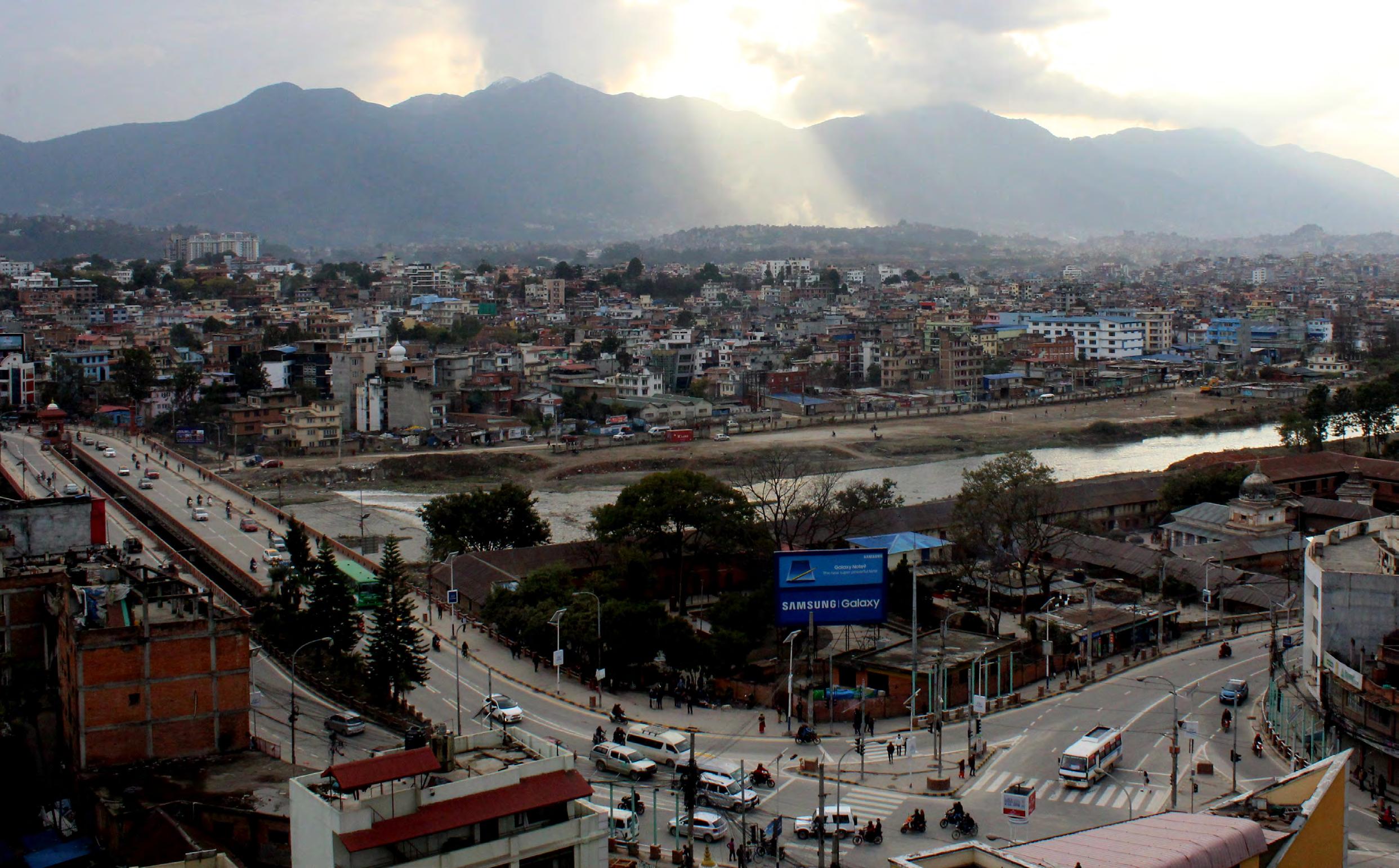
DOCKING NEPAL’S ECONOMIC ANALYSIS 42
Agriculture and Livestock
Nepal's agricultural sector has been a crucial contributor to the country's economy, with paddy being one of the primary crops. Nepal witnessed a 6.94% increase in paddy production in the current fiscal year. However, this quantity falls short of the country's annual demand for rice, and the recent shortage of chemical fertilizers has further hampered production. Amid these challenges, the Government of Nepal has implemented new food safety standards for various foods and nutritional ingredients to prevent contamination and adulteration. Meanwhile, the eight-month-long ban on wheat exports by the Indian government caused a shortage of refined flour and wheat flour in the Nepali market. Despite the ban being lifted, Nepali traders have been facing challenges in importing wheat flour in bulk. Regardless of all the hurdles, Nepal has managed to export various agricultural products, such as oranges, tea, and other products worth NPR 1 billion (USD 7.614 Million). The government has also taken steps to improve milk production by importing purebred cows from South Korea. These developments have significant implications for Nepal's food security and the agricultural sector's growth.
PRODUCTION UPDATES
Nepal Faces Deficit of Paddy
Production by 480,000 tons
Nepal has produced 5.48 million tons of paddy in the current FY 2022/23, an increase of 6.94% compared to 5.15 million tons produced in FY 2021/22.211 This quantity falls short by 200,000 tons when compared to 5.62 million tons produced in FY
2020/21.212 As per the Ministry of Agriculture and Livestock, Nepal requires 4 million tons of rice annually to feed its population. The milling of this year's paddy harvest is expected to yield approximately 3.52 million tons of rice, leaving a potential deficit of 480,000 tons.213 To address this deficit, the country has spent NPR 12.65 billion (USD 96.3 Million) on rice imports in the current FY. Even though the production of paddy has improved compared
NEFPORT ISSUE 52 – MARCH 2023 43
FACTSHEET Particulars Amount/ Percentage Agriculture sector's contribution to GDP 23.9%193 The growth rate for agriculture 2.3%194 GDP of the agriculture sector NPR 98.32 trillion195 Food and Beverage CPI (Six months of FY 2022/23) 5.62 %196 Price increase of ghee and oil 6.59%197 Price increase of milk products and eggs 9.70%198 Price increase of Pulses and Legumes 4.36%199 Price increase in tobacco products 11.81%200 Price increase of Cereal grains and their products 9.56%201 Outstanding credit outflow for FY 2022/23 NPR 402.69 Billion202 Top 4 agricultural commodities imports (in NPR) Based on Six Months’ Data Ending Mid-January Crude Soybean oil (23.84 billion)203 Rice/paddy (18.46 billion)204 Crude Palm oil (16.71 billion)205 Vegetables (9.6 billion)206 Top 4 agricultural commodities exports (in NPR) Based on Six Months’ Data Ending Mid-January Soybean Oil (13.08 billion)207 Palm Oil (8.0 billion)208 Cardamom (3.7 billion)209 Tea (2.5 billion)210
to the previous year, this year’s production is still not enough to feed the country’s population. The deficit in production is due to a constant shortage of chemical fertilizers214 in the plantation months i.e., June –August which is further escalated by several challenges, including declining per capita arable land, limited access to and use of new technologies, and inadequate input supply chains.
INPUT UPDATES
New Food Safety Standards Implemented
The Government of Nepal has approved new safety standards for various foods and nutritional ingredients to prevent food contamination and adulteration. The permissible limits for heavy metals in various foods have been revised as per international standards, and the government has set a maximum limit for nine types of heavy metals in food items. As per the new standards, the maximum limit for lead in fruits is 0.1 mg per kg, and for vegetables and cereals is 0.2 mg per kg. In 2019, lead exposure accounted for 900,000 deaths globally as per the Institute for Health Metrics and Evaluation.
Nepal’s Food Act 1967, states that if the food does not meet the stated standards, action will be taken against the manufacturer, which includes a fine of NPR 50,000 (USD 380.72) or imprisonment for up to 5 years, or both. The new standards require cereal-based infant food to have specific levels of nutrients and additives and a maximum count of bacteria per gram. As per the
new standards, the permissible moisture content in baby food should not exceed 8%, with fat content not exceeding 13% and protein content not less than 15%. Similarly, the packaging must meet strict standards. 215
MARKET UPDATES
Ban on Wheat Export by India Hampers the Flour Mills
The Indian Government’s eightmonth-long ban on wheat exports that was implemented in May 2022 was finally uplifted in December 2022. The ban resulted in the closure of 8085% of flour mills in Nepal, which depended on wheat imports for raw materials, creating a shortage of refined flour and wheat flour in the Nepali market. As per the Nepal Flour Mills Association, domestically produced wheat is sufficient to operate a flour mill for only five months, and producers are dependent on imported wheat for the remaining months.216 Before the ban, a 50-kg bag of refined flour used to cost NPR 3,200 (USD 24.36) to NPR 3,300 (USD 25.12), which jumped to NPR 4,800 (USD 36.54) to NPR 5,000 (USD 38.07) after the ban. Traders were forced to buy wheat from the black markets at 30-40% higher prices. After lifting the ban, the Foreign Trade General Directorate of India permitted to export of 50,000 tons of wheat to Nepal till March 31, 2023. 217
EXPORT AND IMPORT OF AGRO-COMMODITIES
Worth NPR 300 Million (USD 2.2 Million)
The production of oranges in the Parbat district saw a 25% increase in the current fiscal year 2022/23. Orange plantations in 830 hectares of land in the district produced 5,000 metric tons of orange. Out of this, 4,250 metric tons of orange were exported to other districts, generating an income of NPR 297 million (USD 2.261 Million). In contrast, the district only produced 4,000 metric tons of orange from 450 hectares of land in the last fiscal year 2021/22.218 Suitable weather patterns and the timely availability of supplements and fertilizers contributed to the increased production of oranges. After the orange zone was established in 2017 under the Prime Minister Modern Agriculture Program, the orange crop's catchment area in the district started growing. The district's orange production is concentrated in the Baglung Municipality, Bihun, Tityang, Bhakunde, Lekhani, Jaimini, Damek, and Sarkuwa pockets.
Tea Worth NPR 38 Million (USD 0.28 Million) Exported
Tea worth NPR 2.58 billion (USD 19.67 Million) has been exported from Nepal in the first seven months of FY 2022/23.219 Out of the total 28 million kilograms of tea produced in Nepal, annually, Jhapa produced the highest amount i.e., 18 million kilograms. The districts of Koshi Province produce 99% of Nepal’s total tea. The province houses 68 largescale tea industries and 150 small companies processing orthodox
DOCKING NEPAL’S ECONOMIC ANALYSIS 44
Parbat District Exports Oranges
tea.220 More than 70,000 people have got direct employment from tea production and over 15,000 small farmers are engaged in tea farming. Nepali Tea Quality from the Himalaya, a trademark of Nepali orthodox tea produced in the hilly region of Nepal, is issued by the government of Nepal. The trademark is expected to help Nepal brand and market its tea in the international market. The trademark serves as a defense mechanism to protect a brand from loss of reputation and has the potential to increase in value as an intangible asset.221
Lalbandi Exports Agricultural Products Worth NPR 1 billion (USD 7.6 Million)
The Agriculture Wholesale Bazaar Management Committee (AWBMC) in Sarlahi has exported agricultural products worth over NPR 1 billion (USD 7.6 Million) in the first seven months of the current fiscal year 2022/23. The agricultural products include tomato, eggplant, black-eyed bean, bottle gourd, bitter gourd, and cucumber. The products have been exported to places outside the district, including Sindhuli, Ramechhap, Kathmandu, Pokhara, Butwal, Bhairahawa, Narayangadh, Nepalgunj, Hetauda, Birgunj, Gaur, Janakpur, Siraha, Biratnagar and Ithari.222
Pure Breeds cow imported from South Korea
The Government of Nepal has distributed 100% purebred Holstein cows received from Heifer International Korea to farmers in Nepal. The cows were
not brought to replace the local Nepali cows, but to improve the cow breeds and foster the dairy industry. The Department of Animal Services is working to protect the local cows of Nepal. Only 20% of the 7.3 million cows in Nepal are of advanced breed, and these cows can produce 8-16 thousand liters of milk per lactate.223 According to estimates, a Holstein cow may produce 10,000 liters of milk yearly, compared to 800 liters from local varieties. In Nepal, the enhanced breeds produce 2,800 liters of milk, yearly. A Holstein cow typically produces milk for ten months before receiving a rest period of around two months before the birth of the subsequent calf. The main aim of this initiative is to modernize the dairy business by establishing a high-quality nucleus herd.224
Food and Beverage Prices (CPI and WPI)
The year-on-year Consumer Price Index (CPI) for Food and Beverage as of mid- January 2023 stood at 5.62%. The CPI for cereal grains and their products increased to 9.56%, alcoholic drinks to 8.84%, milk products, and eggs to 9.70%, and tobacco products to 11.81%.225 Whereas, the year-on-year wholesale price inflation increased to 9.82% as of mid- January 2023, from 8.08% in the previous year.226 The increase in the price of necessary commodities is due to the depreciation of the Nepali Rupee against the convertible currencies combined with low export and moderation in remittance growth for the Fiscal
year 2022/23.
LIVESTOCK UPDATES
The H5N1 Bird Flu Detected in Nepal
According to the Ministry of Agriculture and Livestock Development (MoALD), three locations in the Kathmandu Valley have been verified to have bird flu infections. On January 30, 2023, the Nepal Agricultural Research Council (NARC), based in Lalitpur, verified the first infection of A(H5N1), also known as bird flu or avian influenza virus. As part of the containment strategy, a limited number of birds were killed, and the farm's 4,500 hens and 2,255 eggs were destroyed. Since it was first discovered in poultry birds, the highly pathogenic H5N1 virus outbreak has spread to migratory birds as well as other mammals, raising the possibility of new versions spreading among people and allowing it to infect more species.227
GOVERNMENT PLANS UPDATES
Hupsekot Rural Municipality Provides Grants for Milk Production
The Hupsekot Rural Municipality has decided to provide a subsidy of NPR 5 (USD 0.038) per liter of milk to dairy farmers through cooperatives. In the last fiscal year 2021/22, a total subsidy of NPR 254,235 (USD 1935.86) was provided to framers. This scheme has been coined to make Hupsekot Rural Municipality self-reliant on milk production.
NEFPORT ISSUE 52 – MARCH 2023 45
The rural municipality has also been giving a subsidy of 50% to the farmers for the payment of insurance premiums under livestock Insurance. The rural municipality is taking constructive steps to make the municipality self-reliant in its production by encouraging farmers and helping them financially.228
IFAD Extends Loan for Sustainable Agriculture Growth
The Government of Nepal has received a loan and grant from the International Fund for Agricultural Development (IFAD) totaling USD 39 million (NPR 5121 Million) to support the “Improved Seeds for Farmers” Initiative. Through collaborations between small farmer organizations and the private sector, the program—a collaborative effort between the government of Nepal and
Outlook
IFAD—aims to promote improved seed and smallholder livestock production and distribution. The aim is to increase the incomes of 150,000 poor rural households in six districts: Rolpa, Rukum, Salyan, Pyuthan, Gulmi, and Arghakhanchi. With the implementation of this program, IFAD will have financed a total of 14 programs since 1978 with a total investment of USD 198.2 Million (NPR 26 Billion) in Nepal, benefiting 561,600 households. Poor women, indigenous peoples, and other vulnerable groups are expected to benefit from the program, with rural women making up more than half of all beneficiaries.229
Agriculture Census Reaches Final Stage
The Central Bureau of Statistics (CBS) is preparing to publish the
results of the seventh National Agriculture Census, which has reached the final stage. The census, which was conducted during the months of March to May in the fiscal year 2021/22 included all 753 local levels of the nation. A sample of 350,000 farmers representing 753 local levels was counted as part of data collection on agricultural operations carried out for institutional, commercial, and subsistence purposes. This census is expected to assess the situation of crops produced, irrigation, land use data, raw material use, and many livestock and fowls. The report will help carry out a study on the impact and contribution of agriculture to national production and formulate plans, monitor, and evaluation of agricultural produce at all three levels.230
Nepal's increased paddy production this year is promising, but the shortage of chemical fertilizers year after year, and limited access to new technologies have hampered the agricultural sector's growth. Moreover, while the demand for milk has been rising, production has been decreasing subsequently. The Government of Nepal has already taken steps like distributing pure-breed Holstein cows to Nepali farmers, to improvise and modernize the dairy industry of Nepal. Such initiatives to increase production would motivate farmers and help in the growth of the dairy industry.
It is important to address the challenges faced by the agricultural sector and continue investing in technological advancements and input supply chains to sustainably improve food production in Nepal. Priority should be given to investments in infrastructure such as irrigation, transportation, and storage facilities. Similarly, promoting modern farming techniques, providing access to credit and market information to farmers, and strengthening agricultural research and extension services must be also focused on.
DOCKING NEPAL’S ECONOMIC ANALYSIS 46
Energy and Environment
The total installed capacity of energy production in Nepal stood at 2,451 MW in the review period, up from 2,190 MW during the previous review period. Meanwhile, the peak demand dropped to 1,626 MW in the review period from 1747 MW during the previous review period. With the onset of the dry season, electricity output from run-of-river hydropower projects has drastically fallen; peak electricity generation as of mid-February 2023 was only 1,140 MW. Electricity is being imported from India to fill the remaining power shortfall. The Nepal Electricity Authority (NEA) has also decided to sign Power Purchase Agreements (PPA) for up to 1,500 MW with
FACTSHEET
Total Petroleum product imports (six months of FY 2022/23) NPR 148 billion
(USD 1.12 billion)231
Peak energy demand
1,626 MW232
Total installed capacity 2451 MW233
Peak Energy Generation
1,140 MW234
Energy Import from India 516 MW235
Transmission line construction
5,683.6 km236
Total domestic energy consumption
8,637 GWh237
run-of-river hydropower projects that are currently under construction. After receiving an increased price list from the Indian Oil Corporation (IOC), the Nepal Oil Corporation (NOC) has increased the cost of petroleum products in Nepal. Meanwhile, the import of electric vehicles (EVs) increased during the review period as the government restricted the import of petrol and diesel vehicles to prevent the country’s foreign exchange reserves from shrinking.
POLLUTION AND EMISSIONS
Vehicular Emission Deemed
Primary Cause of Air Pollution in Kathmandu Valley
As per the Department of Forests and Environment (DoFE), vehicular emission is the primary cause of Kathmandu Valley's air pollution. Considering this, the department started stringent fuel emission tests on automobiles in different parts of Kathmandu valley in December 2022 and is gearing up to gradually spread the emission testing to other major cities of Nepal. The Environment Conservation
Act stipulates that up to NPR 100,000 (USD 761.446) in fines may be imposed on vehicles that fail emission tests. Each vehicle that failed the test has been fined NPR 5,000 (USD 38) and instructed to retake it three days following maintenance. The testing also revealed that the Kathmandu Valley's public transportation fleet operates on exhausted engines.238 Between December 2 and December 23, 2022, the Department checked the emissions of 341 public vehicles; 41% of those vehicles failed to meet the emission standard.239 To reduce pollution, the government has outlawed the usage of automobiles older than 20 years, however, these vehicles
are still visible on the roads. Electric Vehicle Imports Surge by 61%
According to statistics from the customs department, Nepal imported 2,009 Electric Vehicles (EVs) worth NPR 5.62 billion (USD 42.8 million) in the first seven months of FY 2022/23. During the same period in the previous fiscal year, 1,191 EVs were imported for a total of NPR 3.49 billion (USD 26.6 million).240 This implies that the import of Electric Vehicles (EVs) grew by 60.95% in the first seven months of FY 2022/23. EV imports surged to a massive 1,807 units in FY 2021/22 compared to just 249 units in FY 2020/21, largely as a result of
NEFPORT ISSUE 52 – MARCH 2023 47
COVID-19-induced lockdowns being lifted.241 As per car dealerships, the easy financing options provided by the banks for EVs are the main reasons for the increase in EV imports. Banks have been providing financing options of up to 90% of the cost of the vehicle. The demand for EVs also skyrocketed due to the government’s decision to ban the import of petrol and diesel vehicles to retain the country’s dwindling foreign currency reserves. For Nepal, which intends to implement the GRID strategy and reach zero emissions by 2045, the rise in EV demand is encouraging. In addition, as Nepal's capacity to produce electricity increases, growth in EV use will increase domestic energy consumption and help reduce the amount of energy leakage.
Illegal Crusher Plants Allowed to Temporarily Operate
On January 25, 2023, the government decided to permit "illegal" crusher plants to operate for a limited period, with the requirement that they register with the government and begin paying taxes by mid-July 2023. Following the government's closure of illicit crusher operations, construction projects throughout the nation were halted due to a lack of sand and gravel. A directive from the Home Ministry ordering the District Administration Offices (DAOs) to immediately close crusher plants engaged in the quarrying and processing of stone, gravel, and sand that were operating without registration or updated permits led to the closure of nearly 75% of the crusher industries
throughout the nation as of the beginning of January 2023.242
PROJECTS AND PROGRAM
IBN Recalls EoI for Feasibility Study of eBRT in Kathmandu Ring Road
The Investment Board Nepal (IBN) has, for a second time, requested Expressions of Interest (EoI) from companies that are interested in conducting a feasibility study for the construction, management, and operation of an Electric Bus Rapid Transit (eBRT) system along the Ring Road in the Kathmandu Valley. The EoI was initially issued on November 6, 2022, with a deadline of December 12, 2022. There were submissions from 13 companies, both domestic and foreign. However, it was scrapped when the procurement procedure was discovered to be inconsistent during the evaluation stage.243 The new deadline for the submission of the EoI has been set to March 12, 2023. According to IBN, the feasibility study would evaluate the proposed eBRT system's technological, economic, financial, social, and environmental viability. Any individual firm or joint-venture company that is selected for the study must complete the feasibility study within 18 months of the contract's signature.
The selected company would be required to also deliver a plan for service and operations, the physical and operational design of the BRT system, improvements to traffic engineering, the use of ITS technologies, and fare collection methods. Similarly, it would need to determine the scope of environmental benefits
associated with adopting an electric BRT system as well as assess the PPP investment modality about the viability of the BRT system and recommend the best modality for attracting investors.244
EIB Expresses Interest in the 635 MW Dudhkoshi Reservoir Project
The European Union (EU) has expressed interest in making investments in Nepal's hydropower industry through the European Investment Bank (EIB), the EU's financing arm. According to the Nepal Electricity Authority (NEA), the EU has expressed a desire to contribute to the 635 MW Dudhkoshi Reservoir Project via a consortium financing of international financial institutions after a high-level EU delegation conducted an onsite assessment of the 220 KV Chilime-Trishuli Transmission Line Project. The Dudhkoshi Project is one of NEA’s largest hydropower projects for which the government has committed NPR 940 million (USD 7.15 million) through the federal budget for FY 2022/23. The construction of the dam and other infrastructure will take six years, costing an estimated USD 1.523 billion (NPR 200 billion).245
HYDROPOWER
Sharp fall in Power Generation from Hydropower
Nepal’s electricity generation has decreased by more than 40% as a result of the country's lack of rainfall over the past five months causing a decline in river water levels. NEA reports that
DOCKING NEPAL’S ECONOMIC ANALYSIS 48
the prolonged drought scenario has caused power generation to decline more this winter than it did the previous winter. In the winter of last year, 1,200 MW of electricity was produced.246 NEA is currently balancing the supply of electricity by importing additional electricity from India. Even though hydroelectric facilities like Kulekhani, Upper Tamakoshi, and Kaligandaki were brought into operation during peak hours, the NEA reports that the nation's electricity production this winter has decreased to about 926 MW. The 456 MW Upper Tamakoshi Hydropower Project, the country’s largest power project is currently only producing around 77MW.247
Tanahun Hydropower Project Makes Breakthrough in its Access Tunnel
The 140 MW Tanahun Hydropower Project is one of Nepal’s largest reservoir-type projects, which is expected to generate 587.7 GWh of electricity in the first 10 years of operation with the capacity to generate energy for six hours daily during the dry season. On February 2, the project made a breakthrough by completing its access tunnel as part of the project's first phase of infrastructure construction. The 436-meter-long tunnel with a 7-meter diameter will facilitate the transportation of equipment and construction material to the upper side of the planned dam construction site.248 A 140-meter-tall dam is being built under package one of construction by a joint venture between Song Da Corporation of Vietnam and Kalika Construction Pvt Ltd of Nepal. The project has
already completed construction of the upper side of the dam, and the diversion tunnels, and has improved the access road. Package one of the project is targeted to be completed by May 2027, with the current progress being 12.68%. NPR 2.23 billion (USD 16.98 million) has been spent on the first package so far. The second package, which has been awarded to Sinohydro of China, includes the construction of the tunnel and powerhouse along with the installation and operation of hydromechanical and electromechanical equipment. As per project officials, 55% of work under package two has been completed for NPR 6.39 billion (USD 48.65 million), which is expected to be completed by June 2026. The third package involved the construction of the 220 kV double circuit Damauli-Bharatpur Transmission line.249
NEA to Sign PPAs with Developers of Run-of-theriver Hydropower Projects
The NEA decided to sign power purchase agreements with the developers of run-of-the-river type hydropower projects under the "take or pay" modalities for up to 1,500MW on February 9 during its 930th board meeting in response to persistent pressure from the private sector. The NEA has inked connection agreements with 136 projects totaling 3,192MW as of February 1.250 the NEA board stated that developers would receive NPR 8.40 (USD 0.06) per unit during the dry season and NPR 4.80 (USD 0.03) per unit during the wet season as per the current policy. For the past three years,
the NEA has refrained from signing PPAs with the developers of run-of-the-river projects due to the financial risks involved in increasing its power purchases during the rainy season when there isn't a market for it. Due to a lack of domestic consumption and insufficient market access to the Indian market, the power utility body experienced power leakage during the previous wet season (June to November 2022).251
Indian Officials Raise Concern over Upper Karnali Project
Nepal’s Supreme Court issued an interim order in November 2022 instructing the government of Nepal not to extend the contract of India's power giant GMR, which was building the 900 MW Upper Karnali Hydropower Project.252 The Supreme Court's decision has raised concern among Indian government officials. During his recent visit to Nepal on February 14, Indian Foreign Secretary Vinay Mohan Kwatra inquired about the status of the Upper Karnali case. The issue of the investment climate for the India-invested projects particularly the Upper Karnali Hydropower Project was brought up by Indian government officials during the 10th joint secretary-level Joint Working Group and the secretary-level Joint Steering Committee held in Jaipur, India on February 17–18.253 The Project Development Agreement between the Investment Board Nepal and GMR Energy was signed in September 2014, giving the Indian company two years to complete financial closure. The deadlines were extended by one year in January 2017 and November 2017
NEFPORT ISSUE 52 – MARCH 2023 49
respectively. Due to the project's inability to proceed as planned under the terms of the contract, the Cabinet opted to extend the period until 2024. The apex court found no reason to justify extending the date until 2024 since the agreement was signed for two years in 2014.254
TRADITIONAL ENERGY
Petroleum Product Prices Hiked
After an increase in pricing from India, Nepal Oil Corporation raised the price of petroleum goods starting at midnight on February 6, 2023. Diesel/ kerosene has increased by NPR 3 (USD 0.022) to NPR 175 (USD 1.332) and petrol by NPR 3 (USD 0.02) to NPR 178 (USD 1.35) per liter, according to the corporation. LPG and jet fuel remain at their current prices. On February 1, the Indian Oil Corporation (IOC) sent a new pricing list that increased the price of petrol by NPR 1 (USD 0.001), diesel by NPR 7.98 (USD 0.06), kerosene by NPR 4.61 (USD 0.03), and jet fuel by NPR 7.80 (USD 0.05) per liter. The cost of LPG has dropped by NPR 75 (USD 0.57) per cylinder. As of February 2022, NOC needs to pay around NPR 16.30 billion (USD 12.41 million) in debt to the Government of Nepal and IOC.255
RENEWABLE ENERGY
Solar Power Developers Demand NEA to Return to Old PPA Rate
Developers of solar power projects have pleaded with the NEA to reinstate the previous power purchase agreement (PPA) tariff of NPR 7.30 (USD 0.05) per unit for electricity
produced by solar projects. They claim that it is impractical for them to produce power at a PPA lower than this rate.256 According to the "Working Process on Grid Connected Alternative Electric Energy Development-2017," the NEA had been signing PPAs with developers at a fixed price of NPR 7.30 (USD 0.05) per unit. However, in March 2022, the state-owned power utility opted to establish a maximum tariff of NPR 5.96 (USD 0.04) per unit to be paid to solar energy producers.257 On November 28, 2022, NEA released a request for proposals (RFP) from developers for the construction of grid-connected solar systems to purchase up to 100MW of solar-generated electricity. The Solar Electric Manufacturers' Association of Nepal opposed the NEA's price cap, claiming that power producers could not make a profit at prices below NPR 7.30 (USD 0.05) per unit. According to the association, if the NEA's maximum price cap is put into effect, developers will have to wait 12–15 years to recoup their initial investment. The investors would not have much time left to profit from the investment because the solar farms and the land must be handed over to the government after 25 years.258
NEW DEVELOPMENTS
Nepal Plans to Export Electricity from Likhu-4 to Bangladesh
Nepal plans to export the electricity produced by the Likhu-4 Hydropower Project to Bangladesh after receiving assurance from India that it would be authorized. The project was chosen after the Indian government's approval of Nepal's
request to export 40–50 MW of electricity to Bangladesh using Indian transmission infrastructure at the 10th joint secretary–level Joint Working Group and the secretary–level Joint Steering Committee meeting, held in Jaipur, India, on February 17–18.259 Indian officials reportedly stated that if a proposal is made with a specific project, India will approve it following the Indian Government’s Power ImportExport Directive. Considering the Likhu-4 project is a joint venture between Indian and Nepali companies, India might grant the project the go-ahead to export power.260
Six Hours Daily Power Cuts in Industrial Areas
Industrial corridors throughout the nation are currently experiencing daily power outages of six hours due to Nepal Electricity Authority's (NEA) struggles to import enough electricity from India. To reduce load during the country's busiest morning and evening hours, NEA has enforced load shedding for periods of three hours each. According to businesses, these power outages currently take place between the hours of 6 and 9 am and 5 to 8 pm. The most recent power outage has severely hurt the economies of major industrial cities including Biratnagar, Birgunj, Hetauda, and Bhairahawa.261 Despite importing power from India via the Dhalkebar-Muzaffarpur transmission line, the NEA has not been able to transmit power to Birgunj and Bhairahawa areas due to a lack of high-capacity transmission lines in the nation. The NEA currently imports 90
DOCKING NEPAL’S ECONOMIC ANALYSIS 50
MW from Bihar via the Raxaul and Ramnagar regions, and supplies the imported power to consumers, including factories in and near Birgunj. The NEA has requested the Bihar state government to provide additional power through the Raxaul and Ramnagar areas in response to complaints about a shortage.262
Nepal and India Agree to Increase Energy Trade
During a meeting of the Energy Secretary-level Joint Steering Committee held in Mount Abu, Rajasthan, India, on February 18, 2023, an agreement was reached between Nepal and India to increase the power import and export capacity from the current 600 to 800 MW through the first international Dhalkebar-Muzaffarpur 400 KV transmission line. A joint technical team will examine the various options for exporting the additional 200 MW of power. The two parties have also agreed to share 70 to 80 MW of electricity generated through the TanakpurMahendranagar 132 KV power transmission line for import and export. Likewise, the two sides agreed to set up the appropriate frameworks for Nepal to export power to the Indian state of Bihar throughout the rainy season. Both nations also agreed that the 400 KV new Butwal-Gorakhpur transmission line, which would
serve as the second international transmission line, should be finished by March 2025.263
China Officially Proposes to Buy Electricity from Nepal
For the first time, China has proposed to buy electricity from Nepal for Tibet during the winter season. At the inaugural meeting of the Joint Working Group established for energy cooperation between Nepal and China, which was held in Kathmandu on February 21, the Chinese side formally proposed Nepal.264 However, no formal agreement has yet been reached in this regard by the two nations. Although China has requested electricity for the winter, Nepal is currently unable to provide it for two reasons. First, there is no cross-border transmission line between the two nations. Second, Nepal itself imports power from India during winter. According to the NEA, both nations have agreed to study how much electricity Nepal can export to Tibet before proceeding with the proposal.
Electricity Leakage Plugged at 12%
The NEA was successful in reducing the combined electrical leakages from the distribution network and transmission lines to 12.05% in the first five months
of FY2022/23. The electricity leakage from these systems was 15.38% as of mid-July 2022. The leakage in the distribution network reaching households has been incurring huge financial losses to the authority.
According to the NEA, losses from the distribution network were lowered to 7.49% while transmission line losses stood at 4.56%. As per NEA, 4.14 billion units of power were supplied in the distribution system as of mid-December 2022, out of which 3.83 billion units were sold and 310 million units were wasted. The improvement of feeder lines and substations, which were previously overburdened, as well as the replacement of conductors and transformers significantly reduced leakage. The authority said it aims to lower the overall leakage to 14% by end of this FY. According to the NEA, distribution centers in Janakpur had the highest leakage rates, while Nepalgunj had the lowest leak rates. The NEA promised that after a few additional substations are built, electricity consumption in industrial regions would rise and meter readings would become more effective. Similarly, regular monitoring and preventative measures are also being implemented to stop electricity theft through hooking.265
NEFPORT ISSUE 52 – MARCH 2023 51
Run-of-the-river hydropower plants with little to no storage capacity make up the majority of energy projects in Nepal. As a result, Nepal must import electricity from India during the winter months, when the demand is at its peak, making the country's energy industry seasonally dependent. Nevertheless, it is anticipated that power generation will increase in the next quarter as the melting of snow will lead to a rise in the water level in rivers.
The quantity of electricity lost during transmission and distribution is a key indicator of how effectively the energy sector is operating. While the nation's capacity to produce hydropower has been continuously increasing, attention should also be devoted to lowering the reliance on hydropower and focusing on new renewables and regional trade as part of policy interventions. In addition to hydropower, Nepal also has considerable solar potential, as it enjoys a considerable amount of sunny days every year due to its geographic location, which can thus be a major area of focus for the government.
DOCKING NEPAL’S ECONOMIC ANALYSIS 52
Outlook
Infrastructure and Real Estate
Nepal has made plans for future infrastructure developments but also suffered from significant delays in many existing projects during the review period. Several notable achievements include the construction of a petroleum pipeline between India and Nepal and the commencement of construction of an integrated check post at the Sunauli-Bhairahawa border. Furthermore, discussions are underway for the construction of dry ports and road widening plans to improve transportation infrastructure aimed at boosting economic growth.
FACTSHEET
FY 2022/23 up to mid-January 2023
Total Length of Road 34075.17 km266
New road constructed 303.5 km267
Total number of bridges Constructed (in numbers) 39268
Construction of Railway 0.7 km269
Some construction projects have stalled in Karnali and mega projects in Myagdi require prompt action from the government. Despite the strides made towards improving the infrastructure of Nepal, the delay in these projects could impede progress and the overall goals of the initiative.
Motihari-Amlekhganj Petroleum Pipeline nears Completion
The construction of infrastructure required for importing petrol and kerosene through the MotihariAmlekhganj petroleum pipeline has reached its final stage. Additionally, the infrastructure required to supply petrol and kerosene through pipelines in the Amlekhganj depot has also been started with the joint venture of Nepal Oil Corporation (NOC) and Indian Oil Corporation (IOC). Due to a lack of storage capacity, only diesel is currently being supplied through the Nepal-India inter-country petroleum pipeline from Motihari in Bihar, India to Amlekhganj in Nepal. The goal is to supply gasoline and kerosene through the Amlekhganj depot by
February 2024 after the growth of storage capacity, the building of labs, upgrading firefighting systems, constructing WS systems for separating water and oil, and operation of automated machines. The project costs a total of NPR 4 billion (USD 30.46 million), with IOC funding NPR 1 billion (USD 7.62 million) and NOC spending NPR 3 billion (USD 22.84 million). As gasoline, diesel, and kerosene will be imported through the pipeline, the number of tankers used to import petroleum products will drop, which also means the technical loss will be zero.270
The construction of an integrated
check post at the SunauliBhairahawa border has been initiated after being stalled for years with the financial and technological assistance of the Government of India. Nepal and India have signed agreements to build the integrated border checkpoint in Biratnagar, Birgunj, Bhairahawa, and Nepalgunj. The 35 hectares of land acquired in Nepal are owned by the Ministry of Urban Development (MoUD). The Indian government has contracted with Rail India Technical and Economic Service (RITES) for the construction of the integrated check post. Nepal will assist in the acquisition of building supplies and offer a customs rebate on the supplies and machinery needed for the construction. The new infrastructure includes
NEFPORT ISSUE 52 – MARCH 2023 53
Sunauli-Bhairahawa Integrated Check Post Construction Commenced
the facilities of customs, immigration, animal and plant quarantine, parking, laboratory, barracks, electricity substation, petrol pump, fire truck, seed house, warehouse, and banking services.271
Dodhara-Chandani Dry Port Boosts Economic Activity
The proposed Dodhara-Chandani dry port in the Kanchanpur district which included blacktopping of 900 meters of six-lane roads and the construction of a bridge over the Mahakali River has been completed. As a result, the price of land plots has increased. Before this project, the locals had to detour using the Indian road to Nepali territory but the construction of the bridge has facilitated travel for the locals. To prepare the site for the construction of a customs office, bank, godowns, and railroad platform, the Mayapuri and Gaurishankar community forest’s trees are being cut down. This is part of the proposal to make Dodhara Chandani a transit of Nepal, India, and China. The project is expected to create multiple employment opportunities for the locals who have been migrating to India in search of jobs.272
Jorpati-Sundarijal Road Widening Nears Completion Despite Setbacks
After being delayed for years due to obstructions from different fronts, the JorpatiSundarijal road expansion plan is close to completion. Due to the disagreements between the construction workers and locals, blacktopping work on a
50–60-meter section of the road close to Nayapati remains incomplete. Additionally, the project has requested funding from the government for building bridges in at least three locations along the road section. The contract for road expansion was signed in 2015, but it took a long time due to obstruction in removing electric poles and trees on the way. The locals have been having commute issues for a very long time because the effort to widen the route has not gone as planned.273
Melamchi Water Distribution Costly in Locations Outside the Ring Road
The Project Implementation Directorate (PID) has estimated that it will cost more than NPR 23 billion (USD 175.13 million) to distribute the water of the Melamchi River to the locations outside the ring road area of the Kathmandu Valley. Intending to deliver water to 17,000 outlets, the PID has already constructed a distribution network of 1,010 km, of which 830 km have been tested. It is constructing a 796 km distribution network under the second phase, of which 430 km has been completed. Currently, the project is distributing 170 million liters of water throughout the valley.274
Progress of 19 Mega Projects in Myagdi uncertain
The construction of 19 mega projects related to roads, drinking water, transmission lines, and hospital buildings being operated through federal and provincial governments in the Myagdi district has been
in limbo. The projects have been unattended with the expired contract periods and discontinuation of the projects half way. Further issues regarding the administrative, political, and commercial access, apathy of Project and Office Coordinators, deficit budgetary arrangement, and lack of adequate technical human resources for monitoring and evaluation have affected the smooth run of the project cycles. The Rahughat Hydropower Project has an estimated investment of NPR 7 billion (USD 53.30 million), while other unattended and incomplete projects have an investment of over NPR 4.5 billion (USD 34.26 million). The Ratodhunga Substation, BeniJomsom-Korala, LampataDarwang-Ratnechaur-Beni, Pokharebagar-Chitre, GalesworRakhu, Maldhunga-Beni road and bridges over the Chhyarchhyare, Argala, Bharwang, and Tukhu rivulet are yet to be completed.275
Bheri Babai Project Reports 59% Progress in 11 Years
It has been 11 years since the Bheri Babai Multi-Purpose Irrigation Project was launched to provide irrigation services to 51,000 hectares of land in Banke and Bardiya. According to the government target, it should have been completed by 2022/23, but by mid-January of the current financial year, the overall physical progress of this project has only been 59.10%. The National Planning Commission has highlighted that due to a lack of timely resource management, there is no consistency between the plans and schedule of the builders. Additionally, there are problems
DOCKING NEPAL’S ECONOMIC ANALYSIS 54
and procedural complications and the lack of clear policies and procedures regarding Ailani land that is adding to the complexity. The government has allocated a
Outlook
budget of NPR 1.94 billion (USD
14.77 million) for the project, but the project has spent only NPR
271.9 million (USD 2.07 million)
i.e. 13.95% of the allocated
budget. The contractor company is unlikely to complete the construction within the stipulated time. 276
Nepal is making significant strides towards infrastructure development with several key projects underway, such as the joint venture between India and Nepal to construct a petroleum pipeline, and the construction of integrated checkpoints and dry ports. These projects help in minimizing the cost of transit and transport whiling boosting cross-border trade. Although the intercountry projects are moving ahead, the common infrastructure bottlenecks such as delayed decision-making from the government, lack of monitoring, and lack of prompt action towards contract breaching have been observed in the construction projects that have been going on for years. The setbacks in the road widening and construction projects in Karnali, stalling of megaconstruction projects in Myagdi, and slow progress in the projects in Banke and Bardiya are the common challenges faced by numerous other development projects throughout the country. The slow pace of progress is largely accredited to the delay in payment by the government and the limited capacity of contractors. These challenges not only have huge monetary costs but also cost the quality of livelihood for the locals which needs to be resolved to accelerate the pace of infrastructural development. On a positive note, the construction of a water distribution network through the Melamchi project is in the second phase to provide accessible clean drinking water throughout the valley. With persistent efforts to overcome the current challenges, Nepal is in a favorable position to further improve and advance toward its infrastructure development goals in the coming months.
NEFPORT ISSUE 52 – MARCH 2023 55
Information and Communication Technology

One of Nepal's fastest-growing industries is the information and communications technology (ICT) sector, which has enormous potential for future growth. Foreign Direct Investment (FDI) is permitted in ICT-related services. In enterprises related to telecommunications, up to 80% equity holdings are permissible; however, 100% FDI is now allowed in businesses providing IT and IT-enabled services. Due to their significant export potential, IT and
(Business Process




Outsourcing (BPO) services have received special consideration from the Government of Nepal (GoN). Information Technology Enabled Services (ITES) and BPO are two of the five top potential services for export, according to the Nepal Trade Integration Strategy (NTIS). Nepal has a significant potential for BPO because of its sizable, young, skilled, and low-paying Englishspeaking work force. The ongoing development of the internet and telecommunications infrastructures has been a key driver for the growth of ITES. Nepal is also becoming a desirable IT destination as India's labor costs rise.

DOCKING NEPAL’S ECONOMIC ANALYSIS 56
Internet
FACTSHEET Tele density 127.23%277 Internet data subscribers 38.25 million278 Number of smartphone users 37.15 million279
Penetration 31.06%280 ICT goods import as a % of total import 1.026 billion281 Total Digital Payment Transaction 4.145 trillion282
Nepal Doorsanchar Company Ltd. 57% Ncell Axiata Ltd 36% Smart Telecom Pvt. Ltd. 7% Others 0%
Figure 18. Market Share of Telephone Operators Source: NTA MIS Report Kartik 2079 (Mid-Nov to Mid-Dec 2022)
19. Market share of Internet Service Providers in Nepal

20. Growth Trend of Voice and Data Services
Nepal ranks low in Digital Entrepreneurship and Innovation
Nepal fared poorly in two international rankings for digital entrepreneurship and innovation, finishing last. Both the International Intellectual Property Organization and the Asian Development Bank (ABD) gave Nepal poor grades in these areas. In the list of 113 economies in terms of digital environments and entrepreneur support systems, Nepal is rated 104th. Nepal is placed 111th out of 132 countries
in the Global Innovation Index 2022. Nepali business owners claim that for their country to compete on the world market, robust rules regarding intellectual property rights, trademarks, and copyrights are needed. They claim that the government has not been able to foster an atmosphere for innovative firms.283
New Regulation on Quality of Telecommunication Service
The Nepal Telecommunications Authority (NTA) has issued








the Regulation on Quality of Telecommunication Service, 2023, which will come into effect from April 14, 2023. The regulation requires internet service providers to compensate their customers in case of service disruption at specified periods. Mobile network providers are required to compensate mobile data users if their service is interrupted during the package's duration, whereas ISPs are required to offer fair compensation to affected customers for fixed broadband internet users if









NEFPORT ISSUE 52 – MARCH 2023 57
Source: NTA MIS Report Kartik 2079 (Mid-
to
Figure
Nov
Mid- Dec 2022)
Source: NTA MIS Report Kartik 2079 (Mid- Nov to Mid- Dec 2022)
Figure
WorldLink Communications Ltd. 29% Nepal Doorsanchar Company Limited 12% Classic Tech Pvt. Ltd. 10% Vianet communications Pvt. Ltd. 10% Subisu Cablenet Ltd. 10% Dish Media Network Ltd. 8% Web Surfer Nepal Communication. System Pvt. Ltd. 5% TechMinds Network Pvt.Ltd. 4% Others 12% 0.00 20.00 40.00 60.00 80.00 100.00 120.00 140.00 160.00 MidJanuary2022MidFebruary2022MidMarch2022MidApril2022MidMay2022MidJune2022MidJuly2022MidAugust2022MidSeptember2022MidOctober2022MidNovember2022 Fixed Mobile Other Total Total Broadband
their service is interrupted for a longer time. Consumers can seek compensation and service providers will have to offer either a free extension of the service or a reduction in charge during the compensation period.284
Fiber Internet Users Crosses 2.3 Million
Nepal Telecom (NTC) added the highest number of customers in a single month. In Nepal, more than 2.3 million people are using fiberoptic internet. The expansion of fiber internet services, and affordable packages have contributed to the consistent growth of fixed-line connectivity throughout the country. The regulator’s latest Management Information System (MIS) report for mid-September shows that there are currently 23 lakhs, 9 thousand, 1 hundred, and 47 users. The internet service providers added a total of 56 thousand, and 32 users from Ashwin.285
ISPs to be consistent in providing service
The quality regulation 2079 recently passed by the regulatory authority will revoke the licenses of service providers who cannot provide quality mobile and telecommunication services at the specified level. To maintain the quality of service, service providers must test and measure the quality of services they provide at different locations and submit the report to the authority every three months. The authority can monitor, inspect, examine, or
conduct any special type of test or measurement on the matter of whether the quality is maintained according to the regulations and the reliability of the quality measurement report submitted by the service provider.286
MDMS system in chaos
The Nepal Mobile Distributors Association (NMDA) pledged the immediate implementation of the Mobile Device Management System (MDMS) to address the illegal mobile phone trade, which deprives the government of revenue and puts consumers at risk. Despite efforts to implement the MDMS, its implementation has been postponed due to rumors about potential issues with phones brought in by citizens from abroad.287 The Nepal Telecommunications Authority (NTA) had to postpone the implementation of the MDMS due to PM Dahal's directive but will move ahead after receiving clear guidelines and instructions. The NMDA requested the government to quickly implement the system and provide tax exemptions and free registration for Nepali citizens residing overseas so that the government can support legitimate mobile businesses and counteract illegal trade, while also serving the best interests of Nepali citizens.
New Directive Regarding Inflight Communication (IFC)
The Nepal Telecommunication Authority (NTA) has issued an interim directive regarding
'Inflight Communication' (IFC) i.e., the communication service provided inside the airplane, and has opened permission for such service. IFC services are prohibited within 10,000 feet above the ground, while moving on the ground, during take-off or landing. Airplanes registered in Nepal have to follow the rules of the foreign land and sky, and Nepal has agreed to the International Civil Aviation (Chicago Convention).288
Nepal Telecom fiber internet expanded to 68 Districts
Nepal Telecom's fiber internet service has expanded to 68 districts in a short period. NTC has plans of expanding the (Fiber To The Home) FTTH service to provide phone, internet, and television services through a single fiber nationwide. The plan to extend the FTTH service has extended to 68 districts already and the process for the remaining districts has also been advanced.289
DOCKING NEPAL’S ECONOMIC ANALYSIS 58
Nepal has taken steps to improve its digital infrastructure and services despite poor performance in digital entrepreneurship and innovation. The government of Nepal (GoN) has implemented a quality regulation to ensure quality services from providers which will further ensure the uninterrupted delivery of the service. The number of customers utilizing the internet has increased along with the fiber internet's expansion, which will further improve internet penetration. However, the implementation of the MDMS will deny access to the unregistered phones brought illegally into Nepal, which means that users of such phones would not be able to use any services provided by Nepali telecom service providers, including mobile data.
Despite the positive developments, Nepal still has a long way to go in terms of improving its digital entrepreneurship and innovation performance. The government needs to create a more conducive environment for innovative businesses, and there is a need to strengthen laws for intellectual property rights.
NEFPORT ISSUE 52 – MARCH 2023 59
Outlook
Nepal's education sector has undergone significant advancements, particularly concerning its educational infrastructure. During the review period, recent improvements were made to libraries and schools, and a bill proposing the establishment of a University of Nepal that offers multi-disciplinary liberal arts education has progressed to the House of Parliament for discussion. Despite these achievements, remote regions in the country continue to encounter persistent challenges such as inadequate access to higher education and textbooks. The Pushpa Kamal Dahal-led government has committed to achieving complete literacy within two years through its Common Minimum Program. Additionally, the School Sector Education Plan has garnered support from international donors, providing it with the resources needed to enhance its initiatives.
KEY DEVELOPMENTS
Bill to form University of Nepal Progressed to House Proceedings
The University of Nepal Bill 2079 has progressed to the House of Parliament proceedings and is being considered by the Legislative Affairs Committee. The University of Nepal Infrastructure Development Board has been working towards developing the academic programs, acquiring land, generating funds, and planning the infrastructure for the proposed university, which will be located in Nawalparasi as per its current plan.296 However, the approval of the bill could be delayed by the absence of an Education Minister. The former Education Minister Shishir Khanal, who was appointed on January
17, 2023, resigned on February 6, along with the rest of the Rastriya Swatantra Party, suggesting how political instability has spilled over the education sector’s inability to grow. Seven groups of lawmakers have registered their amendments to the bill, which will be discussed during the clausewise deliberation. The field report from the lawmakers’ visit to the proposed site of the university’s central office and its campuses will be discussed after the House starts detailed deliberations on the bill as well.297
Matribhumi Community Library
Opened in Syangja
An earthquake-resistant library has been constructed in the Birghakatti village in Kaligandaki Rural Municipality-4, Syangja.298 It was part of a project supported by the Government
of Japan under the Grant Assistance for Japanese NGO Projects schemes. The project is being implemented by the Japanese NGO, Shanti Volunteer Association.299 Under the same program, the Government of Japan has further assisted in the construction of the earthquakeresistant Sunaulo Library in Sunsari, which was inaugurated on December 24, 2022. The library is also equipped with a computer room and a meeting room for promoting activities to empower and improve the lives of the local people.300
DOCKING NEPAL’S ECONOMIC ANALYSIS 60 FACTSHEET Education indicators estimated FY 2021/22 Basic level class completion rate from 1 – 8 290 76.2% Net enrolment rate at the secondary level (class 9–12)291 54.3% Retention rate up to grades 9–12292 33.1% Literacy rate (age group 15-24 years)293 88.6% Gender equality indicator (based on the secondary level net enrolment rate)294 1.01 Access to technical education (number of local levels)295 655
Education
Physical Infrastructures to be Constructed in 143 Baglung Schools
Physical structures and ICT labs are planned to be constructed in 143 schools in the Baglung district in the current fiscal year. The local governments in Baglung district have forwarded the process for signing the contract for constructing a four-room block at 46 schools and a tworoom block at 62 schools. Various structures would be constructed at 108 schools and ICT labs built at 35 schools in the current fiscal year under the President Education Reform Program run by the federal government. The cost of development of the physical infrastructures and ICT labs have been earmarked to be a total of NPR 407.7 million (USD 3.1 million)—NPR 230 million (USD 1.75 million) for four-room blocks, NPR 155 million (USD 1.18 million) for two-room blocks, and NPR 22.7 million (USD 172,848.34) for ICT labs. NPR 407.75 million (USD 3.1 million) has been allocated under the program in Baglung for FY 2022/23. 301
Lack of Secondary Schools Hampers Education Completion
Due to the lack of a secondary school, the students of Manthali Municipality's Ward No. 6 in Ramechhap have been unable to complete their education. The local Hulakdanda Basic Level School only offers classes from Early Childhood Development grades to the eighth grade. It was unable to upgrade to a higher level of education because it lacked the necessary buildings and infrastructure required for obtaining approval from the local
unit. To continue their studies, students would need to walk for three hours to reach the nearest secondary school in Ramechhap or rent a room near a secondary school. For many rural families, the opportunity to travel to pursue their education is not a readily available privilege. The cost of rent and other necessities in a different district is often too high, causing students to abandon their studies due to financial constraints.302
Textbook Shortage Continues in Karnali Province
The new academic session for Karnali Province started in the second week of February 2023, but students from the mountainous districts of the province are yet to receive their textbooks. This is a recurring issue that constantly forces students to attend schools, and give examinations, without having access to textbooks.303 The extent to which this situation has worsened can be attributed to the absence of accountability and timely decision-making by multiple stakeholders. Janak Education Material Centre Limited (JEMC), the country’s largest printing press, has been given the right to print 15 million books for classes 6 to 10, of which 7.5 million books have been printed so far. JEMC has expressed concerns about the shortage of paper, which has been decreasing its printing speed. However, a spokesperson has claimed that JEMC could print the required books and stated that the shortage of books in rural areas is caused by a distribution issue. Additionally, there have been complaints of depot heads
creating an artificial shortage of books by not distributing them in the first place. Further, the Curriculum Development Centre did not release a notice regarding the syllabus and distribution on time, creating confusion among private publishers as well.304 The lack of study materials, as vital as textbooks, directly affects the quality of education students receive and negatively affects their motivation of students to learn.305 It acts as the biggest challenge in uniformly achieving educational goals.
EXAMINATION
Entrance Exam for Grade One Admission Prohibited
The Early Development Branch of the Centre for Education and Human Resource Development (CEHRD) has directed schools across the country to not conduct entrance exams for students seeking admission into grade one. Various stakeholders and experts have raised concerns about the undesirable long-term effects of holding competitive entrance exams for children, especially exams that are focused on memorization.306 CEHRD has further asked stakeholders not to run entrance exam preparations for the same and has directed the local level and district coordination committee to monitor such activities. It has instructed Montessori and private schools to focus on the holistic development of children in pre-primary classes. The center has instructed educational institutions to only organize activities that will aid in the overall development of pre-primary and Montessori-
NEFPORT ISSUE 52 – MARCH 2023 61
level students. This directive, which garnered complaints from concerned stakeholders and education experts, is seen as a proactive measure toward transforming the education system for young learners. It aids in moving away from traditional pedagogical practices that rely heavily on rote learning and memorization as well.307
Students Protest Tribhuvan University’s Failure to Publish Timely Results
Tribhuvan University, Nepal’s oldest and largest university, has been unable to follow the academic calendar, leading to delays in publishing exam results for a year, especially with results of the third and fourth years of the Bachelor's program. Due to the delay in releasing results and subsequently opening admissions, numerous students have been unable to meet deadlines and have missed opportunities for pursuing further studies.308 Students are concerned about falling behind their peers and losing further opportunities due to the mismanagement and lack of dependability shown by the administration. Many have expressed that the administration’s failure to address the low-quality instruction and outdated curriculum have additionally fuelled their decision to study in foreign universities, where they receive better education and more opportunities.309
The All-Nepal National Free Students Union (ANNFSU) affiliated with the CPN-UML padlocked the Office of the
Controller of Examinations of Tribhuvan University in protest after repeatedly submitting demands to the university administration, holding discussions, and protests. The Central Committee of ANNFSU, Kathmandu District Committee, Lalitpur District Committee, and other student leaders of the union have demanded the resignation of the controller following an incident where students were made to retake the examination after the university administration had lost the answer books from an examination centre.310
PROGRAMS AND PLANS
Goal to Achieve Total Literacy by FY 2023–24
The government has pledged to achieve total literacy by the fiscal year 2023–24 through its Common Minimum Program, making it the fourth time the government has set a two-year’s deadline to achieve the goal.311 The government has prepared a 12-point checklist that incorporates various abilities including reading letters, writing names, operating mobile phones, and reading a calendar to qualify as literate. Further, total literacy can only be achieved when a district as a whole achieves at least 95% literacy. Currently, 62 out of 77 districts have been considered to be literate, and as many as 175 local units out of 753 have not been able to achieve total literacy. Local governments have deployed secondarylevel students to gather data on the exact number of illiterate people through door-to-door
campaigns. 312
Finland Contributes to UNICEF’s Efforts in Nepal
The Government of Finland has committed to providing EUR 4.2 million (NPR 589 million or USD 4.49 million) to United Nations Children's Fund’s (UNICEF) efforts in Nepal to strengthen school readiness, foundational learning, and inclusive education models. The partnership agreement between Finland and UNICEF for 2023–2027 supports the government’s School Sector Education Plan (SESP). The program will also seek to provide access to education participation and learning outcomes to children highly affected due to COVID-19 or natural disasters.313
ADB Approves Loan to Nepal for Education
The Asian Development Bank (ADB), on December 6, 2022, approved a USD 200 million (NPR 26.26 billion) concessional loan to help the Government of Nepal strengthen the education system. It is intended to assist in the implementation of the first five years of the SESP. The program will be upgrading selected secondary schools to increase opportunities to study science in grades 11–12, especially for female students, and will be expanding the pro-poor scholarship program to grades 6–12. ADB will further provide an additional USD 1 million (NPR 131.33 million) technical assistance grant and administer the equivalent of a USD 600,000 (NPR 78.8 million) grant from the Government of Norway to support capacity-building
DOCKING NEPAL’S ECONOMIC ANALYSIS 62
activities, strengthen program management and coordination, and improve the monitoring and reporting capability of the Ministry of Education, Science, and Technology. 314
Mid-day Meal Scheme Failed to be Implemented in Ramechhap
According to the District Education Office, the government has not been able to effectively implement the mid-day meal scheme in any of the 396 community schools in Ramechhap. Under the midday meal program, the federal government provides NPR 15 (USD 0.11) per day to each student up to grade 6 in the community schools through the local units. The Centre for Education and Human Resource Development of the Ministry of Education, Science, and Technology had prepared a set of rules for community schools to adopt in their midday meal program to ensure that children get a healthy and nutritious diet, which included ceasing junk food consumption. However, many children in community schools in Ramechhap rely on junk food to curb hunger. Further, schools provide lunch money to students instead of prepared meals as the money received from the local government is budgeted only for food without provisions for a
cook, utensils, and appliances. 315
India Invests in Updating Education Infrastructure
The latest Indian budget has allocated INR 1.13 trillion (NPR 1.79 trillion or USD 13.69 billion) for national-level education spending, making it the highestever amount for the sector. One of the key focus areas was developing technology and infrastructure for more accessible and resilient education.316 The budget laid out plans to include information and communications technology implementation in its program for teacher training and to create a National Digital Library along with supporting infrastructure to overcome the pandemic learning loss. India will also be forming multiple Artificial Intelligence Centres of Excellence to strengthen its research and development in technology. 317
Nepal’s budget for the current fiscal year has included technological development in education as well by allocating NPR 8.88 billion (USD 67.62 million) for the construction of 1,200 community school buildings with technical infrastructure, and the allocation of NPR 100 million (USD 761,446.44) to purchase digital learning materials to enhance the learning ability of students. To increase the coordination and
effectiveness of research, it has provisioned Tribhuvan University to be developed as a Centre of Excellence, and for the formation of a Research and Development Committee consisting of executive heads of research councils and educational institutions.318 However, Nepal still falls behind in terms of specialized research, especially concerning technology and artificial intelligence—a fastgrowing sector that many youths are showing an interest in to be able to compete in the global workforce.
There have been no provisions for establishing a structure similar to the National Digital Library or physical libraries to increase access to educational materials crucial for skill development. India has taken another step to further inclusivity in education with 740 Eklavya Model Residential Schools, which will recruit 38,800 teachers and support staff, and serve 350,000 tribal students in the next three years.319 While the Nepali budget has mentioned the implementation of programs to increase access to quality education for marginalized communities, no concrete measures have been taken with students of community schools from remote areas continuing to be the victim of mismanagement and education of poor quality.320
NEFPORT ISSUE 52 – MARCH 2023 63
The persistent lack of infrastructure and textbooks in the education sector of Nepal has impeded rural students' access to quality education and contributed to a high dropout rate. To address these challenges, the government has committed to improving the sector through infrastructure development projects. International partners have expressed interest in strengthening education in the country. The government's aim to achieve total literacy in two years, along with the SESP, could have a positive impact on the education sector. Along with infrastructural challenges, the government must also address the issue of mismanagement within educational institutions and government bodies to ensure the effective implementation of its plans and strategies. Mismanagement within Tribhuvan University has resulted in delayed publishing of results, discouraging students from pursuing further studies domestically and contributing to the issue of brain drain. Furthermore, it is imperative to resolve the issue to be able to effectively establish Tribhuvan University as a Centre of Excellence. The proposed University of Nepal aims to address this issue through a liberal arts approach and autonomous management, but strong coordination and management will be crucial for achieving its objectives. Further, the university will need to provide a wide range of degree courses with a robust research program and modern curriculum to be able to compete with foreign universities. Nepal’s investment towards developing research and development within its educational institutions this fiscal year would be of encouragement to researchers and professionals in the coming quarter if successfully implemented.
DOCKING NEPAL’S ECONOMIC ANALYSIS 64
Outlook
During the review period, there was a surge in demand for COVID-19 booster vaccines, necessitating the government to request additional doses and give priority to specific vulnerable populations. The significance of vaccination became more apparent as the risk of measles increased. Health authorities faced the challenge of managing various diseases within a constrained budget and inadequate resources. Moreover, the government worked towards enhancing healthcare access in rural regions, particularly for pregnant women and children, by improving health infrastructure.
COVID-19 UPDATES AND HEALTH RISKS
Nepal Receives Pfizer-BioNTech Vaccines
Nepal has received around 1.3 million doses of Pfizer-BioNTech’s bivalent COVID-19 vaccine from COVAX, as of February 27, 2023.327 It is part of the 1.5 million booster and second booster doses that the Ministry of Health and Population (MoHP) requested after the demand for shots grew in the country with new cases surging in India and China. Health Ministry officials stated that the bivalent vaccines are part of the 9.2 million doses promised to Nepal by COVAX of which 3 million doses have been supplied so far.328 The Drug Advisory Committee granted emergency use approval to Pfizer-BioNtech’s bivalent vaccine on December 27, 2022.329 As of February 21, 2023, Nepal had received a total of 61,776,770 vaccine doses.330
Government Urges People to Get Booster Shots
With at least 17 sub-variants of the Omicron variant of COVID-19 circulating in Nepal, the government had urged people to get booster shots to subdue the risk of another surge in infections. The MoHP expects a new surge in cases after the early-January spike in China and a marginal rise in India.331 Officials have started administering second booster shots to certain priority groups, including pregnant women, people with compromised immunity, people suffering from chronic diseases, and those above 55 years of age, after receiving additional PfizerBioNTech bivalent vaccines via the COVAX facility.332 However, the booster shots have not been made available to people outside the priority list, including a large number of youths planning to go abroad. Ministry officials have ensured that all citizens above
12 years of age will be given the bivalent vaccine once sufficient doses arrive.333
Measles Outbreak in Five out of Seven Provinces
The measles outbreak, first reported in Banke district at the start of 2023, has now spread to several local units in five provinces, including Surkhet, Mugu, and Rukum West districts of Karnali; Bardiya and Dang districts of Lumbini; and Kailali and Kanchanpur districts of Sudurpaschim. Many cases have also been identified in Madhesh and Koshi Province. Banke district alone recorded 322 positive cases and one death as of February 9, 2023. The MoHP is not planning to launch a nationwide measles vaccination drive, instead, they are opting to launch vaccination drives in disease-hot areas
NEFPORT ISSUE 52 – MARCH 2023 65 FACTSHEET (Health indicators) Fertility rate (per woman)321 2.1 Infant mortality rate (per 1,000 live births)322 28 Neonatal mortality rate (per 1,000 live births)323 21 Fully vaccinated with basic antigens (12–23 months)324 80% Fully received COVID vaccination325 76.5% Public Health Facilities326 6,214
Health
only.334 The measles vaccine has already been administered to 168,000 children in Banke. Health officials have been seeking help from religious leaders to increase vaccine coverage as locals of certain religious groups have greater trust in them than in health officials. Religious populations in affected areas must be immunized as most measles outbreaks have been reported among marginalized and minority religious communities.335 Experts have attributed the outbreak to low vaccination coverage, and have raised concerns about the increase in the number of unvaccinated children from 1% in 2016 to 4% in 2022.336
Budget Cuts Impede Campaign Against Malaria
The MoHP has reported at least 21 new cases of malaria since the start of 2023. It has even been reported in mountainous districts that were previously considered non-endemic. Initially, the government had planned to purchase 180,000 lasting insecticide-treated beds, of which only 120,000 were purchased due to budget crunches. The Epidemiology and Disease Control Division (EDCD) was also able to purchase only 315,000 pieces of malaria testing rapid diagnostic kits out of the planned 500,000. Officials stated that despite investments from the government and the Global Fund (a program that aids low and middle-income countries raise funds to deal with HIV/AIDS, tuberculosis, and malaria), the allocated funds are insufficient. This has raised concerns about whether malaria
programs could be run in a fullfledged manner or not. Ministry officials stressed the importance of continuing the distribution of insecticide-treated bed nets to the residents of affected areas to control the spread of the disease. 337 The EDCD also had been carrying out malaria screening at border points to reduce the risk of local transmission from imported cases of malaria, which made up 473 of the 517 cases of malaria detected in 2022. The open border between Nepal and India and the frequent movement of people between the two countries have impeded the efforts to identify cases at the border.338
Nepal at Risk of Surge of Dengue
In 2022, at least 62 people died of dengue and around 54,784 others were infected with the dengue virus, which had spread to all 77 districts, according to the MoHP. However, data from the EDCD show that the death toll from the disease has reached at least 88 people.339 Experts believe that the actual number of cases could be much higher as many dengue patients are asymptomatic and do not seek hospital care. While the number of reported cases decreased in the colder months, they are expected to surge again as the weather gets warmer. Further, experts warn that it may be more widespread due to the rising temperatures linked to climate change, calling for the government to take more proactive measures to control the spread. The government has been focusing its efforts on spraying insecticides and on conducting awareness campaigns.340
Officials in Nepal have stated that the dengue virus has become endemic in the country because dengue outbreaks are occurring throughout the year, as opposed to only during the post-monsoon season. Experts have raised concerns about the lack of preventative measures, public awareness, and delays in healthcare delivery as possible reasons for the high death rate.341
KEY DEVELOPMENTS
Government Administers HPV Vaccine to Adolescent Girls in Chitwan
Cervical cancer, caused by the Human Papillomavirus (HPV), is a major cause of death among young Nepali women with over 700 patients seeking treatment annually at the BP Koirala Memorial Cancer Hospital (BPKMCH), Bharatpur alone. To combat this, the MoHP has completed the process to purchase 6,250 HPV vaccines. Girls between the ages of 11–13 years in Chitwan are being administered the vaccine by the BPKMCH in schools and local health facilities free of cost. 5,000 girls have already been administered the HPV vaccine. Nepal has also requested the Global Alliance for Vaccine and Immunisation (GAVI) to provide the HPV vaccine for free so that it could be included on the regular immunization list in a bid to improve the administration process of the vaccine. However, Nepal receiving the vaccine from GAVI in 2023 is unlikely due to growing global demand.342
DOCKING NEPAL’S ECONOMIC ANALYSIS 66
Imports from 16 Indian Pharmaceutical Companies Banned
The Department of Drug Administration (DDA) has barred the import of pharmaceutical products from 16 Indian pharmaceutical companies that failed to comply with the World Health Organisation (WHO)’s good manufacturing practices. The list includes Divya Pharmacy, Radiant Parenterals Ltd., Mercury Laboratories Ltd., Alliance Biotech, Captab Biotec, Aglowmed Limited, Zee Laboratories Ltd, Daffodils Pharmaceuticals Ltd, GLS pharma Limited, Unijules Life Science Ltd, Concept Pharmaceuticals Pvt, Shree Anand Life Sciences Ltd, IPCA laboratories Ltd, Cadila Healthcare Ltd, Dial Pharmaceuticals, Aglowmed Limited, and Mackur laboratories Ltd. According to the DDA, the products of some of the companies on the list failed to comply with regulatory requirements while others did not comply with good manufacturing practices. 343 “Good manufacturing practices” ensures that products are produced and controlled according to set quality standards to minimize risks involved in pharmaceutical production. It encompasses everything from the raw materials, facilities, and equipment, to staff training and personal hygiene. It is imperative to have thorough written protocols for every step that could impact the final product's quality.344
Maternal and Neonatal Healthcare Significant Number of Women Deprived of Maternity Services
According to the Nepal Demographic and Health Survey (NDHS) 2022, around 30% of women in Nepal do not receive postnatal check-ups within the first two days after birth; 20% of the women give birth at home and 6% of women do not receive antenatal care visits.345 Maternity care visits, including antenatal care visits, postnatal care visits, and institutional delivery, are provided by the government free-of-cost at state-run health facilities throughout the country to lower the maternal death rate. While many of the indicators have improved from NDHS 2016, there is still a large number of women who are deprived of basic services offered by the government. Experts state that access to quality healthcare facilities and the availability of trained human resources are the major challenges to reducing maternal mortality.346 Nepal recorded 90 maternal deaths in the first seven months of the current FY 2022-23 (July 17 2022 to February 12, 2023). In FY 2021-22, 180 maternal deaths were recorded throughout the country, an increase from the 118 recorded in FY 2020–21. Further, Excessive bleeding after childbirth, also known as postpartum hemorrhage, and pregnancy-related high blood pressure disorders have been identified as some of the major causes of maternal deaths in
Nepal, only exacerbated by a delay in required medical intervention.347
Kanti Children’s Hospital Expands Neonatal Care Units
Kanti Children’s Hospital, the primary center for pediatric care in the country, has started expanding neonatal intensive care unit beds and pediatric intensive care unit beds. The hospital will have 20 neonatal intensive care unit beds and 15 pediatric intensive care unit beds. It is also setting up a fivebed kangaroo mother care unit at the hospital. Starting kangaroo mother care, which involves skinto-skin contact and exclusive breastfeeding, immediately after birth could potentially save up to 150,000 lives annually. The decision aims to provide a wider range of services to ailing children within the hospital itself rather than needing to refer the children to private hospitals. Parents who are not able to afford private care did not have the option of treatment, contributing to Nepal’s neonatal death rate.348 The National Demographic and Health Survey 2022 showed that Nepal’s neonatal death rate was 21 per 1,000 live births, which is the same rate as the National Demographic and Health Survey 2016.349 Kanti Children’s Hospital’s recent development in neonatal care aims to make specialized services more accessible to reduce the neonatal death rate.
NEFPORT ISSUE 52 – MARCH 2023 67
Kolti Primary Health Centre Initiates Specialist Services for Pregnant Women
Kolti Primary Health Centre of Bajura, a remote district in Sudurpaschim province, has initiated specialist services in gynecology and obstetrics including cesarean surgery. It benefits the populations residing in Khatyad Rural Municipality of Mugu, Palata, and Pachal Jharana rural municipalities of Kalikot, Tajakot, Adanchuli, and Sarkegad rural municipalities of Humla. The health center commenced the services at the initiation of the Karnali Academy of Health Science and Budhinanda Municipality to reduce the maternal mortality rate and have
Outlook
accessible quality health services for which patients would have previously needed to travel to Martadi, Dhangadi, or Nepalgunj.
Budhinanda Municipality has made provisions for air rescue services in case treatment is not possible locally. However, such services have not been effective due to the local airport not having regular air services. 350 The Government of Nepal provides air rescue services in case of medical emergencies in an attempt to increase access to specialized medical treatment in remote areas. As many villages are not connected by roads, people residing in remote areas have no alternative but to charter a helicopter to reach hospitals for
emergency medical treatments. However, helicopters are also not efficient solutions for restricted rural areas like Upper Mustang, Upper Dolpo, Manaslu, Lower Dolpo, Upper Gorkha, Rasuwa, Manang, Humla, Mugu, Makalu, Kanchenjunga and Gunsha in Taplejung, as the process for acquiring the permits for helicopters is quite lengthy. Not having readily available access to specialist health services in these areas puts the health of patients, particularly pregnant women, at risk. 351 Delays in medical intervention can be quite fatal, which brings the need of providing such services to people locally.
The COVID-19 vaccination drives to administer second booster shots is expected to expand beyond the priority list as the government receives more doses. However, outbreaks of various diseases like dengue, malaria, and measles could strain the resources of the MoHP as they work to control the spread of these diseases. The Health Ministry needs to update prevention measures against the spread of such diseases. Fast proactive action, including destroying mosquito nests, eggs, and stagnant bodies of water, is crucial as the summer and monsoon seasons approach, which could result in surging cases of malaria and dengue.
The government has made efforts to improve access to healthcare, especially maternal healthcare in the past few quarters. While emergency air rescue services have been helpful for rural patients, they are not sustainable in the long-run due to high costs and low efficiency. To increase access to healthcare among rural populations, healthcare infrastructures with skilled human resources need to be available locally. Hospitals and health centers establishing better infrastructure for neonatal and pregnancy care is a step towards better accessibility to quality healthcare. The momentum should be continued with more investments to make specialized health services readily available at an affordable rate to rural populations.
DOCKING NEPAL’S ECONOMIC ANALYSIS 68
Tourism
The Nepali tourism industry has gradually recovered from the adverse impacts of the COVID-19 pandemic. As the influx of tourists increased during the review period, monetary transactions in the tourism industry also witnessed a recovery, with an increase in travel income and travel spending in 2022, as compared to 2021. Despite the recovery, both remain below their pre-pandemic levels. Nepal's stock exchange platform, Nepal Stock Exchange (NEPSE), has reported a net profit for all the listed five-star hotels. Additionally, the reopening of luxury resorts inside Chitwan National Park and Mustang is anticipated to attract luxury tourism in Nepal. However, due to the recent Yeti Airlines plane crash in January, Nepal has dealt a significant blow to the tourism industry, which was attempting to revive from the effects of the COVID-19 pandemic. The incident highlights the importance of ensuring the safety of the aviation and tourism sectors, which are crucial to Nepal's tourism economy.
FACTSHEET
No. of tourist arrivals (as of January 2023)
55,704352
Outstanding Credit to the tourism industry NPR 23.49 billion (USD 178.92 million)353
Number of hotels listed in NEPSE 5354
Security market turnover (midJuly to mid-January 2022) NPR 2.05 billion (USD 15.67 million)355
Security market capitalization NPR 55.39 billion (USD 421.78 million)356
Consumer Price Inflation (Restaurant and Hotel) 15.56% (as of January 2023)357
TOURIST ARRIVALS
Increasing influx of tourists
Having been adversely affected by the COVID-19 pandemic and its subsequent travel restrictions along with the lockdowns, majorly in FY 2020/21, the tourism sector in Nepal faced significant downturns since then. With the gradual relaxation of the pandemic-induced restrictions since FY 2021/22, the tourism sector witnessed a gradual recovery.
Continuing from the past review
period, the number of tourist arrivals in Nepal has increased in this review period as well. Around 614,148 foreign visitors came to Nepal up until December 2022 of FY 2021/22, representing a significant increase of 306.82% when compared to the corresponding period of FY 2020/21.365 Additionally, 55,074 tourists have arrived as of January 2023, which is a 224.44% increase from January 2022, indicating a promising start to the Visit Nepal Decade 20232032, declared by the Ministry of Tourism.366
FDI commitment in tourism sector (as % of total FDI) 20.5%358
The Average stay of tourist 15.5 days359
Average spending per tourist per day USD 84 (NPR 11,031)360
Number of hotels registered (with star rating) 162361
Number of casinos registered 24362
Number of travel agencies registered 3,801363
Number of registered tour guides 4,557364
NEFPORT ISSUE 52 – MARCH 2023 69
Source: Current Macroeconomic and Financial Situation Table (Based on Six Months of Data), Nepal Rastra Bank
Highest Number of Tourist Arrivals in Nepal from India
Nepal has been welcoming tourists from all around the world for decades. Among the many countries, India, its neighboring country, has traditionally been the largest source of tourists for
Nepal. However, often many of the tourists that enter through the land border are unaccounted for. This is because of the open border that the two countries share and the Indo-Nepal Treaty of Peace and Friendship of 1950, which allows citizens of either country to enter the other without a visa.367 Accordingly, as
shown in the figure below, the highest number of tourist arrivals in Nepal have been from India for this review period as well. Aside from India, the United States, the United Kingdom, Australia, and Bangladesh have recorded the highest number of tourist arrivals in Nepal.368
Source: Current Macroeconomic and Financial Situation Table (Based on Six Months of Data), Nepal Rastra Bank
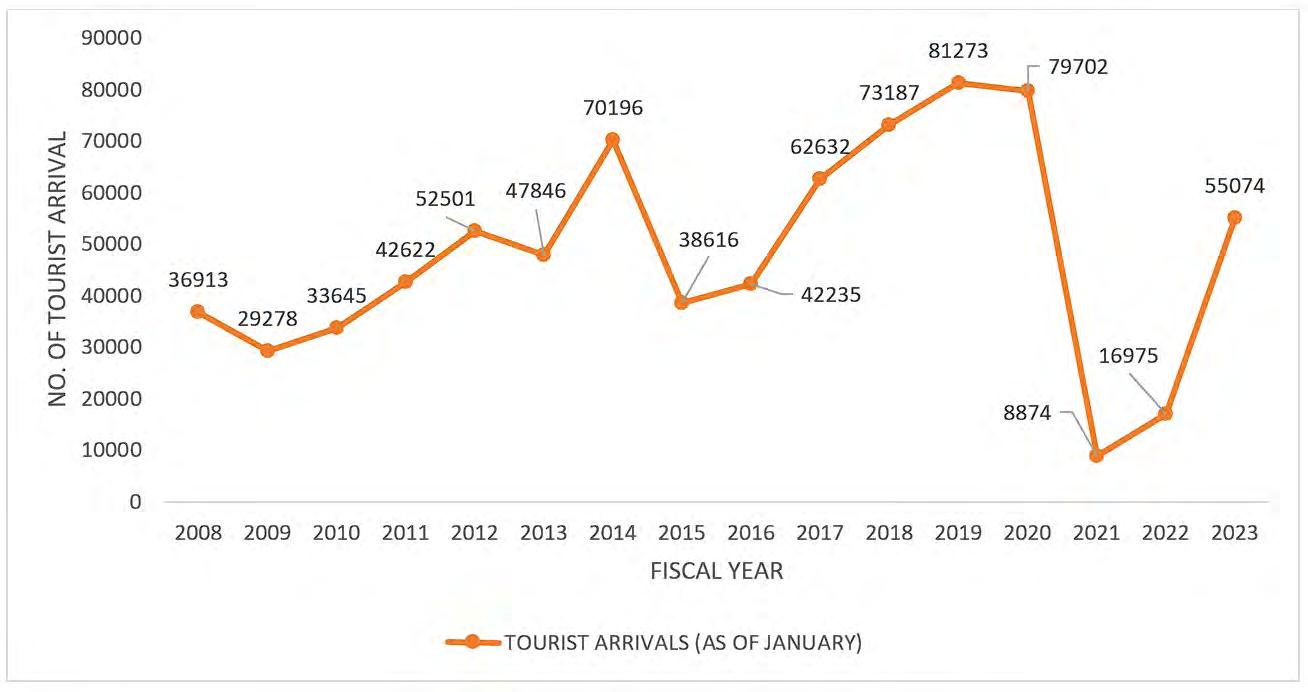
DOCKING NEPAL’S ECONOMIC ANALYSIS 70
Figure 21. Tourist Influx in January from FY 2008/09 to FY 2022/23
Table 11. Tourist Arrival in Nepal by Nationality in January of the year 2021 and 2022
Tourist Arrival by Nationality Year 2021 2022 India 64672 209105 United States (US) 22854 77000 United Kingdom (UK) 8680 44700 Australia 2477 26800 Bangladesh 5044 25300 Others 47235 231243 Total 150962 614148
It is crucial to note that since Nepal also shares its border with China, a leading giant in the world, and given that Chinese tourists are one of the largest groups of foreign tourists to visit Nepal in the past, their absence as tourists has negatively impacted the growth of the tourism industry.369
Alongside, domestic tourism has also been prospering in Nepal, contributing substantially to the tourism sector. Despite these positive developments, the total number of tourists arriving in Nepal in 2022 is still below the pre-pandemic level where a total of 1,197,191 tourists arrived in 2019.370
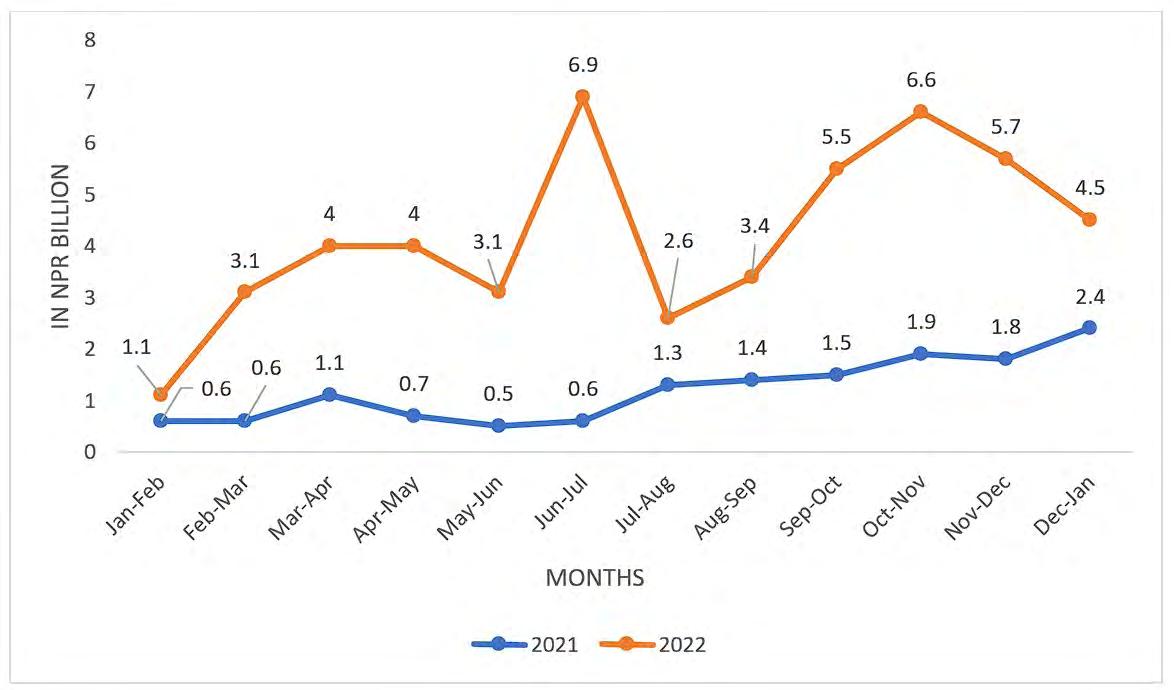
MOUNTAINEERING UPDATES
Nepal Set to Ban Solo Trekking
The Government of Nepal has established new rules to govern the great Himalayan trails. The new rule, proposed by Nepal Tourism Board (NTB), requires tourists to hire a licensed guide or porter before trekking through the country's wilderness. The move, to be effective from April 1, 2023, prevents foreign travelers from hiking alone in Nepal to
ensure their safety and to prevent them from getting lost in the trails.371 On the contrary, Nepali trekkers are exempt from the new rule due to their familiarity with the local terrain and culture, their ability to communicate with locals, and the fact that they are not subject to the same travel restrictions as foreigners.
Alongside, the cost of the NTB's Trekkers Information Management System (TIMS) card, a permit compulsory for all hikers, will also rise significantly in the coming days. SAARC nationals will now have to pay NPR 1,000 (USD 7.61) per solo hiker, an increase from NPR 600 (USD 4.56), as of April. Other foreign hikers must pay NPR 2,000 (USD 15.22) per solo hiker, double the prior price of NPR 1,000 (USD 7.61).372
Experts from the tourism industry anticipate that this rule could have a significant impact on adventure tourism. However, some associations vouch for the rule to be implemented. For instance, the Trekking Agencies Association of Nepal (TAAN), one of the most active agencies associated with more than 2,000 trekking agencies associated with it, had been lobbying for a
"one-trekker, one-guide" system since 2012 citing that a rule such as this could bring jobs to approximately 40,000 Nepalis.373
FINANCIAL SITUATION
Revival of Cashflow in the Tourism Sector
Travel income refers to the income of enterprises in the tourism industry while travel spending refers to money spent by tourists for the purchase of goods and services. Given this, as a result of the increase in the influx of tourists, the monetary transactions in the tourism sector also witnessed a positive recovery. In 2022, travel income increased to NPR 50.5 billion (USD 384.53 million) as compared to NPR 14.5 billion (USD 11.04 million) in 2021, indicating an increase of 248%. Similarly, in 2022, travel spending increased to NPR 119 billion (USD 906.12 million) from NPR 47.5 billion (USD 361.68 million) in 2021, suggesting an increase of 148%.374 A monthwise travel income and travel spending have been shown in the figures below.
NEFPORT ISSUE 52 – MARCH 2023 71
Table 12. Tourist Arrival in Nepal by Nationality in January of the year 2021 and 2022 Source: Current Macroeconomic and Financial Situation Table Based on Six Months of Data, Nepal Rastra Bank
Source: Current Macroeconomic and Financial Situation Table Based on Six Months of Data, Nepal Rastra Bank
Security Market Performance
The Nepal Stock Exchange (NEPSE), the sole stock-exchange platform for Nepal's secondary market, allows listed companies from the tourism industry to raise capital through the secondary market. A total of five hotels are listed under NEPSE, namely, Chandragiri Hills Ltd., Oriental Hotels Ltd., Soaltee Hotel Ltd., Yak And Yeti Hotel, and Taragaon Regency Hotel Ltd. However, Yak and Yeti’s license has been revoked by NEPSE, following its inability to pay renewal fees on time.375
All five-star hotels listed on NEPSE reported net profits in the first quarter of FY 2022/23.
Soaltee Hotel Limited reported a profit of NPR 112 million (USD 0.852 million) in the first quarter, compared to a loss of NPR 21.16 million (USD 0.161 million) in the same quarter of the previous FY 2020/21.376 On the contrary, the total market capitalization of hotels decreased by 17.4% to reach NPR 55.39 billion (USD 421.78 million) as of mid-January 2023. This accounts for 1.8% of the total market capitalization of NEPSE.377 A decrease in market capitalization highlights the lack of confidence among investors in the tourism sector which is still gaining momentum.
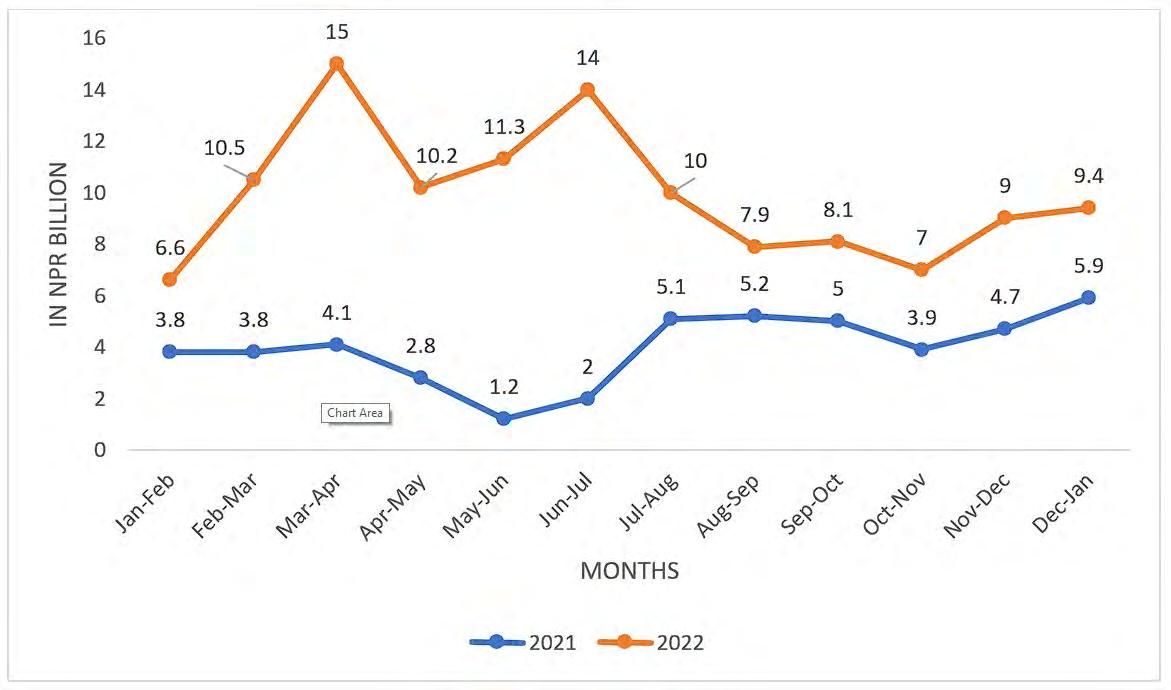
Credit to the Tourism Industry
Tourism in Nepal is a capital-
intensive industry that requires a significant amount of credit from the government. The Government of Nepal provides this credit through sectorwise outstanding credit to the tourism sector under headings such as trekking, mountaineering, resorts, rafting, camping, and others. As of mid-January 2023, the total outstanding credit to tourism activities (trekking, mountaineering, resort, rafting, and camping) decreased by 5.2% to reach NPR 23.4 billion (USD 178.92 million).378 Similarly, total outstanding credit by banks to hotels increased by 4.3% to NPR 156.25 billion (USD 1.273 billion) by mid-October 2022.379 This data is further explained in the table below.
Source: Current Macroeconomic and Financial Situation Table Based on Six Months of Data, Nepal Rastra Bank
Note: P = Preliminary, R = Revised
DOCKING NEPAL’S ECONOMIC ANALYSIS 72
Table 12. Sectoral outstanding credit by banks and financial institutions (in NPR millions)
Headings January(R) 2022 January(P) 2023 Year-on-year change (in percentage) Tourism (Trekking, Mountaineering,
23.7 23.4 -5.2% Hotel 153.05 156.25 4.3%
Resort, Rafting, Camping, etc.)
Figure 22. Monthwise travel spending in Nepal for 2021 and 2022
Yeti Airlines Crash Denotes a Setback to Recovering Tourism
Yeti Airlines, also known as Yeti Airways, is one of the leading Nepali airlines that operates domestic flights around the country in nine destinations.380
On January 15, 2023, a Yeti Airlines plane, carrying 68 passengers and four crew members, from Tribhuwan International Airport (Kathmandu) to Pokhara – one of the most popular tourist destinations of Nepal, situated only 204 km far from its capital, met with a devastating crash, killing all of the people on board.381 The plane was set to land at the newly built Pokhara International Airport. The cause of the crash is still under investigation, but initial reports by the Aircraft Investigation Commission (AAIC) 2079, formed by the Government of Nepal to investigate the accident, suggest that the pilot’s error may have contributed to the incident.382
The recent air crash in Nepal is not only a tragedy for the families and close ones of the victims but also a harsh blow to Nepal's tourism industry. This accident is the third biggest in terms of casualties and the 104th crash in Nepali skies.383
As the country was gaining momentum in the aftermath of the COVID-19 pandemic, this accident had a severe impact on both domestic and international tourism in Nepal. There are reports that the number of flights and passengers took a nosedive after the crash. This incident also raises concerns about the safety standards and regulations
of the Pokhara International Airport. The recent air crash has further exacerbated the negative perception of the Nepali airline industry internationally, which continues to be prohibited from operating flights in the European Union. 384
Trekking Agencies Association of Nepal (TAAN), Hotel Association of Nepal (HAN), and several activists have demanded significant measures and reforms from the government to ensure Nepal's sky and aviation services are safe and prevent future incidents. 385 The Nepali airline industry must undertake reforms and adhere to the highest safety standards to improve its image and regain the trust of tourists. The government should work closely with industry leaders to identify areas of improvement and take proactive measures to address safety concerns. Additionally, Nepal should explore partnerships with international aviation and tourism regulatory bodies to gain valuable insights and expertise for best practices in the industry. This will enable Nepal to adopt world-class safety standards and enhance its aviation and tourism infrastructure, which will not only boost the economy but also provide a safe and enjoyable experience for visitors.
NEW DEVELOPMENT
Emerging Luxury Tourism
Nepal's tourism industry has been predominantly associated with adventure and cultural tourism, but recently, there
has been an emerging trend toward luxury tourism. In the past, several resorts inside the Chitwan National Park offered jungle safaris and other services. However, these resorts were forced to move outside the park in 2012 due to government concerns about the environmental impact of luxury jungle safaris. Luxury resorts like Tiger Tops, regarded as the ambassadors of Nepal’s luxury tourism, were left to decay inside the park. However, Nepal's Supreme Court has issued a new directive to reopen luxury resorts inside the country's Chitwan National Park. Re-emergence of luxury destinations in Chitwan coupled with the development of Shinta Mani Mustang is set to build a new culture of high-end tourism in Nepal.386
The emergence of luxury tourism in Nepal is a significant development that not only diversifies the tourism products offered but also attracts a different segment of the market, with a growing number of affluent travelers seeking exclusive experiences. This development can be a game-changer for the country's tourism industry. Additionally, the positive impact of luxury tourism on the local economy cannot be overstated, with the potential to create job opportunities and boost local businesses. Furthermore, the revenue generated from luxury tourism can be utilized for the conservation and preservation of National Parks and the local ecology. It is, therefore, imperative that the government takes proactive measures to ensure that the operation of such luxury
NEFPORT ISSUE 52 – MARCH 2023 73
resorts does not compromise the delicate ecology of the region.
PROGRAMS, EVENTS, AND CAMPAIGNS
Tourism Decade FY 2023-2032
The Visit Nepal initiative is an initiative launched by the Government of Nepal and the Ministry of Tourism to increase the number of tourists to Nepal and boost the country's economy. First launched in the year 1998, followed by 2011 and 2020, the Visit Nepal initiative has had varying degrees of success.387 However, the latest Visit Nepal initiative, Visit Nepal 2020, faced unprecedented challenges due to the COVID-19 pandemic. The suspension of the initiative was a significant setback for Nepal's tourism industry, but the government is determined to bounce back and has launched the Visit Nepal Decade (VND) in 2023, aiming to establish Nepal as a leading destination in the global tourism market. The action plan prepared by the government has goals like increasing tourist arrivals to 3.5 million, creating 1 million jobs, and increasing per-tourist spending to USD 125 (NPR 16,416) from the current USD 45 (NPR 5,909).388
The plan prioritizes Nepal's diversity and declares special tourist sites around the country to increase the tourist influx in various regions.389
The success of the Visit Nepal Decade 2023-33 initiative in
promoting Nepal as a tourist destination will depend on active participation and cooperation between the private and public sectors. Since the country suffered a large deal of revenue decline and job losses during the pandemic, VND should aim at putting the country on a sustainable growth trajectory. Infrastructure development, involvement of Non-Resident Nepalis (NRNs), and innovative marketing strategies will be crucial to achieving the initiative's ambitious goals and taking the country's tourism industry to new heights while creating job opportunities and boosting the economy.
POLICIES AND REGULATION
New Policy Introduced to Promote Nightlife Business
Even though late-night businesses relating to tourism are a significant source of tourist expenditure worldwide, Nepal has not given much consideration to this sub-sector in the past.390 Safety has always been a persistent issue during the operation of conducting businesses during the late hour. However, the Ministry of Home Affairs has adopted a liberal policy for nighttime businesses across the country including liquor shops, restaurants, and nightclubs which allows them to open their operations during the night. 391 According to the new policy, liquor shops are
now allowed to stay open until 10 pm, restaurants can open until midnight, and dance bars and clubs can operate until 4 am.392 The move is set to promote tourism, increase job opportunities, and generate higher revenue. The extended opening hours are also set to attract more tourists, thereby promoting vibrant nightlife and benefitting the local economy. However, it is equally important for the government to address the connectivity issues by enhancing the road infrastructure development and safety issues to facilitate the smooth functioning of the business at night.
Supreme Court Rules Out Service Charge from Consumer Bills
The Supreme Court of Nepal has declared 10% service charges that are added to consumer bills as illegal and banned their imposition with immediate effect.393 The constitutional bench ruled that since Section 87 (3) of the Labour Act, 2017 had been declared void, service charges were no longer legal. Service providers such as airports, banks, drinking water suppliers, educational institutions, electric utilities, hospitals, hotels, restaurants, and telecom companies are covered by the ruling.394 The decision comes as a relief for consumers who have been disputing bills for being charged more than the menu prices.
DOCKING NEPAL’S ECONOMIC ANALYSIS 74
TThe tourism sector in Nepal is showing signs of recovery, but it still faces several challenges. With the gradual lifting of restrictions and increased confidence in travel, there is optimism that the sector will experience a recovery in the coming months.
The Visit Nepal Decade 2023-33 initiative will require the active participation of both the private and public sectors to promote Nepal as a tourist destination. Public-private cooperation will be key to generating innovative ideas and effective marketing strategies. Non-resident Nepalis (NRNs) can also play a significant role in promoting Nepal's unique culture, history, and natural beauty. Infrastructure development will be key to enhancing the visitor experience, creating job opportunities, boosting the economy, and generating revenue for the government. In the digital age, digital marketing will play a crucial role in achieving the goal of the Visit Nepal Decade, which aims to attract an unprecedented number of tourists to the country by leveraging various online platforms and technologies. By focusing on these key areas, the initiative can achieve its ambitious goals and take Nepali tourism to new heights.
In addition to the aforementioned measures, improving flight safety is a critical component of Nepal's efforts to reverse its abysmal tourism figures. Airlines operating in the country must be held responsible for frequent monitoring of their airplanes, discarding them when they become old, increasing their capital to improve services, and implementing strict safety protocols. The government should take necessary measures to ensure the safety of flights and create a conducive environment for the aviation industry to thrive. Boosting flight safety will go a long way in improving tourists' confidence and attracting more visitors to Nepal. Additionally, Nepal needs to prioritize removing itself from the European Commission's air safety list. This will require addressing the country's aviation safety concerns and meeting international standards. Doing so will not only improve flight safety but also increase the number of European tourists visiting Nepal, boosting its tourism sector.
NEFPORT ISSUE 52 – MARCH 2023 75
Outlook
4
Market Review
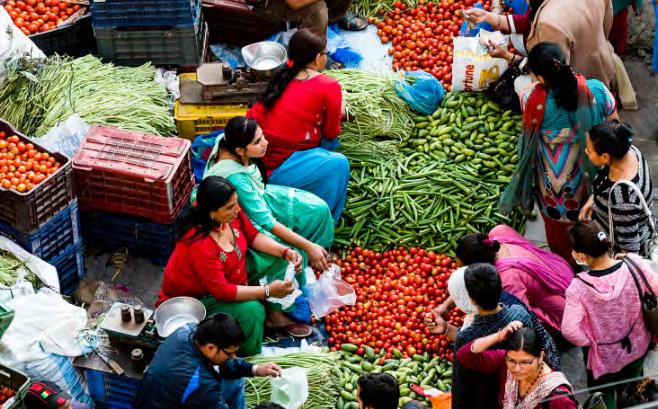
DOCKING NEPAL’S ECONOMIC ANALYSIS 76
Financial Market
During the review period, the Nepal Rastra Bank (NRB) introduced new directives to streamline the financial sector. NRB has directed the Banks and Financial Institutions (BFIs) to not take penal interest from borrowers for outstanding loans that are due until mid-June 2023. Likewise, NRB has instructed BFIs to restructure and reschedule outstanding loans for small and medium-sized enterprises (SMEs). In addition to this, NRB has also introduced regulations for microfinance institutions to prevent predatory lending practices. A mid-term review of the Monetary Policy was carried out by the NRB wherein the position of the Foreign Exchange Reserve, Standing Liquidity Facility (SLF), and the inflow of remittances has increased while the inflation has exceeded target levels, which is putting pressure on consumer prices.
Second Quarter Performance Analysis of Commercial Banks
As per the unaudited second quarterly results of Commercial Banks of the FY 2022/23, as shown in Table x the operating profit of commercial banks increased by 27.95%, while the net profit grew by 25.70%.
In the first quarter of the FY 2022/23, Nabil Bank bagged the highest net profit of NPR 3417.69 million (USD 23.02 million), followed by NIC Asia Bank and Global IME BOK. Agriculture Development Bank Limited (ADBL) registered a negative net profit of NPR 108.74 million (USD 0.82 million). Everest Bank and Standard Chartered Bank had a whopping increase of 89.28% and
61.36% in their net profits. When we look at reserves and surplus, Nabil Bank held the highest reserves of NPR 25.57 billion (USD 194.73 million) followed by Nepal Investment Mega Bank and Mega Bank. Seven banks fared more than the reserves and surplus industry average of NPR 11.19 billion (USD 85.26 million). Additionally, the deposits from customers saw a 41.38% rise compared to the corresponding period last year with the highest deposits being made at Global IME BoK, Nepal Investment Mega Bank, and Nabil Bank.
Civil Bank recorded the lowest deposits from customers with NPR 94.7 billion (USD 721.08 million). Global IME BOK holds the highest loan and advances
Consumer Price Index (mid- January)
7.26 %
Gross foreign exchange reserves (mid-January)
NPR 1337.29 billion
Buying Exchange Rate per USD (mid-January)
NPR 129.83
Weighted Average 91-day Treasury Bills Rate (mid-January)
10.89%
Weighted average inter-bank transaction rate (mid-January)
7.48%
Weighted average deposit rate (mid-January)
8.51%
Weighted average lending rate (mid-January)
12.79%
Average base rate of commercial banks (mid-January)
10.91%
portfolio of NPR 363.23 billion (USD 2.76 billion) followed by Nepal Investment Mega Bank and Nabil Bank. Standard Chartered Bank had the lowest credit disbursement of NPR 81.03 billion (USD 656.99 million).
Additionally, during the review period, average Non-Performing Loans (NPL) increased standing at 2.41%, as compared to 1.11% in the same period of the previous year. Furthermore, the cost of funds increased by 8.54% against 6.12% in the corresponding period of the previous year.
NEFPORT ISSUE 52 – MARCH 2023 77
Factsheet395
Table 13. Second Quarter Performance Analysis of Commercial Banksunaudited as of FY 2022/23 (in NPR Thousands) (in 000) Deposit Loans and Advances Operating Profit Net Profit NPL (%) Cost of Fund (LCY) Base Rate (%) Bank Paid-up Capital Reserve & Surplus FY 22/23 FY 21/22 % Change FY 22/23 FY 21/22 % Change FY 22/23 FY 21/22 % Change FY 2 2/23 FY 21/22 % Change FY 22/23 FY 21/22 FY 22/23 FY 21/22 % Change FY 22/23 2nd QTR 2nd QTR 2nd QTR 2nd QTR 2nd QTR 2nd QTR 2nd QTR 2nd QTR 2nd QTR 2nd QTR 2nd QTR 2ndQTR 2nd QTR Nabil Bank 27,056,997.00 25,574,140.00 347,461,662.00 232,554,739.00 49.41 05,696,739.00 207,437,283.00 47.37 4861,794.00 3,115,389.00 56.06 3,417,698.00 2,181,420.00 56.67 2.98 1.11 8.42 6.03 2.39 10.10 Nepal Investment Mega Bank* 34,128,595.00 23,550,126.00 355,236,207.00 317,893,055.00 2,982,447.00 2,086,307.00 3.71 8.22 10.5 Standard Chartered Bank 9,429,454.00 5,825,886.00 102,717,806.00 86,288,283.00 19.04 81,036,724.00 76,104,669.00 6.48 2,513,638.00 1,552,529.00 61.91 1,753,635.00 1,086,770.00 61.36 0.72 0.44 7.5 4.3 3.20 9.67 Himalayan Bank 14,006,223.78 7,423,439.96 176,250,073.04 165,512,621.65 6.49 153,364,935.73 150,678,016.95 1.78 1,389,259.21 1,062,089.74 30.80 954,704.99 743,450.90 28.42 3.77 0.72 8.82 6.98 1.84 10.86 Nepal SBI Bank 9,825,853.11 6,419,903.83 133,956,477.96 112,897,058.18 18.65 120,897,281.84 108,713,752.85 11.21 1,665,365.43 1,111,108.51 49.88 1,177,194.32 782,781.12 50.39 0.47 0.14 7.95 5.54 2.41 10.75 Everest Bank 10,698,094.00 9,900,985.00 180,792,914.00 165,217,641.00 9.43 157,927,362.00 142,646,031.00 10.71 2,268,477.00 1,198,980.00 89.20 1,588,002.00 838,920.00 89.29 0.55 0.26 8.15 5.98 2.17 9.97 Global IME BOK 35,771,060.00 18,319,390.00 403,683,639.00 271,901,611.00 48.47 363,239,472.00 256,425,466.00 41.65 3,794,568.00 3,676,914.00 3.20 2,782,379.00 2,663,384.00 4.47 2.92 1.13 8.72 6.16 2.56 10.8 Kumari Bank 26,225,861.34 12,057,767.75 299,691,753.46 159,821,637.18 87.52 275,761,355.55 155,962,076.52 76.81 1,573,392.62 1,368,850.67 14.94 1,530,707.07 951,738.18 60.83 3.15 1.06 9.05 5.98 3.07 11.73 NIC Asia Bank 11,564,005.37 12,896,750.44 305,857,732.75 294,940,872.91 3.70 256,860,843.07 261,923,033.78 (1.93) 4,693,463.94 3,420,555.02 37.21 3,273,330.26 2,402,066.31 36.27 0.61 0.47 8.38 7.06 1.32 11.02 Machhapuchchhre Bank 10,257,155.58 4,138,971.29 150,542,157.10 137,495,624.97 9.49 135,577,148.54 131,990,726.60 2.72 1,473,578.85 1,451,260.49 1.54 1,025,262.14 1,010,830.47 1.43 1.41 0.57 8.84 6.78 2.06 11.23 Laxmi Bank 11,551,345.00 5,057,583.00 145,718,212.00 130,814,652.00 11.39 130,197,173.00 126,184,824.00 3.18 1,493,120.00 1,131,908.00 31.91 1,077,115.00 817,398.00 31.77 1.56 0.83 8.91 6.54 2.37 11.37 Siddhartha Bank 14,089,980.19 8,821,572.45 205,129,144.74 188,798,429.61 8.65 177,601,676.74 176,881,957.04 0.41 1,657,267.44 2,280,851.82 (27.34) 1,161,199.79 1,577,313.80 (26.38) 2.87 0.37 8.7 6.59 2.11 10.91 Citizens Bank International 14,200,974.01 5,647,230.14 159,481,735.05 141,086,005.18 13.04 138,579,436.31 127,571,106.98 8.63 1,191,972.62 1,695,875.78 (29.71) 841,333.05 1,239,349.55 (32.11) 2.99 1.87 9.22 7.05 2.17 11.19 Prime Commercial Bank 19,402,575.72 8,359,026.21 164,464,758.29 158,930,952.53 3.48 150,313,341.43 154,394,296.40 (2.64) 2,362,365.26 2,409,747.34 (1.97) 1,652,044.75 1,678,589.95 (1.58) 2.81 0.78 9.25 7.29 1.96 11.34 Sunrise Bank 10,118,892.81 7,122,721.08 131,662,831.25 129,242,988.45 1.87 118,875,301.01 120,390,362.43 (1.26) 926,046.28 1,063,497.05 (12.92) 653,957.25 745,544.61 (12.28) 3.36 1.41 9.07 6.76 2.31 11.62 NMB Bank 18,366,706.00 7,604,479.00 192,638,001.00 181,700,648.00 6.02 183,430,287.00 172,145,113.00 6.56 2,718,667.00 2,422,987.00 12.20 1,901,153.00 1,711,519.00 11.08 2.24 1.49 8.16 5.78 2.38 10.68 Prabhu Bank 23,542,490.00 9,081,138.00 270,923,379.00 163,598,778.00 65.60 245,385,577.00 142,332,648.00 72.40 1,634,196.00 1,868,118.00 (12.52) 1,199,963.00 1,262,010.00 (4.92) 1.98 1.23 8.6 6.16 2.44 11.44 Nepal Investment Mega Bank* 34,128,595.00 23,550,126.00 355,236,207.00 317,893,055.00 2,982,447.00 2,086,307.00 3.71 8.22 10.5 Civil Bank 9,075,844.00 2,823,974.00 94,710,053.00 91,698,217.00 3.28 84,081,763.00 83,427,478.00 0.78 904,998.00 732,292.00 23.58 637,023.00 504,001.00 26.39 2.41 0.94 9.49 6.8 2.69 11.73 Sanima Bank 12,460,115.06 4,620,689.73 159,208,052.14 144,534,360.66 10.15 143,733,932.37 135,893,214.88 5.77 1,822,027.72 1,500,577.32 21.42 1,285,388.52 1,077,068.52 19.34 0.77 0.31 8.92 6.41 2.51 10.86 Public Sector Banks Nepal Bank 14,694,022.93 19,983,670.70 212,837,603.44 182,840,958.51 16.41 168,936,081.78 163,109,490.82 3.57 1,514,585.29 1,635,336.67 (7.38) 1,170,655.43 1,417,058.84 (17.39) 3.11 1.91 8.31 5.52 2.79 9.9 Rastriya Banijya Bank 15,637,377.05 16,828,886.89 282,119,052.27 241,496,841.49 16.82 218,069,002.39 162,687,518.14 34.04 3,839,543.71 2,415,595.64 58.95 2,711,851.61 1,748,859.99 55.06 2.79 4.23 7.05 3.29 3.76 9.73 Agriculture Dev. Bank 18,620,627.76 11,953,410.17 172,847,928.09 157,491,860.51 9.75 175,857,594.20 174,288,784.64 0.90 -111,541.69 2,081,872.53 (105.36) -108,741.63 2,087,111.60 (105.21) 4.52 2.08 8.53 5.51 3.02 11.06 Total 404,852,844.71 257,561,867.64 5,003,167,379.58 3,538,864,780.83 41.38 4,421,209,137.96 3,231,187,850.03 36.83 50,151,678.68 39,196,335.58 27.95 35,858,469.55 28,527,185.84 25.70 2.41 1.11 8.54 6.12 2.42 10.82
Similarly, the average base rate stood at 10.82% during the review period, the highest being 11.73% for Kumari Bank followed by Civil Bank at 11.73%
KEY INDICATORS
Some of the key macroeconomic indicators as per the macroeconomic and financial
situation report based on the six months’ data ending mid-January of the FY 2022/23 published by the NRB are highlighted below:396
Deposit and Credit Mobilization
The deposits at BFIs increased by 4.2%, as compared to an increase of 3.8% in the corresponding period of the previous year.
Of total deposits, the (share of demand, saving, and fixed deposits stood at 7.8%, 25.6%, and 60.4%, respectively.) As of mid-January 2023, the share of institutional deposits in the total deposit of BFIs stood at 36.6%, whereas last year it was 39.2% in the same period.
Figure 23. Deposit mix at Banks and Financial Institutions
Share)
Source: Current Macroeconomic and Financial Situation based on 6 months, Nepal Rastra Bank, 2022/23
Similarly, private sector credit from BFIs increased by 64.9% compared to a growth of 64% in the previous year. Private sector credit from commercial banks, development banks, and finance companies increased by 2.8%,
4.9%, and 1.6%.
Loans of BFIs to the agriculture sector increased by 3.7%, the industrial production sector by 8.4%, the transportation, communication, and public
sectors by 8.2%, the wholesale and retail sector by 3.9%, and the service industry sector by 4.6%, respectively.
Figure 24. Sectorwise Outstanding Credit of Banks and Financial Institutions
Source: Current Macroeconomic and Financial Situation based on 6 months data, Nepal Rastra Bank, 2022/23
NEFPORT ISSUE 52 – MARCH 2023 79
(Percentage
(Amount NPR in billion)
366.35 719.87 274.04 942.71 380.46 402.7 753.34 316.05 984.85 411.57
2022 January 2023 January 2021 (Mid-July) 10.4 34.2 47 8.4 2022 (Mid-July) 8.9 27.6 55.8 7.7 2022 (Mid-January) 8.5 30.3 54.4 6.8 2023 (Mid-January) 7.8 25.6 60.4 6.2 Demand Saving Fixed Other 10.4 34.2 47 8.4 8.9 27.6 55.8 7.7 8.5 30.3 54.4 6.8 7.8 25.6 60.4 6.2 2021 (Mid-July) 2022 (Mid-July) 2022 (Mid-January) 2023 (Mid-January)
AGRICULTURE INDUSTRIAL PRODUCTION TRANSPORTATION,… WHOLESALE AND RETAIL SECTOR SERVICE INDUSTRIES
In terms of credit exposure, the term loan extended by BFIs increased by 10.7%, overdraft loan increased by 8.3% and demand and working capital loan increased by 4.0%. Additionally, real estate loans, which include residential personal loans, increased by 1.4%, while the trust receipt (import) loan decreased by 8.6% and margin nature loans decreased by 7.0%.
Liquidity Management
In the review year, NRB injected NPR 3094.76 billion (USD 23.56 billion) liquidity of which NPR 318.09 billion (USD 2.42 billion) was through a repo, NPR 83.85 billion (USD 638.47 million) through outright purchase
auction, and NPR 2,692.83 billion (USD 20.50 billion) through SLF. In the previous year, it was NPR 3306.96 billion (USD 25.18 billion) liquidity.
Additionally, NRB injected liquidity of NPR 358.90 billion (USD 2.73 billion) through the net purchase of USD 2.76 million (NPR 362.47 million) from the foreign exchange market. Liquidity of NPR 80.26 billion (USD 611.13 million) was injected through the net sale of USD 667.4 million (USD 87.65 million) in the previous year.
Foreign Exchange Reserves and Adequacy
In the review period, gross foreign exchange reserve stood at NPR
1,337.29 billion (USD 10.18 billion), increasing by 10.0% in midJanuary 2023 from NPR 1,215.80 billion (USD 9.25 billion) in midJuly 2022. Of the total foreign exchange reserves, reserves held by NRB increased by 8.0% to NPR 10.30 billion (USD 78.43 million) in mid-January 2023 from NPR 9.54 billion (USD 72.64 million) in mid-July 2022. Reserves held by BFIs other than NRB decreased by 3.4% to NPR 153.91 billion (USD 1.17 billion) in mid-January 2023 from NPR 1056.39 billion (USD 8.04 billion) in mid-July 2022. The Indian currency’s share in total reserves stood at 23.6% in mid-January 2023.
Source: Current Macroeconomic and Financial Situation based on 6 months, Nepal Rastra Bank, 2022/23
Based on imports of FY 2022/23, the foreign exchange holdings of the banking sector are sufficient to cover the imports of prospective merchandise for 10.4 months, and merchandise and service imports for 9.1 months. The ratio of reservesto-GDP, reserve-to-imports, and reserve-to-M2 stood at 27.6%, 75.5%, and 23.4%, respectively in mid-January 2023.
Federal Government Expenditure and Revenue
In the review period, the total expenditure of the provincial government was NPR 47.53 billion (USD 361.92 million) while the total resource mobilization of provincial governments remained at NPR 75.53 billion (USD 575.12 billion).
Interest Rates
The weighted average 91-day treasury bill rate remained at 10.89% in the six months of 2022/23, as against 5.07% a year ago. Furthermore, in midJanuary 2023, the weighted average inter-bank transaction rate among commercial banks stood at 7.48% as against 4.76% a year ago. The average
DOCKING NEPAL’S ECONOMIC ANALYSIS 80
Table 13. Foreign Exchange Adequacy Indicators
FY 22/23 (mid-January) FY 21/22 (mid-July) Total Foreign Reserv In NPR 1,337.29 billion 1,215.18 billion In USD 10.30 billion 9.54 billion Reserve-to-GDP (ratio) 27.6 % 25.1% Reserve-to-Imports (ratio) 75.5% 57.8% Reserve-to-M2 (ratio) 23.4% 22.1%
inter-bank rate of BFIs, which is considered an operating target of the monetary policy, stood at 7.53% in the review month.
Furthermore, the average base rate of commercial banks stood at 10.91% in the review period from 8.42% a year ago. The weighted average deposit rate and lending rate of commercial banks stood at 8.51% and 12.79%, respectively in the review period, as compared to 6.37% and 9.44%, respectively a year ago in the same review period.
Balance of Payments (BoP)
The current account registered a deficit of NPR 29.47 billion (USD 224.44 million) in the review period, compared to a deficit of NPR 352.16 billion (USD 2.68 billion) last year in the corresponding period. The overall
BoP remained at a surplus of NPR 97.10 billion (USD 739.36 million), as compared to a deficit of NPR 241.23 billion (USD 1.84 billion) in the previous year.
KEY DEVELOPMENTS
Some of the key developments that transpired in the financial market are as follows:
NRB directs waiver of penal interest on overdue loan payments
The NRB has issued a directive asking the BFIs not to take penal interest from borrowers for the next month from the date that the outstanding loans have been pending. This provision will be in effect only for loans in which the due date will be mid-June 2023 at the latest. The NRB has also asked the BFIs to restructure
and reschedule the outstanding loans up to NPR 20 million (USD 152.29 thousand) given to small and medium enterprises (SMEs) by mid-July 2024 and provide essential banking services from 10 am till 1:30 pm even public holidays.397
New regulations for Microfinance Companies (MFIs)
NRB has tightened the provisions for MFIs after several MFIs were found exploiting their customers by charging exorbitant interest rates.398 The central bank has streamlined commercial banks, development banks, and finance companies, but the microfinance firms that fall under the 'D' class financial institutions have largely remained unchecked. The new provisions include:
Revised provisions for MFIs
Borrowers who have taken loans from any bank will not get loans from microfinance companies, borrowers cannot take loans from more than one MFI at a time, and only one financial institution shall disburse a loan to one borrower without exceeding the credit limit.
Borrowers must self-declare that they have not taken loans from other banks and financial institutions.
The minimum interest rate of deposit savings should be fixed at least 50% of the maximum interest rate of loans provided by MFIs.
MFIs should deposit 50% of their annual dividend distributions in the general reserve fund, 25% in the Client Protection Fund, and 35% in the bank customer protection fund.
Social responsibility regulations have also been amended, with companies proposing to distribute dividends of more than 15% annually setting aside an amount equal to 10% of the proposed dividend above 15% for corporate social responsibility.
NEFPORT ISSUE 52 – MARCH 2023 81
Table 14. Revised provisions for MFIs NPR 26.46 billion (USD 201.4 million) in external loans for Nepal in the last six months
The half-yearly review of the budget for the fiscal year 2022/23 unveiled by the Ministry of Finance (MoF) showed that Nepal received foreign loans worth NPR 26.46 billion (USD 201.48 million) while mobilizing internal loans of NPR 30 billion (USD 228.43) in the first six months of the current fiscal year. The government has accelerated efforts to take concessional loans from the Asian Development Bank (ADB) to construct the KakadbhittaLaukahi road section and is preparing to take NPR 13 billion (98.99 million) subsidized loans each for the School Sector Reform Programme and Quality
Health System Project from the World Bank. Additionally, a subsidized loan for budgetary assistance of NPR 13 billion (USD 98.99 million) will be taken from the World Bank under the Nepal Fiscal Reforms DPC-2 Programme, and preparation is underway to take budgetary assistance worth around NPR 13 billion (USD 98.99 million) also for the government's 'Finance for Growth' program. The government is also receiving a soft loan of NPR 6.50 billion (USD 49.49 million) from the ADB for the Customs Reform and Modernization Strategies and Action Plan, and NPR 13 billion (USD 98.99 million) for the public finance management and service
Highlights from the mid-term review of the monetary policy
delivery reform program.399
Mid-year Monetary Policy Review
The NRB has published a halfyearly review of the monetary policy of the current fiscal year 2022/23. 400 The review exhibits the main macroeconomic indicators that have shown a steady improvement as a result of the relatively contractionary policy measures implemented by the central bank. The major highlights from the mid-term review of the monetary policy by NRB are discussed henceforth:
The average Consumer Price Inflation (CPI) up to mid-January is at 7.26 %. The objective of NRB was to keep the average CPI within the threshold of 7 % in the current fiscal year.
On a year-on-year basis, the import price index has increased by 8.7 %, the wage index by 12.39 %, and the wage rate index by 9.64 %. This is due to the increase in the price of petroleum products and the devaluation of the Nepali currency, which has put pressure on consumer prices.
The inflow of remittance increased by 24.3% compared to the first six months of the last Fiscal Year 2021/22.
The Current Account is at NPR 29.47 billion (USD 224.40 million) deficit compared to the NPR 352.16 billion (USD 2.68 billion) deficit in the same period of the previous fiscal year.
The BoP has remained positive compared to the massive deficit of NPR 241.23 billion (USD 1.84 billion) in the same period last fiscal year. Owing to the increased inflow of remittances and the decline in imports, an improvement in the Current Account and BoP has been observed.
The loans of up to NPR 20 million (USD 0.15 million) in the performing loan category at the end of mid-January will be restructured and rescheduled by mid-July after analyzing the cash flow and income of the industries and businesses. This will help small and medium-sized industries and businesses to operate more easily.
Source: NRB, Mid-Term Review of Monetary Policy FY 2079-80
DOCKING NEPAL’S ECONOMIC ANALYSIS 82
Table 15. Highlights from the mid-term review of the monetary policy
Multinational Companies Increase Earnings in Nepal
Multinational companies repatriated total earnings of NPR 22.55 billion (USD 171.71 million) to their home countries from Nepal in the fiscal year 2021/22, 13 % more than the amount they earned in FY 2020/21. The NRB's statistics show that the dividend earned by the FDI-based companies from Nepal increased over three-fold in the past seven years, with a cash dividend of NPR 15.75 billion (USD 119.93 million) and technology transfer of NPR 3.58 billion (USD 27.26 million).
Outlook
Surya Nepal, Butwal Power Company, Ncell Pvt Ltd, Gorkha Brewery, Power Transmission Company Nepal, Unilever Nepal, and Bottlers Nepal are among the multinational companies that have been making good earnings from investments in Nepal.402
NRB Flexible on e-Transactions and Interbank ATM Usage
The NRB has reduced the transaction fee for ATM users who use cards to carry out interbank service but has increased the ceiling of money transfers carried out by using the
electronic wallet. The limit of the wallet-to-wallet transaction has also been increased from NPR 25 thousand (USD 1.90 hundred) to NPR 50 thousand (USD 3.81 hundred) a day, and the threshold for mobile banking and internetbased payment has also been increased to NPR 300 thousand (USD 2.28 thousand) per day. The NRB has also permitted receiving remittance amounts in the wallet, and the payment service providers have officially agreed with the remittance company.403
NRB has taken various initiatives to regulate the finance sector by introducing new regulations and streamlining the sector and making it more transparent. The directive to not take penal interest from borrowers for outstanding loans and restructuring of loans for small and medium-sized enterprises by BFIs has been supported substantially. Additionally, the mid-term monetary policy review by NRB has maintained the contractionary monetary policy at the start of the fiscal year 2021/22 to prevent any potential economic disruptions in the future. There have been no modifications made to the regulations regarding real estate and the stock market which has been a let-down to the investors who were hoping for some positive changes in the mid-term review. Although the Nepal Bankers Association reduced the interest rate by one percent on fixed deposits, no changes have been made in the lending rates.401 Inflation has surpassed target levels, putting pressure on consumer prices. As this remains a challenge, moving forward, NRB needs to continue to introduce measures to manage inflation and support businesses, particularly SMEs, to ensure the continued growth of the finance sector.
NEFPORT ISSUE 52 – MARCH 2023 83
Capital Market
The stock market performance during the review period was highly volatile, the market went up to as high as 2019.93 points on February 28, 2023. The half-yearly review of the Monetary Policy of the current fiscal year by the Nepal Rastra Bank (NRB) has also disappointed investors, as their demands were not met. Further, with the movements in politics through the reformation of the cabinet and changing alliances of the ruling party, investor confidence in the capital market has dampened. As a result, the Capital Gain Tax (CGT) collected from share transactions has plummeted in the first half of the current fiscal year, leaving the government's revenue collection short.
Secondary Market
During the review period (December 2022 to February 2023), the NEPSE index increased by 3.00%, closing at 2019.93 points. The total market capitalization at the end of the review period amounted to NPR 3103.16 billion (USD 23.63 billion). The most significant decrease was seen by the Microfinance sub-index (10.46%), followed by the Manufacturing and Processing sub-index (6.30%) and Commercial Bank sub-index (4.54%).
Table 16. Key Indicators
Factsheet404
NEPSE Index (mid-October, in points)
2149.4
Stock market capitalization (end of the review period) NPR 3103.16 billion
Number of companies listed at NEPSE (mid-January)
249
DOCKING NEPAL’S ECONOMIC ANALYSIS 84
Source: Nepal Stock Exchange (NEPSE)
1 Dec 2022 28 Feb 2023 % Change NEPSE Index 1961.07 2019.93 3.00% Sub-Indices Commercial Bank 1379.74 1317.15 (4.54%) Development Bank 1463.37 1467.99 0.32% Hydropower 2036.52 2591.86 27.27% Finance 1620.45 1690.26 4.31% Non-Life Insurance 7649.37 8868.88 15.94% Others 1,463.37 1467.99 0.32% Hotels & Tourism 2,706.52 3176.83 17.38% Microfinance 4406 3944.97 (10.46%) Mutual Fund 13.43 14.23 5.96% Life Insurance 9246.84 10159.23 9.87% Manufacturing & Processing 5213.58 4885.09 (6.30%)
Source: Nepal Stock Exchange (NEPSE)
Primary Market: During the review period, the Initial Public Offerings (IPOs) of multiple companies were approved.405 IPO of Molung Hydropower Company Ltd, Makar Jitumaya Suri Hydropower Ltd, Sanima
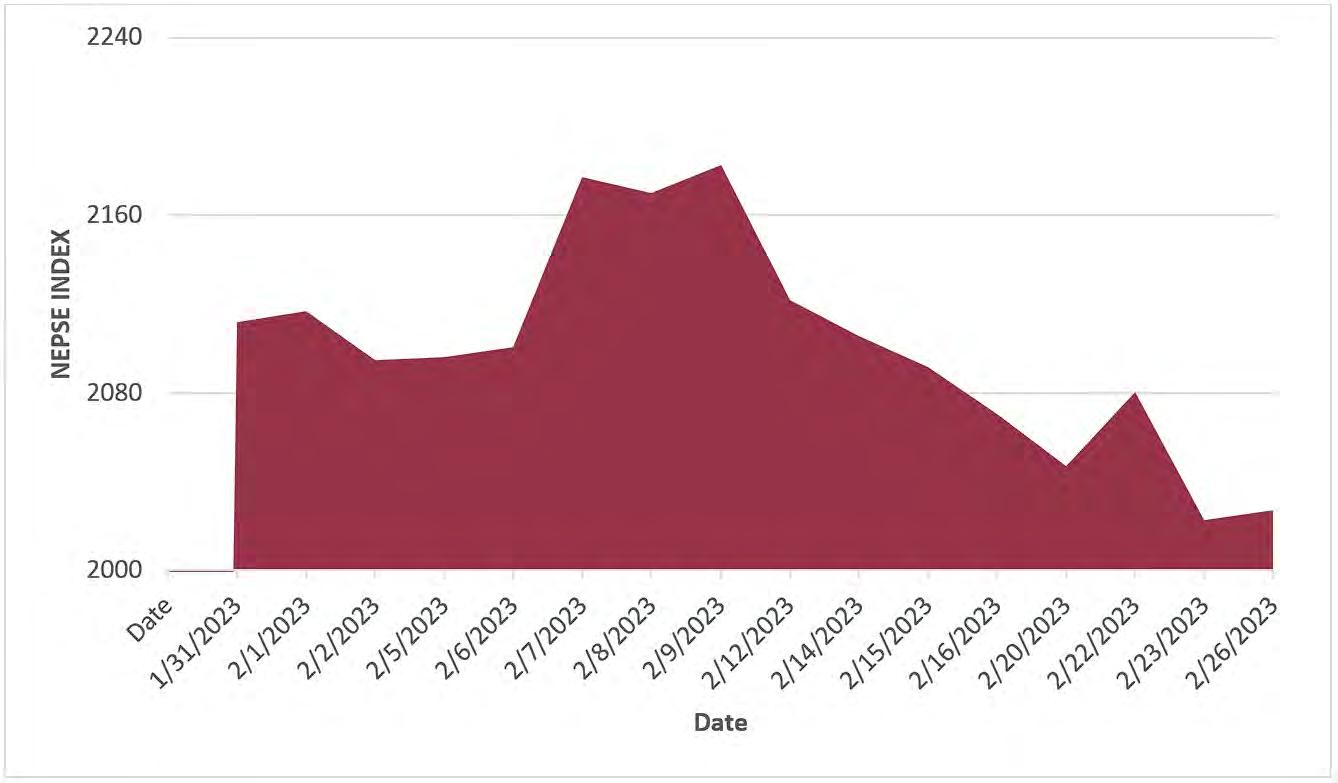
Middle Tamor Hydropower Ltd, BPW Laghubitta Bittiya Sanstha Ltd, Sagarmatha Jalbidhyut Company Ltd, Aatmanirbhar Laghubitta Bittiya Sanstha, Dolti Power Company Ltd, Bhugol Energy Development Co. Ltd,
Menchhiyam Hydro Power Ltd, Ingwa Hydropower Ltd, Mai Khola Hydropower Ltd, and Modi Energy Ltd was approved by Securities Board of Nepal (SEBON).
Table 17. Public Issue Size of IPO-Approved Companies
Source: SEBON, Initial Public Offerings Approved
NEFPORT ISSUE 52 – MARCH 2023 85
Figure 25. NEPSE Movement Index
Name of Company Public Issue Size Molung Hydropower Company Ltd 3,531,000 Makar Jitumaya Suri Hydropower Ltd 2,280,000 Sanima Middle Tamor Hydropower Ltd 8,331,250 BPW Laghubitta Bittiya Sanstha Ltd 97,000 Sagarmatha Jalbidhyut Company Ltd 5,488,000 Aatmanirbhar Laghubitta Bittiya Sanstha 203,380 Dolti Power Company Ltd 1,609,458 Bhugol Energy Development Co. Ltd 1,632,160 Menchhiyam Hydro Power Ltd 1,627,750 Ingwa Hydropower Ltd 1,800,000 Mai Khola Hydropower Ltd 1,921,568 Modi Energy Ltd 7,250,000 Total 56,747,896
KEY DEVELOPMENTS
Some of the key developments that transpired in the capital market during the review period are as follows –
New Guidelines for Brokerage Companies
The Securities Board of Nepal (SEBON) has introduced new guidelines regarding the opening of branch offices by security brokerage firms. Broker companies will only get permission to open branches within the Kathmandu valley after operating at least three branches outside the valley. They must inform SEBON at least seven days before opening the branch office and should apply for opening only one branch at a time along with the necessary documents. The companies have 15 days to prepare the required infrastructure and the permission to open the branch will be revoked if the criteria are not met. The paid-up capital of the company seeking to open a
Outlook
branch has to be maintained at NPR 15 million (USD 0.014 million) and its net worth should be more than the paid-up.406
Monetary Policy Review Disappoints Capital Market Investors
The half-yearly review of the monetary policy of the current fiscal year by the NRB has not met the expectations of capital market investors. Although the investors had demanded that the limit of 40/120 million applied to share margin securities in the last fiscal year's monetary policy be abolished, the limit of NPR 120 million (USD 0.91 million) remained. Investors have also demanded that the risk-weighted average of 150% applied to share loans should be maintained at 100% and that the interest rate should be reviewed and brought to a single-digit figure soon.407
CGT Collection from Share Transaction Plummets
The government collected NPR
1.23 billion (USD 9.37 million) in Capital Gains Tax (CGT) out ofstock transactions in the first half of the current fiscal year, which was almost one-seventh of the amount generated under the heading during the same period in the last fiscal year. The CGT collection was hit by a heavy fall in share transactions after the secondary market went to a bearish trend for a long time. The government levies 5% CGT on long-term investors and 7.5% on short-term investors. Of the settled tax of NPR 1.23 billion (USD 9.37 million), short-term Investors paid NPR 744.15 million (USD 5.67 million) (60.5%) and long-term Investors contributed NPR 491.55 million (USD 3.74 million) (39.5%). The government's revenue collection fell short of the total expenses by NPR 81.50 billion (USD 0.62 million).408
During the review period, the stock market witnessed a fluctuating trend, with an overall decline in share transactions due to numerous contributing factors including the current liquidity crisis of the market, the absence of fundamental investors, and recent political developments and insecurity. The dwindling investor confidence, accompanied by increased selling pressure at the market and rising long-term interest rates has further affected the market’s performance. There is a need for better amendments to address the soaring interest rates to attract more investors to the capital market and boost the market’s performance. It remains to be seen how regulatory bodies and market participants will address these challenges and steer the market toward a positive and stable profitable future.
DOCKING NEPAL’S ECONOMIC ANALYSIS 86
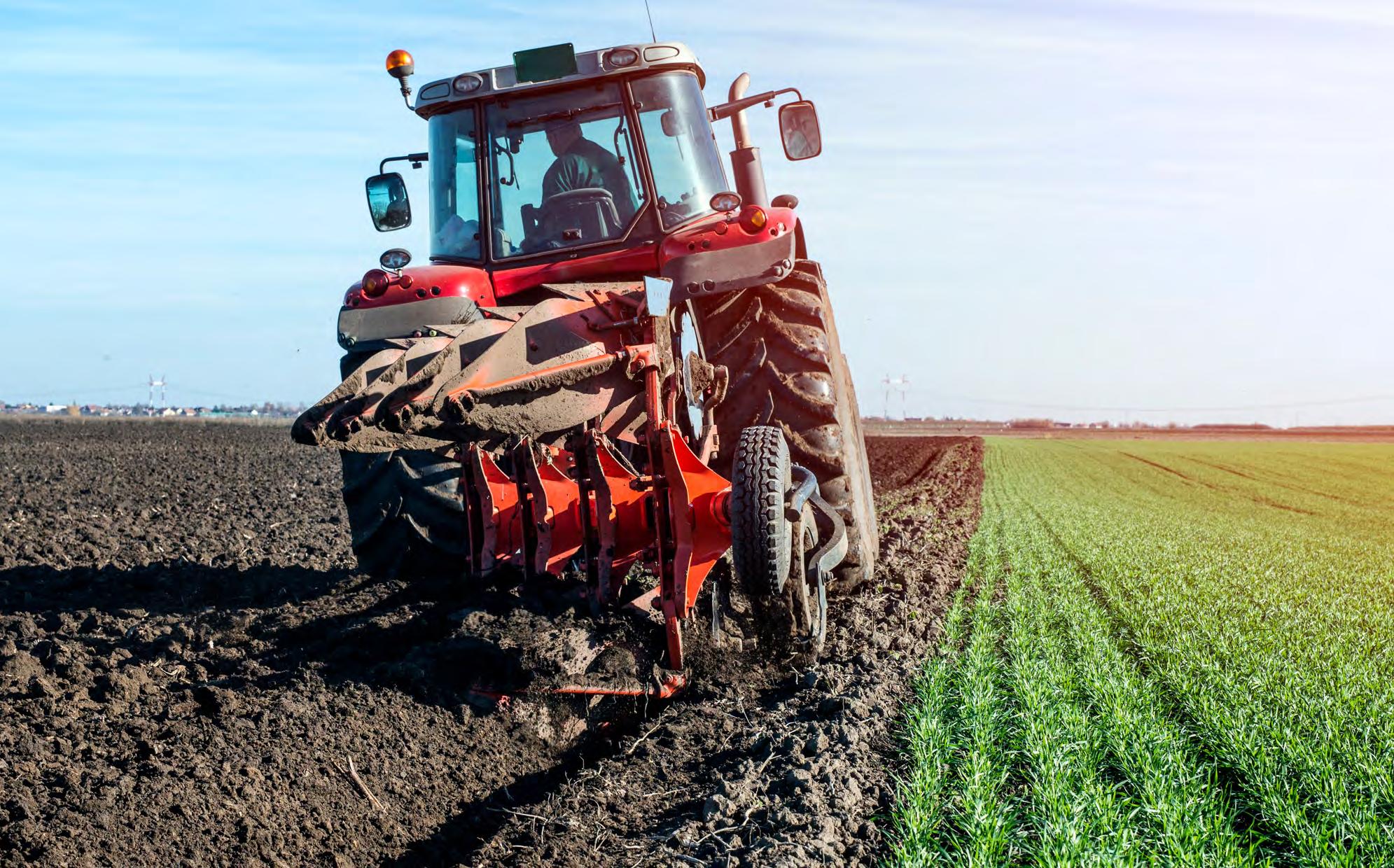
NEFPORT ISSUE 52 – MARCH 2023 87
5 Special Section Agriculture - Perspective from the Ground
Agriculture - Perspectives from the Ground
Agriculture is the primary sector of the Nepali economy, providing a source of income, food, and employment to the majority of the Nepali population. The agriculture sector currently contributes approximately 23.95% to the country's overall Gross Domestic Product (GDP) and employs around 60.4% of the entire population as of FY 2021/22.409 However, since employment in the sector ranges from subsistence to small-scale enterprise farming to seasonal wage work,410 only a fraction of those employed are included in the official labor force. As of FY 2021/22, 81% of employment in agriculture is informal.411 Even within the formal and informal employment sectors, there is a clear gender divide as women have been more engaged in agriculture (mostly unpaid labor work) since decades, mainly attributed to the growing migration of men.412
Likewise, whilst Nepal has a natural comparative advantage because of its distinct agro-climatic zones, rich plains, potential for high-value crop production, and expanding processing industries, the sector is still struggling to position itself as a competitive sector.413 Despite being an agrarian country, the sector is still characterized by subsistence farming, fragmented land holdings, reliance on monsoon rains, and a lack of commercialization. 414 Due to these challenges, the sector has not been able to grow. As a result, food crop yield in Nepal has been declining while imports have been increasing year on year as per the Economic Survey of FY 2021/22. 415 Likewise, agricultural and livestock products worth NPR 288.67 billion were imported, indicating a significant 35% increase over the previous equivalent FY 2020/21, and NPR 44.43 billion in FY 2009/10.416 While the three tiers of the government under the federal structure may benefit the sector in the long term, there are many short term challenges that require immediate attention. Owing to these reasons, the growth of the agriculture sector necessitates interventions in different components and areas that are directly and indirectly related to the sector. Government support and foreign aid continue to provide a wide range of services such as access to finance, insurance, credit, fertilizers, inputs, training, and others. At the same time, private investment in agriculture has also expanded in recent years, with corporations investing in agricultural production, livestock, and food processing. Private firms have, particularly, contributed to the development of value chains, which connect farmers with markets and increases income prospects for rural communities. Similarly, with the gradual adoption of modernized tools, improved seeds, increased access to irrigation, finance and insurance, climate-smart agricultural practices, high-value agricultural product production, and other reforms, the sector has witnessed the growth of agro-processing industries, enterprises, commodity centers, seed banks, gender-responsive budgeting practices and others. Altogether, with more of such effective and timely interventions in place, the agriculture sector has the potential to grow and become resilient in the near future, resulting in developmental outcomes.417
Against this backdrop, NEFPort 52’s special section ‘Agriculture: Perspectives from the Ground’ seeks to provide perspectives on three areas that are interlinked with the sector and can enable sectoral growth. The three areas include private sector’s contribution in the agriculture sector, gender-inclusive agricultural practices, and commercial agriculture enterprise. The intent is not to limit the need for deeper understanding of these three areas only, but rather to assess the strengths, weaknesses, opportunities and inter-connection of these areas to the agriculture sector. Thus, the following sections covering the three areas feature insights, case studies, and broader lessons to be learned from practitioners and experts on the ground.
The role of the private sector in strengthening agriculture
By Neha Thapa, Sr. Area Coordinator, KISAN II Project, CEAPRED
Given the diverse scope of Nepal’s economic system, the private sector plays a critical role in ensuring the agriculture sector’s availability and accessibility. It can support the agriculture industry by providing funding, technology, supply chain management, marketing and branding, and training and education. By working together, the private sector and the agriculture industry can help to improve agricultural practices, increase productivity, and create more sustainable and profitable farming systems. As a result, the agriculture industry has substantially benefited and improved in various ways as a result of its partnerships with various private-sector firms.
The private sector and the
agriculture industry are interconnected in various ways. The private sector supports the agriculture industry through input supply, processing and packaging, marketing and distribution, financing, research and development, and employment. Whereas the agriculture industry provides opportunities for private companies to develop and grow their businesses, while also contributing to sustainable and profitable farming systems. A deeper understanding of this relationship's dynamics can only serve to strengthen it and enable sectoral growth.
Private sector groups have been actively involved in the agriculture industry in several ways. One such way is by creating opportunities and prospects to
increase farming productivity. Laxmi Argo Vet Center, a private sector-led shop for various agro-products in Surkhet, has been providing consultations and advice for several farmers in Thagleni village located in Gurvakot Municipality, Surkhet. By establishing a local farmer’s group called "Hariyali Taja Tarkari Utpadan Krishak Samuha" (Green Fresh Vegetables Producing Farmer's Group) in 2018, the center has been providing training and workshops on smallscale farming and livelihood improvement such as Integrated Pest Management (IPM).
A success story of the Integrated Pest Management (IPM) training is that of 32-year-old Bhumisara Khadka, explained in the box story below.
Betrothed at the tender age of 15 to escape the Maoist conflict, Bhumisara Khadka, now a mother of three, works as an IPM training facilitator for community farming of rice and vegetables. Additionally, she also promotes technology in agriculture techniques like making and using organic pesticides and manure, and IPM instruments usage, while combining cultural practices with the skills and knowledge that she gained from Laxmi Agro Vet Center. Due to her improved knowledge and capabilities, her 2 ropanis of land which she used to cultivate vegetables have expanded to 8 ropanis. She has borrowed money through Community Agriculture Cooperative and the Agricultural Development Bank Limited (ADBL). She also saves a little portion of her monthly income in cooperatives and neighborhood saving organizations to cover her future expenses. With better social, economic, and technical standing, Khadka serves as a beacon of hope and inspiration in her community.

NEFPORT ISSUE 52 – MARCH 2023 89
Devkota Mandi, a vegetable trader from Birendranagar, Surkhet, enters the picture after Laxmi Agro Vet, Agriculture Development Bank, and Community Agricultural Cooperative. This trader, among others, travels to Thagleni to collect fresh vegetables for the market.
This is how the beautiful interplay between different private sector entities like banks, cooperatives, Agro vets, vegetable traders,
and farmers takes place, finally producing a reliable and powerful supply chain. Farmers are aware of where to obtain financing, from whom to purchase agricultural inputs, and to whom to sell. Likewise, financial institutions are aware of the locations and purposes for which they have granted financing. Also, traders are aware of where to get vegetables from and what to expect in terms of their quality. This relationship between
multiple entities gives a lot to ponder for other stakeholders, like municipal, provincial, and federal governments, their agencies, and various development partners, as they try to understand the intricacies and apply them to other regions of the country. Alternatively, perhaps include knowledge derived from this kind of relationship in the formulation of policy. Or, if necessary, make an effort to facilitate this interaction.
DOCKING NEPAL’S ECONOMIC ANALYSIS 90
Promoting Gender-responsive Agriculture System in Nepal
By Sagar GC, Team Leader, Green Karnali Project, LI-BIRD
Gender responsive agriculture system refers to the system where agriculture communities are free of inequalities and agricultural policies, plans and programs, that are designed and formulated, treat men and women equally in terms of decision making, practices, innovation and work benefits.
Gender responsive agriculture is an approach to farming that recognizes and addresses the different needs, preferences, and constraints faced by men and women in agricultural production. It takes into account genderbased differences and promote gender equality as well as women’s empowerment.
Traditional agriculture system in Nepal
Traditional agriculture in Nepal integrates both men and women with defined roles and responsibilities and, thus, reinforces traditional gender roles. Men are accountable for heavy work such as ploughing in the fields, whereas women are confined to smaller but tedious tasks that require more concentration and greater engagement like post-harvest
management and agronomic practices like weeding and sowing.
Likewise, although women play a critical role in agriculture in Nepal, accounting for a significant portion of the agricultural labor force and contributing to food security and rural development, women farmers frequently face numerous challenges, including limited access to land, credit, and inputs and lack of training and education. In addition, more than 90% of male workers migrate within or to other countries in search of employment due to the dearth of respectable non-agricultural jobs in rural areas and to rising household demands, leaving agriculture to women.418 66% of women in the labor force are employed in agriculture compared to 53% of men.419 This trend of departure of men has attributed to increased opportunities for women by redistributing power and allowing them to participate in decisions and behaviors,420 but their low literacy rate has confined their learning capacities. According to countryeconomy.com, 78.59% of men and 59.72% of women are literate out of the total adult
literacy rate of 67.91%.
Collectively, this suggests that “gender-responsiveness” was excluded from policies in the past, resulting in men and women being treated differently, unlike the current state.
Gender-responsive agriculture system in Nepal
Gender-responsive agriculture is crucial for the growth of the agriculture sector in Nepal because it can help increase agricultural productivity, reduce poverty, and improve food security. Recent issues like outmigration, adoption of modern technologies and climate change have cut in the traditional farming system.421 Various agricultural policies, such as the Agricultural Development Strategy (ADS), have made gender-responsive agriculture a priority by fostering the expansion of micro, small, and medium agro-enterprises, especially those run by women and disadvantaged groups. The framework for gender responsive agriculture system adopted in Nepal has been shown in the figure below.

NEFPORT ISSUE 52 – MARCH 2023 91
However, there are certain challenges associated with the implementation of genderresponsive agriculture system.
With the goal of empowering men and women, mechanization in agriculture has begun along with the development of organizations and cooperatives with gendersensitive agriculture projects. Mechanization of agriculture, the adoption of machines and technology to increase efficiency and productivity in farming activities, can significantly lessen the toil of women if genderfriendly tools and technologies are promoted. This can increase the efficiency and productivity of farming activities, leading to higher crop yields and a more effective use of resources. On
the contrary, the introduced agriculture mechanization is incapable of reducing women's workloads because it does not meet the needs of the community and women farmers cannot reap its benefits. The groups formed for empowering farmers are not meeting its objectives. A single individual is involved in more than one group, groups are disorganized and focused only on getting subsidies and support from the government and other stakeholders. They are more engaged in saving and credit than developing it as a learningsharing platform.
If effective implementation of gender-responsive agriculture is carried out, it can help empower women by increasing their
access to resources, improving their decision-making power, and enhancing their status in their communities.
There is also a crucial need to attract young people into the agriculture industry as they are being compelled to leave Nepal for better opportunities. To prevent youth emigration, opportunities for job creation and revenue generation through agricultural enterprise development must be created. The government, development organizations, and other stakeholders working with the groups should have a monitoring and management system in place to prevent duplication of members and reduce mismanagement of resources. Efforts should be made to target
DOCKING NEPAL’S ECONOMIC ANALYSIS 92
Graph prepared by the Author
Figure 26. Framework for Gender Responsive Agriculture system in Nepal
Equality in work beneft
Equality in Policy formulation
Equality in Decision making
Equality in Participation
Equality in Innovation
Equality in Practices
Gender Responsive Agriculture
women's groups, young women, and institutions led by women with capacity-building initiatives that emphasize empowerment, institutional development, entrepreneurship, access to finance, and leveraging resources from the various stakeholders. Consideration must be given to climate change adaptation, mitigation technologies and practices. It is essential to
have an effective policy and implementation in this regard. There should be policy alignment between the three levels of government and other interested parties. With proper research, planning, and budget allocation, appealing policy should be formulated.
One such example of an organization that is working
continuously on genderresponsive agriculture while promoting equality in innovation, practices, participation, work benefit, decision making and policy support is Local Initiatives for Biodiversity, Research and Development (LI-BIRD).
Established in 1995, LI-BIRD is dedicated to improving the lives of smallholder farmers by utilizing local resources, technologies, and institutions for sustainable management of natural resources. Tools and techniques like corn shellers, jab planters, brush cutters, millet threshers, hand sprayers, farm rakes, livestock shed cleaning rakes, sack farming, and drip irrigation have been introduced to both terai and hill farming communities with the goal of reducing the drudgery that falls on women. The organization’s Home Garden concept has saved women's time and eased the burden of providing year-round vegetables for the kitchen as the time they saved was put to good use caring for and bringing their kids to school.
The organization is concentrating on developing the institutional, entrepreneurial, and capacity building of women organizations, young women, and institutions led by women. One example of this is by paying project participants equally for comparable work such as compensating a facilitator for the Farmers Field School (FFS) where both male and female farmers make equal decisions on sowing time and harvesting.
LI-BIRD is considering the gender responsive programs and activities in different strategy and guideline developed at all three tires of government.
Overall, a gender-responsive agriculture system is important for achieving sustainable and inclusive development and ensuring that no one is left behind
in efforts to promote agricultural growth and food security. It seeks to address the genderrelated constraints within the sector and create more equitable
opportunities for women and men in agriculture.
NEFPORT ISSUE 52 – MARCH 2023 93
A Conversation with Yuvraj Gurung about Agri-business in Nepal

The Nepal Economic Forum team conducted an interview with Yuvraj Gurung, the Managing Director of Agro Manang, to gain a deeper understanding of the perspectives of doing business based in agriculture sector in Nepal. The details of the interview are presented below:
What sparked the idea of starting Agro Manang?
Agro Manang is a family business pioneering in high-density apple farming in Manang district of Nepal. Its inception can be traced back two generations, where my grandfather who was the mayor then witnessed a business opportunity in commercializing apple farming in Manang. However, it had not materialized much back then. Likewise, despite not having an agricultural background and having resided in Kathmandu since the age of 13 years, my father, Pholden Chopang Gurung, was always motivated by the desire to repay the community where he came from – Manang. He has sentimental attachment to the area where we harvest apples because it was once a community-run orchard. When we investigated what could be done, the cultivation of saffron, herbs, and apples came to mind.
After further investigation of import data, we determined that apple was the most imported fruit. Even today, around NPR 3 – 4 billion apples are imported annually. This led us to the conclusion that the economics of the apple-growing method in Nepal were untenable, as the world had moved away from traditional farming and adopted new methods. In contrast, our harvests were late and insufficient. This provided us with additional motivation. We soon determined, based on our own research, that we would be able to harvest our first crop of apples in the second year, leading to a full harvest in six to seven years, and thus making it viable for us. In addition, our strategy for growing apples was based on economic considerations, labor distribution, and storage capacities, as we were aware that different varieties of apples have varying needs.
Were there any exemplary cases you observed in Nepal or outside in 2013/14 that inspired you to start Agro Manang?
No, there were no such cases in Nepal or India. Besides Himachal, India doesn’t have a big apple farming community. Compared to those in India, agro-villages in Nepal have limited access to
technology and infrastructure. However, road access improved in Manang which led us to work on apple farming and go forth with the agri-business idea of apples.
How is the market access for agro-businesses in Nepal? How have you been successful in venturing out into different agro-processing industries?
Market access involves trading with low margins and high volumes. There are six to seven apple cartels that monopolize the entire apple industry in Nepal, resulting in a low likelihood of apples finding suitable markets. While we import billions of Nepali Rupees worth of agricultural products for Agro Manang, our annual revenue is only between NPR 40 to NPR 50 million. The revenue is mostly generated by selling between NPR 15 to NPR 20 million worth of apples on the farm. Likewise, the majority of foreign and domestic travelers who visit Manang and Tilicho purchase between 1.5 and 2 kilograms of apples as souvenirs. Moreover, because our apple harvests coincide with the two largest festivals in Nepal, Dashain and Tihar, numerous Manangnative government officials frequently purchase our goods while returning from Manang.
DOCKING NEPAL’S ECONOMIC ANALYSIS 94
In terms of venturing out, infrastructural development and enabling factors are crucial for the growth of agro-businesses. Since the agro-industry in Nepal is still in its infancy (in the case of apples), there are no industries that can absorb unmarketable apples. We face several challenges in the supply chain, as non-marketable apples are not recycled to juice or cider factories, unlike developed nations. Idealistically, 90% of my time and effort at Agro Manang should be devoted to product development, but I am only able to devote 50% due to the fact that I am constantly occupied with addressing issues relating to roads, supply chain issues, fertilizers, electricity, and government policies. In order to operate our tea houses and production facility, we even had to develop our own electric power through a micro hydropower plant. In 2015, I also self-educated and conducted research on fertilizers, packaging, and pesticides. As a result, we have established a separate company called Manang Beverages to address many of these market issues.
How has the agro-processing industries contributed to employment, technology, and social impact?
Agro Manang has been able to create socio-economic impacts, especially through employment and trainings. We educate the community about emerging farming trends, provide them with inputs, linkages and technical
knowledge, thus leading to a guaranteed income as long as they produce apples. Having said this, a major challenge has been the scarcity of skilled labor in Manang, leading us to employ people from Lamjung, Gorkha, and other neighboring districts. Likewise, another challenge is that the amount of revenue that farmers are able to generate from the same parcel of apples and grains is vastly different as government subsidies for grains are significantly higher. Similarly, inadequate arable land is also a significant problem for us.
How was your experience working with the federalized government and its policies back then?
Our experience has shown that working with federalized governments is easier than working with projects. With projects, one must adhere to the guidelines and formats, such as maintaining balance sheets, cash flows, profits, statements, and reports. Farmers who depend on a third party may face communication issues with the project consultant/team because of their inexperience and unfamiliarity with market research and technicalities of report submission. In contrast, local governments inspect the area after farmers apply for grants and then distribute subsidies, making the process simpler and more transparent. However, there are certain challenges to this as well. For instance, despite the government's desire
for commercial entities to take over agriculture, its plans and programs are geared toward small farmers, resulting in contradictory policies and lack of understanding about ground realities.
What roles have subsidy technology played in your business? What do you suggest other farmers to do?
Subsidies have played a pivotal role for Agro Manang. Over the years, we have advocated for increased government subsidies. My second project received more subsidies than my first one in which the subsidies were granted from the High Mountain Agribusiness and Livelihood Improvement (HIMALI) Project, funded by the Asian Development Bank (ADB) (ADB). Currently, local, provincial, and federal governments are all focused on agro-farming and provide subsidies. This year and last, the province of Gandaki provided a 75% subsidy on cheese, which was greater than what we had received from HIMALI. They are also providing 50% subsidies on fencing, 50% on trellising, and 50% on irrigation systems. I advise farmers to utilize these as opposed to investing solely on their own due to the excessive capital expenditures.
Similarly, the old technology that we utilized could plant approximately 16 trees, whereas the new technology can plant approximately 10 times higher, thereby increasing the planting density by a factor of 10. However, along with this, the investment
NEFPORT ISSUE 52 – MARCH 2023 95
also increases exponentially and the quality is not at par with imports.
Can you give us a comparable picture of your imports and exports?
In the case of Agro Manang, all of the high-density apple trees are imported, majorly from Italy, Turkey and other European countries. Italy holds roughly over 95% market share in terms of imports. In contrast, we do not have any exports due to our relatively low production and restrictive policies. For instance, the wine production laws of Nepal state that one kilogram of apples can produce 1.5 liters of wine, which is unlikely and must be revised as wine production varies by fruit. We have future plans to penetrate in a niche market for wines priced NPR 5,000 to NPR 10,000 per bottle, but it appears challenging in absence of applespecific laws. This also hinders our export plans.
Do you see a possibility for agro-tourism in Nepal?
Agro Manang farm is built in a way that everything is around the corner – the winery and resort. The resort, Bhratang Farmhouse,
is termed as a luxury agro-resort in the scenic Bhratang of Manang district, which offers heated rooms with private bathrooms, dining room, fireplace, sauna, dormitory and others. Our focus is in generating revenue from the resort, and to be able to create a small wine-tasting room in the coming year. We believe that schools can organize their excursions around this area as well as treat it as a recreational place for breaks from their long treks in the mountains.
As much as we believe in the high potential for agro-tourism in Nepal, the prospects seem challenging for us since the proximity from the capital, Kathmandu, till Manang district is far.
Has digitization been applied to any aspect of your business? If not, can it aid your business?
While technology has made it easier to plant around 10 trees in 1 anna, which is a 900% increase from 1 tree per anna, the practices of digitization are yet to be observed. We have an interconnected farm with a technical system that can provide information about the ground conditions and is
accessible via smart phones. Even so, we need personnel to monitor the system. Therefore, if five to six micro weather stations can be established, it would be advantageous to provide farmers with disease and weather alerts via WhatsApp or any other means. Similarly, farmers currently use YouTube to gain access to training and knowledge, but a Manang-specific app would be even more useful.
What are your suggestions for new farmers who intend to be involved in agro-processing?
As we have limited human capital and land to farm, the selection of a crop should make the most sense for the farmer. When selecting apples, I considered their economic value, import scenario, and potential for growth. Understanding the market and the consumption pattern of fruits is preferable as well. Avocados and dragon fruits are only popular in Kathmandu or major districts, which is why one should refrain from investing in it majorly unless appropriate varieties of such fruits can reach the market. Additionally, standardization and product branding are equally crucial.
DOCKING NEPAL’S ECONOMIC ANALYSIS 96
Endnotes
1 “Press Freedom Index”, Reporters without Borders, March 7, 2023. https://rsf.org/en/country/nepal
2 “2023 Index of Economic Freedom”, Heritage. org, March 7, 2023. https://www.heritage.org/index/ country/nepal#:~:text=Nepal's%20economic%20 freedom%20score%20is,the%20world%20and%20 regional%20averages.
3 “Global Data”, Fragilestakesindex.org, March 7, 2023. https://fragilestatesindex.org/global-data/
4 “Corruption Perception Index”, Transparency International, March 7, 2023. https://www.transparency. org/en/cpi/2022
5 “Poudel, Santosh Sharma. “Pushpa Kamal Dahal Heads New Government in Nepal”, December 27, 2022. https://thediplomat.com/2022/12/pushpa-kamal-dahalheads-new-government-in-nepal/
6 Mulmi, Amish Raj. “A plot twist makes Pushpa Kamal Dahal prime minister of Nepal”, Himal Southasian, December 28, 2023. https://www.himalmag.com/nepalelection-pushpa-kamal-dahal-prime-minister-2022/
7 “Prime Minister Pushpa Kamal Dahal secures vote of confidence”, The Kathmandu Post, January 10, 2023. https://kathmandupost.com/national/2023/01/10/ prime-minister-pushpa-kamal-dahal-secures-vote-ofconfidence
8 Ghimire, Binod. “Is Congress the main opposition? It’s Speaker’s call”, The Kathmandu Post, January 23, 2023. https://kathmandupost.com/ politics/2023/01/23/is-congress-the-main-oppositionit-s-speaker-s-call
9 “Rabi Lamichhane found guilty in citizenship case”, Khabarhub, January 27, 2023. https://english. khabarhub.com/2023/27/290943/
10 “The Curious Case of Rabi Lamichhane”, MyRepublica, January 31, 2023. https://myrepublica. nagariknetwork.com/news/the-curious-case-of-rabilamichhane/
11 “Rastriya Swatantra Party to leave government”, Online Khabar, February 5, 2023. https://english. onlinekhabar.com/rastriya-swatantra-party-out-govt. html
12 “Rastriya Prajatantra Party quits government”, The Kathmandu Post, February 25, 2023. https:// kathmandupost.com/national/2023/02/25/rastriyaprajatantra-party-exits-government
13 “RPP ministers quit government”, Nepal News, February 25, 2023. https://nepalnews.com/s/nation/rpp-
ministers-quit-government
14 https://thehimalayantimes.com/nepal/umlwithdraws-support-to-government
15 Prasain, Sangam. “Nepal downsizes budget as revenue collection plunges”, The Kathmandu Post, February 12, 2023. https://kathmandupost.com/ money/2023/02/12/nepal-downsizes-budget-asrevenue-collection-plunges
16 Ibid.
17 Ibid.
18 “Ex-speaker Agni Sapkota's son appointed as foreign affairs advisor to PM Dahal “, MyRepublica, February 21, 2023. https://myrepublica.nagariknetwork. com/news/agni-sapkota-s-son-appointed-as-foreignaffairs-advisor-to-the-prime-minister/
19 “House regulation drafting committee agrees to not suspend accused lawmakers until found guilty”, The Kathmandu Post, February 10, 2023. https:// kathmandupost.com/national/2023/02/10/houseregulation-drafting-committee-agrees-to-notsuspend-accused-lawmakers-until-found-guilty
20 “By-election in Chitwan-2 scheduled for April 23”, The Kathmandu Post, February 12, 2023. https:// kathmandupost.com/national/2023/02/12/electioncommission-announces-chitwan-2-by-election-onapril-23
21 Ibid.
22 “Chitwan-2 By-Election on April 23”, Online Khabar, February 12, 2023. https://english.onlinekhabar. com/chitwan-2-by-election-on-april.html
23 “Code of Conduct for President, Vice President elections comes into effect from today”, MyRepublica, March 1,2023. https://myrepublica.nagariknetwork.com/ news/code-of-conduct-for-president-vice-presidentelections-comes-into-effect-from-today/
24 Ibid.
25 “Paudel elected as Nepal’s third president”, MyRepublica, March 10, 2023. https://myrepublica. nagariknetwork.com/news/paudel-elected-as-nepal-sthird-president/
26 Khatiwada, Nishan. “Paudel caps his career with presidency”, The Kathmandu Post, March 10, 2023. https://kathmandupost.com/national/2023/03/10/ paudel-caps-his-career-with-presidency
27 “India pledges grant amount of Rs 8.8 billion
NEFPORT ISSUE 52 – MARCH 2023 97
to Nepal for FY 2023/24, an increase of 29.41 percent”, MyRepublica, February 2, 2023. https://myrepublica. nagariknetwork.com/news/india-pledges-grantamount-of-rs-8-8-billion-to-nepal-for-fy-2023-24an-increase-of-29-41-percent/
28 “USAID announces assistance of nearly $60 million to Nepal”, The Rising Nepal, February 7, 2023. https://risingnepaldaily.com/news/22467
29 “USAID Deepens Democratic Partnership with the Government and People of Nepal”, USAID, February 7, 2023. https://www.usaid.gov/news-information/pressreleases/feb-07-2023-usaid-deepens-democraticpartnership-government-and-people-nepal
30 “Govt expects to receive Rs 66bn in budgetary support from development partners”, The Annapurna Express, February 17, 2023. https://theannapurnaexpress. com/news/govt-expects-to-receive-rs-66bn-inbudgetary-support-from-development-partners-38478
31 https://theannapurnaexpress.com/news/govtexpects-to-receive-rs-66bn-in-budgetary-supportfrom-development-partners-38478
32 “Province 1 officially named as Koshi Province amid protest”, MyRepublica, March 1, 2023. https:// myrepublica.nagariknetwork.com/news/province-1officially-named-as-koshi-province/
33 Ibid.
34 Sah, Deo Narayan. “It’s Koshi. Province 1 gets its name, finally”, The Kathmandu Post, March 1, 2023. https://kathmandupost.com/province-no-1/2023/03/01/ province-1-assembly-endorses-koshi-as-the-name-ofthe-province-by-majority-votes
35 “Provinces spending in the first half of current FY disappointing”, The Annapurna Express, February 23, 2023. https://theannapurnaexpress.com/news/ provinces-spending-in-the-first-half-of-current-fydisappointing-38708
36 https://theannapurnaexpress.com/news/govtexpects-to-receive-rs-66bn-in-budgetary-supportfrom-development-partners-38478
37 “Global inflation will fall in 2023 and 2024 amid subpar economic growth” IMF. https://www.imf.org/en/ Publications/WEO/Issues/2023/01/31/world-economicoutlook-update-january-2023
38 “Global Inflation Tracker Q1 2023: Inflationary Pressures Abate but Emerging Markets Remain Under Pressure,” Euromonitor International. https://www. euromonitor.com/article/global-inflation-tracker-q12023-inflationary-pressures-abate-but-emergingmarkets-remain-under-pressure
39 “Global MPI 2022”, OPHI. https://ophi.org.uk/ global-mpi-2022/
40 “World Population”, Macrotrends. https://www.
macrotrends.net/countries/WLD/world/population
41 “World Food Price Index”, Trading Economics. https://tradingeconomics.com/world/food-price-index
42 Chan, Terry. “Global Debt Leverage: Is a Great Reset Coming?,” S&P Global, https://www.spglobal.com/ en/research-insights/featured/special-editorial/lookforward/global-debt-leverage-is-a-great-reset-coming
43 “Pulse of Global Crisis”, United Nations Conference on Trade And Development. https://unctad. org/global-crisis
44 Ibid
45 Ibid
46 Holder, Josh. “Tracking Coronavirus Vaccinations Around the World,” The New York Times, https://www.nytimes.com/interactive/2021/world/covidvaccinations-tracker.html
47 “Global Economic Prospects: Sharp, LongLasting Slowdown to Hit Developing Countries Hard,” World Bank. https://www.worldbank.org/en/news/pressrelease/2023/01/10/global-economic-prospects.
48 Gourinchas, Pierre-Olivier. “Global Economy to Slow Further Amid Signs of Resilience and China Re-opening,” IMF Blog, https://www.imf.org/en/Blogs/ Articles/2023/01/30/global-economy-to-slow-furtheramid-signs-of-resilience-and-china-re-opening
49 “Global Economic Prospects: Sharp, LongLasting Slowdown to Hit Developing Countries Hard,” World Bank. https://www.worldbank.org/en/news/pressrelease/2023/01/10/global-economic-prospects.
50 “Global inflation will fall in 2023 and 2024 amid subpar economic growth,” World Bank. https://www.imf. org/en/Publications/WEO/Issues/2023/01/31/worldeconomic-outlook-update-january-2023
51 “IMF: World economic outlook is starting to recover,” World Economic Forum. https://www.weforum. org/agenda/2023/02/imf-global-growth-forecastinflation-cools-inflation/
52 Shine, Ian. “IMF raises global growth forecasts for 2023 and other economy stories you need to read this week,” World Economic Forum, https://www. weforum.org/agenda/2023/02/imf-raises-growthforecasts-for-2023-and-other-economy-stories-3february/
53 Cox, Jeff. “Fed raises interest rates half a point to highest level in 15 years,” CNBC News, https:// www.cnbc.com/2022/12/14/fed-rate-decisiondecember-2022.html
54 Sherman, Natalie. “Does easing US inflation point the way for the world?,” BBC News, https://www. bbc.com/news/business-64030276
DOCKING NEPAL’S ECONOMIC ANALYSIS 98
55 Bloomberg, William. “World economy faces growing headwind of services-trade barriers”, The Economic Times, https://economictimes.indiatimes. com/small-biz/trade/exports/insights/world-economyfaces-growing-headwind-of-services-trade-barriers/ articleshow/97935509.cms
56 Linna, Lydia. “IMF projects higher-thanexpected global growth of 2.9% in 2023”, Delano, https:// delano.lu/article/imf-projects-higher-than-expec
57 Kok, Xinghui. “IMF lifts 2023 growth forecast on China reopening, strength in U.S., Europe”, Reuters, https://www.reuters.com/markets/imf-lifts-2023growth-forecast-china-reopening-strength-useurope-2023-01-31/
58 “Trade growth to slow sharply in 2023 as global economy faces strong headwinds,” WTO. https://www. wto.org/english/news_e/pres22_e/pr909_e.htm.
59 “IFC Launches $2 Billion Response Package to Support Ukrainian Private Sector,” IFC. https://pressroom. ifc.org/all/pages/PressDetail.aspx?ID=27338.
60 “IFC’s Economic Resilience Action Program for Ukraine,” IFC. https://www.ifc.org/wps/wcm/connect/ region__ext_content/ifc_external_corporate_site/ europe+and+central+asia/priorities/strategicframework-ukraine.
61 “International trade faces a stagnant decade lagging the world economy,” Business Standard. https:// www.business-standard.com/article/international/ international-trade-faces-a-stagnant-decade-laggingthe-world-economy-123011700320_1.html.
62 Wintour, Patrick. “The sanctions war against Russia: a year of playing cat and mouse”, The Guardian, https://www.theguardian.com/world/2023/feb/20/ sanctions-war-russia-ukraine-year-on-vladimir-putin
63 Velloor, Ravi. “BCG’s consultants are on a roll in AI, sustainability”, The Straits Times, https://www. straitstimes.com/business/invest/bcg-s-consultantsare-on-a-roll-in-ai-sustainability
64 “India-China trade at $135.98 bn in 2022. Trade deficit crosses $100 bn mark,” Business Standard. https://www.business-standard.com/article/economypolicy/india-china-trade-at-all-time-high-but-deficitover-100-billion-mark-123011300551_1.html
65 “Despite Frosty Relations, India's Trade With China Reaches Record Levels,” The Wire. https://thewire. in/trade/india-china-trade-deficit-2022-importsexports
66 Annath, Krishnan. “India’s imports from China reach record high in 2022, trade deficit surges beyond $100 billion”, The Hindu, https://www.thehindu.com/ news/international/indias-imports-from-china-reachrecord-high-in-2022-trade-deficit-surges-beyond100-billion/article66372861.ece
67 “Trade Deficit Between India, China Falls To $51.5 Billion This Fiscal,” NDTV. https://www.ndtv.com/ business/trade-deficit-between-india-china-falls-to51-5-billion-this-fiscal-3592924
68 “Trade and Economic Relations: Bilateral Commercial Brief,” Embassy of India in China. https:// www.eoibeijing.gov.in/eoibejing_pages/MjQ,
69 “India-China Trade Touches All-Time High Of $135.98 Billion In 2022,” BQ Prime. https://www.bqprime. com/business/india-china-trade-climbs-to-13598billion-in-2022-trade-deficit-crosses-100-billion-forfirst-time
70 Ibid
71 “The Global Risks Report 2023 18th Edition,” World Economic Forum. https://www3.weforum.org/ docs/WEF_Global_Risks_Report_2023.pdf
72 Ibid
73 “The World Development Report 2023: Migrants, Refugees, and Societies,” World Bank Group. https://www.worldbank.org/en/publication/wdr2023
77 Mikhaylova, Anna. “Impact of Cross-Border Tourism on the Sustainable Development of Rural Areas in the Russian–Polish and Russian–Kazakh Borderlands”, The MDPI, https://www.mdpi.com/2071-1050/14/4/2409
78 “The Global Wage Report 2022-23,” ILO. https://www.ilo.org/digitalguides/en-gb/story/ globalwagereport2022-23#intro
79 Ibid
80 “Global Trade Update (December 2022),” The United Nations Conference on Trade and Development. https://unctad.org/publication/global-trade-updatedecember-2022
81 Ibid
82 “Development Co-operation Report 2023: Debating the Aid System,” OECD. https://www.oecd.org/ dac/development-co-operation-report-20747721.htm
83 “Electricity Market Report 2023,” IEA. https:// www.iea.org/reports/electricity-market-report-2023
84 Evans, Simon. “Renewables will be world’s top electricity source within three years, IEA data reveals”, World Economic Forum, https://www.weforum.org/ agenda/2023/02/renewables-world-top-electricitysource-data/
85 “Renewables to dominate growth of global electricity supply: IEA report,” ANI. https://www.
NEFPORT ISSUE 52 – MARCH 2023 99
74 Ibid
75 Ibid
76 Ibid
aninews.in/news/business/business/renewables-todominate-growth-of-global-electricity-supply-ieareport20230220112802/
86 “Davos 2023: Key takeaways from the World Economic Forum,” Reuters. https://www.reuters.com/ business/davos-2023-key-takeaways-world-economicforum-2023-01-20/
87 Francis, Tracy. “Why Davos matters more than ever”, Mckinsey & Company, https://www.mckinsey.com/ featured-insights/world-economic-forum/why-davosmatters-more-than-ever
88 Mark, John. “Davos 2023: Outlook brighter than feared, fraught with risks”, Reuters, https://www.reuters. com/world/davos-2023-outlook-brighter-than-fearedfraught-with-risks-2023-01-20/
89 Kumar, Manoj. “India's Budget 2023 highlights”, Reuters, https://www.reuters.com/world/india/indiaunveils-202324-budget-support-growth-amid-fiscalconstraints-2023-02-01/
90 “Union Budget,” Government of India. https:// www.indiabudget.gov.in/
91 Ibid
92 Michaelson, Ruth. “Earthquake in Turkey and Syria kills thousands and devastates cities”, The Guardian, https://www.theguardian.com/world/2023/ feb/06/turkey-earthquake-2023-gaziantep
93 Hallam, Jonny. “Magnitude 6.3 aftershock strikes southern Turkey, killing 6 and injuring hundreds 2 weeks after massive quake killed thousands”, CNN Global, https://edition.cnn.com/2023/02/20/middleeast/ turkey-quake-aftershock-intl/index.html
94 Iordache, Ruxandra. “Turkey-Syria reconstruction costs to come to ‘billions of dollars”, CNBC News, https://www.cnbc.com/2023/02/13/turkeysyria-reconstruction-costs-to-come-to-billions-ofdollars-world-bank-says.html
95 Barber, Regina. “After another earthquake in Turkey, what scientists know about aftershocks”, NPR, https://www.npr.org/2023/02/20/1158432074/afteranother-earthquake-in-turkey-what-scientists-knowabout-aftershocks
96 Rosario, Regina Do. “Turkey earthquake could result in loss of up to 1% of country's GDP in 2023”, Reuters, https://www.reuters.com/world/middle-east/ turkey-earthquake-could-result-loss-up-1-countrysgdp-2023-2023-02-16/
97 ‘Current Macroeconomic and Financial Situation (based on eleven months’ data ending midOctober 2022/23)’, Nepal Rastra Bank, November 16, 2022, https://www.nrb.org.np/red/currentmacroeconomic-and-financial-situation-tables-basedon-three-months-data-of-2022-23/
98 ‘Current Macroeconomic and Financial Situation (based on eleven months’ data ending midJune 2021/22)’, Nepal Rastra Bank, August 16, 2022, https://www.nrb.org.np/contents/uploads/2022/08/ Current-Macroeconomic-and-Financial-SituationEnglish-Based-on-Annual-data-of-2021.22-1.pdf
99 There are four quarters in one fiscal year in Nepal. Namely, first quarter (Q1) covers mid-July to midOctober, second quarter (Q2) covers mid-October to mid-January, third quarter (Q3) covers mid-January to mid-April and fourth quarter (Q4) covers mid-April to mid-July. According to Nepal Rastra Bank, the growth rate shows growth from previous quarter i.e., growth in Q2 is based on Q1, growth in Q3 is based on Q2, growth in Q3 is based on Q4 and growth in Q4 is based on Q1. 100 ‘Quarterly GDP’, Nepal Rastra Bank, January 2023, https://www.nrb.org.np/database-on-nepaleseeconomy/real-sector/
101 Ibid
102 ‘Nepal Development Update’, The World Bank, October 6, 2022, https://thedocs.worldbank.org/en/doc/ a27ca3a08e77befb785fc6742708a56c-0310012022/ original/Nepal-Development-Update-October-2022.pdf
103 ‘Current Macroeconomic and Financial Situation (based on six months’ data ending midJanuary 2022/23)’, Nepal Rastra Bank, February 6, 2023, https://www.nrb.org.np/contents/uploads/2023/02/ Current-Macroeconomic-and-Financial-SituationEnglish-Based-on-Six-Months-data-of-2022.23.pdf
104 Prasain, Sangam. ‘Nepal’s inflation hit 74-month high in September’, The Kathmandu Post, October 21, 2022, https://tkpo.st/3TBHgpI
105 ‘Inflation Expectations Survey’, Nepal Rastra Bank, February 15, 2023, https://www.nrb.org.np/ contents/uploads/2023/02/IESN-Report-2079-80Q2. pdf
106 ‘Consumer Price Index (CPI) Definition and Formula’, Investopedia, accessed on August 19, 2021. Retrieved from- https://www.investopedia.com/terms/c/ consumerpriceindex.asp#:~:text=The%20Consumer%20 Price%20Index%20(CPI,of%20goods%20and%20 averaging%20them.
107 Banton, Caroline. ‘Basket of Goods’, Investopedia, accessed on November 26, 2021. Retrieved from- https://www.investopedia.com/terms/b/ basket_of_goods.asp#:~:text=What%20Is%20a%20 Basket%20of,basis%2C%20often%20monthly%20 or%20annually.&text=A%20basket%20of%20goods%20 is,consumer%20price%20index%20(CPI)
108 ‘Current Macroeconomic and Financial Situation (based on six months’ data ending midJanuary 2022/23)’, Nepal Rastra Bank, February 6, 2023, https://www.nrb.org.np/contents/uploads/2023/02/ Current-Macroeconomic-and-Financial-Situation-
DOCKING NEPAL’S ECONOMIC ANALYSIS 100
English-Based-on-Six-Months-data-of-2022.23.pdf
109 ‘IMF projects Nepal’s economy to grow at 4.2’, Nepal live today, October 24, 2022, https://www. nepallivetoday.com/2022/10/24/imf-projects-nepalseconomy-to-grow-at-4-2/
110 Lama, Kiran. ‘Govt preparing to hike milk price by Rs 10 per litre’, The Himalayan Times, February 20, 2023, https://thehimalayantimes.com/nepal/govtpreparing-to-hike-milk-price-by-rs-10-per-litre
111 Gupta, Ashish. ‘Key highlights of Budget 2022/23’, Nepal Economic Forum, June 1, 2022, https:// nepaleconomicforum.org/key-highlights-of-budget2022-23/#:~:text=The%20Government%20of%20 Nepal%20(GoN,upcoming%20fiscal%20year%20 2022%2D23
112 ‘Half-yearly budget review of FY 2022/23’, Ministry of Finance, February 2023.
113 Ibid
114 Ibid
115 ‘Half-yearly budget review of FY 2022/23’, Ministry of Finance, February 2023.
116 ‘Current Macroeconomic and Financial Situation (based on six months’ data ending midJanuary 2022/23)’, Nepal Rastra Bank, February 6, 2023, https://www.nrb.org.np/contents/uploads/2023/02/ Current-Macroeconomic-and-Financial-SituationEnglish-Based-on-Six-Months-data-of-2022.23.pdf
117 ‘Nefport 50: LDC Graduation and Beyond’, Nepal Economic Forum, Issue 50, Pg: 78 – 83, September 2022, https://media.thuprai.com/book/pdfs/NEFJournal_Issue50_Web_compressed_FINAL.pdf
118 Purbey, Anmol. ‘Looking for a better and sustainable alternative to grants and loans? Go for FDI’, Nepal Live Today, December 1, 2022, https://www. nepallivetoday.com/2022/12/01/looking-for-a-betterand-sustainable-alternative-to-grants-and-loans-gofor-fdi/
119 ‘Aid management information system for Nepal’, Ministry of Finance, accessed on March 7, 2023, https://amis.mof.gov.np/AMP-portlet/api/dashboard
120 ‘Aid management information system for Nepal’, Ministry of Finance, 2022, https://amis.mof.gov. np/AMP-portlet/api/dashboard
121 ‘European Union provides Rs 27 million as humanitarian funding assistance’, The Kathmandu Post, December 6, 2022, https://tkpo.st/3F9EFh0
122 Ibid
123 Shrestha, Prithvi Man. ‘South Korea plans to increase aid to Nepal’, The Kathmandu Post, February 14, 2023, https://kathmandupost.com/money/2023/02/14/
south-korea-plans-to-increase-aid-to-nepal
124 Ibid
125 ‘UNDP partners with Chinese NGO for the first time in Nepal’, The Kathmandu Post, December 17, 2021, https://kathmandupost.com/national/2022/12/17/undppartners-with-chinese-ngo-for-the-first-time-in-nepal
126 Ibid
127 Ibid
128 Shrestha, Pemba. ‘Nepal: IMF Reaches StaffLevel Agreement on the First and Second Reviews under the Extended Credit Facility and Concludes the 2023 Article IV Consultation’, International Monetary Fund, Press Release, February 28, 2023, https://www.imf.org/ en/News/Articles/2023/02/28/mcs-022823-nepalimf-reaches-sla-first-second-reviews-under-ecfconcludes-2023-art-iv-consultation#:~:text=IMF%20 staff%20and%20the%20Nepal,approved%20by%20 the%20Executive%20Board
129 ‘IMF Executive Board Approves US$395.9
Million ECF Arrangement for Nepal’, International Monetary Fund, Press Release, January 13, 2022, https:// www.imf.org/en/News/Articles/2022/01/13/pr2206nepal-imf-executive-board-approves-us-million-ecfarrangement
130 Shrestha, Pemba. ‘Nepal: IMF Reaches StaffLevel Agreement on the First and Second Reviews under the Extended Credit Facility and Concludes the 2023 Article IV Consultation’, International Monetary Fund, Press Release, February 28, 2023, https://www.imf.org/ en/News/Articles/2023/02/28/mcs-022823-nepalimf-reaches-sla-first-second-reviews-under-ecfconcludes-2023-art-iv-consultation#:~:text=IMF%20 staff%20and%20the%20Nepal,approved%20by%20 the%20Executive%20Board
131 Ibid
132 ‘Nepal to take loan worth Rs 1.19 billion from ADB for Rural Roads Improvement Program’, Khabarhub, February 15, 2023, https://english.khabarhub. com/2023/15/293279/
133 Ibid
134 Ibid
135 ‘Nepal, World Bank launch USD 100m water sector governance and infrastructure support project’, Nepal Live Today, February 10, 2023, https://www. nepallivetoday.com/2023/02/10/nepal-world-banklaunch-usd-100m-water-sector-governance-andinfrastructure-support-project/
136 ‘Agricultural Development Strategy (2015-2035), Ministry of Agricultural Development, Government of Nepal, https://faolex.fao.org/docs/pdf/ nep171433.pdf
NEFPORT ISSUE 52 – MARCH 2023 101
137 Urpilainen, Jutta. ‘Nepal and EU fight food insecurity together’, Nepal Live Today, February 8, 2023, https://www.nepallivetoday.com/2023/02/08/nepaland-eu-fight-food-insecurity-together/
138 Ibid
139 ‘USAID deepens democratic partnership with the government and people of Nepal’, Nepal Live Today, February 7, 2023, https://www.nepallivetoday. com/2023/02/07/usaid-deepens-democraticpartnership-with-the-government-and-people-ofnepal/
140 Ibid
141 ‘Japan provides financial assistance for new turmeric processing center in Pyuthan’, Khabarhub, December 9, 2022, https://myrepublica.nagariknetwork. com/news/japan-provides-financial-assistance-fornew-turmeric-processing-center-in-pyuthan/
142 Ibid
143 ‘Nepal to receive USD 200 million concessional loan from ADB’, Khabarhub, December 27, 2022, https:// english.khabarhub.com/2022/27/286680/
144 Ibid
145 Ibid
146 Shrestha, Prithvi Man. ‘Nepal receives just around half of the committed foreign loans’, The Kathmandu Post, November 10, 2021, https://bit. ly/30gt6V5
147 ‘Half-yearly budget review of FY 2022/23’, Ministry of Finance, February 2023.
148 Ibid
149 ‘Current Macroeconomic and Financial Situation (based on six months’ data ending midJanuary 2022/23)’, Nepal Rastra Bank, February 6, 2023, https://www.nrb.org.np/contents/uploads/2023/02/ Current-Macroeconomic-and-Financial-SituationEnglish-Based-on-Six-Months-data-of-2022.23.pdf
150 Mainali, Shyam Prasad. ‘Utilising Remittances For Development’, The Rising Nepal, February 4, 2023, https://risingnepaldaily.com/news/22306
151 ‘Current Macroeconomic and Financial Situation (based on six months’ data ending midJanuary 2022/23)’, Nepal Rastra Bank, February 6, 2023, https://www.nrb.org.np/contents/uploads/2023/02/ Current-Macroeconomic-and-Financial-SituationEnglish-Based-on-Six-Months-data-of-2022.23.pdf
152 ‘Remittance inflows to Nepal up by record 20 percent’, The Kathmandu Post, December 15, 2022, https://tkpo.st/3FWgcOb
154 Ibid
155 ‘Remittances Brave Global Headwinds – Special Focus: Climate Migration’, Migration and Remittances Team, Migration and Development Brief 37, World Bank, November 2022, https://www.knomad.org/sites/default/ files/2022-11/migration_and_development_brief_37_ nov_2022.pdf
156 Pandey, Pawan. ‘Nepal squanders overseas seasonal work opportunities’, The Kathmandu Post, March 2, 2023, https://kathmandupost.com/ money/2023/03/02/nepal-fails-to-capitalise-onoverseas-seasonal-work-opportunities
157 Ibid
158 Pandey, Pawan. ’UK may not hire Nepali seasonal workers this year’, The Kathmandu Post, January 29, 2023, https://kathmandupost.com/ money/2023/01/29/uk-may-not-hire-nepali-seasonalworkers-this-year
159 Ibid
160 Pandey, Pawan. ‘Nepal asks Malaysia to apply ‘zero-cost’ migration policy’, The Kathmandu Post, February 3, 2023, https://tkpo.st/3WWAdJH
161 Ibid
162 Ibid
163 ‘Nepali migrant workers to benefit from basic salary hike in South Korea’, The Kathmandu Post, January 3, 2023, https://tkpo.st/3WZnPZB
164 Ibid
165 Recruitment Advisor, ‘Who we are’, accessed on March 2023, https://www.recruitmentadvisor.org/ about-us
166 ‘Nepal is a champion country for fair recruitment, but on paper only, observers say’, The Kathmandu Post, January 30, 2023, https:// kathmandupost.com/money/2023/01/30/nepal-is-achampion-country-for-fair-recruitment-but-on-paperonly-observers-say
167 Ibid
168 Ibid
169 ‘Nefport 51: Fostering Entrepreneurial Ecosystem in Nepal’, Nepal Economic Forum, Issue 51, Pg: 28 – 29, December 2022, https://media.thuprai.com/ book/pdfs/Nefport_51_-_Fostering_Entrepreneurial_ Ecosystem_in_Nepal.pdf
170 Pandey, Pawan. ‘World Cup behind the scenes: Workers get raw deal’, The Kathmandu Post, November 12, 2022, https://tkpo.st/3Tw2eWw
171 Ibid
153 Ibid
DOCKING NEPAL’S ECONOMIC ANALYSIS 102
172 ‘FIFA misleading the world on compensation to migrant workers, say four global rights organisations’, The Kathmandu Post, December 12, 2022, https://tkpo. st/3Pzj5Yt
173 Ibid
174 ‘Current Macroeconomic and Financial Situation (based on six months’ data ending midJanuary 2022/23)’, Nepal Rastra Bank, February 6, 2023, https://www.nrb.org.np/contents/uploads/2023/02/ Current-Macroeconomic-and-Financial-SituationEnglish-Based-on-Six-Months-data-of-2022.23.pdf
175 Ibid
176 ‘Remittance inflows jump 24 percent to Rs585.08 billion’, The Kathmandu Post, February 6, 2023, https://tkpo.st/3JF9iit
177 Prasain, Krishana. ‘Nepal's central bank continues policy of controlling credit expansion’, The Kathmandu Post, February 10, 2023, https:// kathmandupost.com/money/2023/02/10/nepal-scentral-bank-continues-policy-of-controlling-creditexpansion
178 Adhikari, Dadhi. ‘Unravelling the current economic situation in Nepal’, Observer Research Foundation, June 15, 2022, https://www.orfonline.org/ expert-speak/unravelling-the-current-economicsituation-in-nepal/
179 ‘Current Macroeconomic and Financial Situation (based on six months’ data ending midJanuary 2022/23)’, Nepal Rastra Bank, February 6, 2023, https://www.nrb.org.np/contents/uploads/2023/02/ Current-Macroeconomic-and-Financial-SituationEnglish-Based-on-Six-Months-data-of-2022.23.pdf
Situation (based on six months’ data ending midJanuary 2022/23)’, Nepal Rastra Bank, February 6, 2023, https://www.nrb.org.np/contents/uploads/2023/02/ Current-Macroeconomic-and-Financial-SituationEnglish-Based-on-Six-Months-data-of-2022.23.pdf
189 Ibid
190 Ibid
191 ‘Current Macroeconomic and Financial Situation (based on six months’ data ending midJanuary 2022/23)’, Nepal Rastra Bank, February 6, 2023, https://www.nrb.org.np/contents/uploads/2023/02/ Current-Macroeconomic-and-Financial-SituationEnglish-Based-on-Six-Months-data-of-2022.23.pdf
192 Ibid
193 Nepal Rastra Bank. 2023. Current Macroeconomic and Financial Situation of Nepal. Nepal Rastra Bank. Accessed March 7, 2023. https:// www.nrb.org.np/contents/uploads/2023/02/ Current-Macroeconomic-and-Financial-SituationEnglish-Based-on-Six-Months-data-of-2022.23. pdf#:~:text=Reserves%20held%20by%20banks%20 and,percent%20in%20mid%2D%20January%202023.
185 Ibid
186 ‘Nepal Gazette’, Department of Printing, Ministry of Information and Communication Technology, April 26, 2022, http://rajpatra.dop.gov.np/welcome/ book/?ref=24936
187 Prasain, Krishana. ‘Nepal's central bank continues policy of controlling credit expansion’, The Kathmandu Post, February 10, 2023, https:// kathmandupost.com/money/2023/02/10/nepal-scentral-bank-continues-policy-of-controlling-creditexpansion
188 ‘Current Macroeconomic and Financial
203 Department of Customs. 2023. Foreign Trade Data. Department of Customs. Accessed March 7, 2023. https://www.customs.gov.np/page/fts-fy-207980
211 My Republica. 2022. Nepal grows 6.94 percent more paddy, still faces shortfall of 480,000 tons this year. December 30. Accessed March 7, 2023. https://
NEFPORT ISSUE 52 – MARCH 2023 103
Ibid
180 Ibid 181 Ibid 182
183 Ibid 184 Ibid
194 lbid. 195 lbid. 196 lbid. 197 lbid. 198 lbid. 199 lbid. 200 lbid. 201 lbid. 202 lbid.
204 lbid. 205 lbid. 206 lbid. 207 lbid. 208 lbid. 209 lbid. 210 lbid.
myrepublica.nagariknetwork.com/news/nepal-grows-694-percent-more-paddy-still-faces-shortfall-of-480000-tons-this-year/
212 lbid.
213 The Kathmandu Post. 2022. Farmers likely to harvest 5.48 million tonnes of paddy. December 29. Accessed March 7, 2023. https://kathmandupost.com/ money/2022/12/29/nepali-farmers-likely-to-harvest-548-million-tonnes-of-paddy
214 My Republica. 2022. Farmers still waiting for chemical fertilizers. November 29. Accessed March 7, 2023. https://myrepublica.nagariknetwork.com/news/ farmers-still-waiting-for-chemical-fertilizers/.
215 The Kathmandu Post. 2023. Nepal implements new safety standards for various foods. January 4. Accessed March 7, 2023. https://kathmandupost.com/ money/2023/01/04/nepal-implements-new-safetystandards-for-various-foods
216 The Kathmandu post. 2023. 85 percent of flour mills shut after India restricted wheat export. January 27. Accessed March 7, 2023. https://kathmandupost.com/ money/2023/01/27/85-percent-of-flour-mills-shutafter-india-restricted-wheat-export
217 The Himalayan Times. 2022. India's wheat export ban weighs on Nepali industries. November 29. Accessed March 7, 2023. https://thehimalayantimes. com/business/indias-wheat-export-ban-weighs-onnepali-industries.
218 Khabarhub. 2023. Parbat exports orange worth around Rs 300 million. February 20. Accessed March 7, 2023. https://english.khabarhub.com/2023/20/293993/.
219 “Exports by Commodity Based on First Seven(Shrawan-Magh) of FY 2079/80 (Mid July 2022 to Mid February 2023)”, Department of Customs, March 1, 2023. https://customs.gov.np/page/fts-fy-207980
220 The Himalayan Times. 2023. Tea worth Rs 38 million exported. February 7. Accessed March 7, 2023. https://thehimalayantimes.com/business/tea-worth-rs38-million-exported
221 lbid.
222 Khabarhub. 2023. Lalbandi exports agricultural produce worth over Rs 1 billion in seven months. February 23. Accessed March 7, 2023. https://english. khabarhub.com/2023/23/294409/
223 The Rising Nepal. 27. Cows imported from South Korea distributed to farmers. December 2022. Accessed March 7, 2023. https://www.risingnepaldaily. com/news/20627#:~:text=The%20cows%20 obtained%20from%20Heifer,the%20breed%20and%20 protect%20them
224 The Kathmandu Post. 2022. With Holstein cows, Sindhuli looks to boost dairy sector. December 31.
Accessed March 7, 2023. https://kathmandupost.com/ money/2022/12/30/sindhuli-expects-to-transformdairy-industry-with-high-quality-cows
225 Nepal Rastra Bank. 2023. Current Macroeconomic and Financial Situation of Nepal. Nepal Rastra Bank. Accessed March 7, 2023. https:// www.nrb.org.np/contents/uploads/2023/02/ Current-Macroeconomic-and-Financial-SituationEnglish-Based-on-Six-Months-data-of-2022.23. pdf#:~:text=Reserves%20held%20by%20banks%20 and,percent%20in%20mid%2D%20January%202023
226 lbid.
227 Reuters. 2023. Nepal detects H5N1 bird flu on farm, WOAH says. February 6. Accessed March 7, 2023. https://www.reuters.com/world/asia-pacific/nepaldetects-h5n1-bird-flu-farm-woah-says-2023-02-06/.
228 Annapurna Express. 2023. Farmers get grant for milk production. February 21. Accessed March 7, 2023. https://theannapurnaexpress.com/news/farmers-getgrant-for-milk-production-38627
229 IFAD. 2023. IFAD to support loan and grant to enhance sustainable agricultural growth in Nepal. February 25. Accessed March 7, 2023. https://www.ifad. org/en/web/latest/-/news/ifad-to-support-loan-andgrant-to-enhance-sustainable-agricultural-growth-innepal
230 Khabarhub. 2023. National agriculture census reaches final stage. January 7. Accessed March 7, 2023. https://english.khabarhub.com/2023/07/288100/
231 “Nepal Foreign Trade Statistics Based on First Four(Shrawan-Kartik) of FY 2079/80 (Mid July 2022 to Mid November 2022)”. Department of Customs.
232 “Monthly Operational Report for the Month of Magh 2079”, Nepal Electricity Authority, March 1, 2023
233 “Half Yearly Budget Review Report 2079/80”, Ministry of Finance.
234 “Monthly Operational Report for the Month of Magh 2079”, Nepal Electricity Authority, March 1, 2023
235 ibid
236 ibid
237 “Energy Details”, Nepal Electricity Authority, March 1, 2023. https://nea.org.np/
238 “Automobiles major contributor to Valley’s air pollution: Dept of Environment”, Khabarhub, December 27, 2022. https://english.khabarhub. com/2022/27/286635/
239 “41 percent of vehicles fail pollution test”, MyRepublica, December 27, 2022. https://myrepublica. nagariknetwork.com/news/41-percent-of-vehicles-failpollution-test/
DOCKING NEPAL’S ECONOMIC ANALYSIS 104
240 Department of Customs, March 1, 2023. https:// customs.gov.np/page/fts-fy-207980
241 Prasain, Krishna. “Electric vehicle imports seesaw as government policy fluctuates”, The Kathmandu Post, August 8, 2022. https://kathmandupost.com/ money/2022/08/08/electric-vehicle-imports-see-sawas-government-policy-fluctuates
242 Pandey, Pawan. “Illegal crushers allowed to run temporarily as construction projects come to halt”, The Kathmandu Post, January 25, 2023. https:// kathmandupost.com/money/2023/01/25/illegalcrusher-plants-allowed-to-operate-temporarily-asconstruction-projects-come-to-halt
243 “IBN Again calls EOI for Feasibility study of eBRT in Kathmandu Ring Road”, The Annapurna Express, February 6, 2023. https://theannapurnaexpress.com/ news/ibn-again-calls-eoi-for-feasibility-study-of-ebrtin-kathmandu-ring-road-38006
244 “Request for EOI (REOI) of Feasibility Study for the Development, Operation and Management of Electric Bus Rapid Transit (eBRT) in Ring Road(NH39)”, Investment Board of Nepal, February 5, 2023. https:// ibn.gov.np/ibn-notices/details/request-for-eoi-reoi-offeasibility-study-for-the-development-operation-andmanagement-of-electric-bus-rapid-transit-ebrt-inring-roadnh39-9052
245 “EIC expresses interest in 635 MW Dudhkoshi Reservoir Project”, February 8, 2023. https://theannapurnaexpress.com/news/eibexpresses-interest-in-635-mw-dudhkoshi-reservoirproject-38086
246 “Sharp Fall in Power Generation Forces NEA to Import over 500 MW of Electricity from India”, THe Annapurna Express, February 16, 2023. https:// theannapurnaexpress.com/news/sharp-fall-in-powergeneration-forces-nea-to-import-over-500-mw-ofelectricity-from-india-38415
247 Shrestha, Prithvi Man. “Amid slump in power generation, NEA reduces supply to industrial sector”, The Kathmandu Post, February 7, 2023. https:// kathmandupost.com/national/2023/02/07/amidslump-in-power-generation-nea-reduces-supply-toindustrial-sector
248 Rasaili, Samjhana & Singh, Basanta Pratap. “Access tunner of 140 MW Tanahun hydro project built”, The Kathmandu Post, February 20, 2023. https:// kathmandupost.com/money/2023/02/20/accesstunnel-of-140-mw-tanahu-hydro-project-built
249 “140 MW anahun Hydropower project makes breakthrough in its access tunnel”, February 3, 2023. https://myrepublica.nagariknetwork.com/news/140-mwtanahun-hydropower-project-makes-breakthroughin-its-access-tunnel/#:~:text=KATHMANDU%2C%20 Feb%203%3A%20The%20140,its%20diameter%20is%20 seven%20meters.
250 “NEA to reopen PPA with RoR hydel projects”, The Himalayan Times, February 11, 2023. https:// thehimalayantimes.com/nepal/nea-to-reopen-ppawith-ror-hydel-projects
251 “NEA decides to sign PPAs for 1500MW non-storage projects”, The Kathmandu Post, February 10, 2023. https://kathmandupost.com/ national/2023/02/10/nea-decides-to-sign-ppaswith-developers-of-1500mw-run-of-the-river-hydelprojects#:~:text=The%20Nepal%20Electricity%20 Authority%20has,power%20monopoly%20to%20do%20 so.
252 “SC order against extending term of GMR Upper Karnali hydropower in Nepal”, Business Standard, November 4, 2022. https://www.business-standard. com/article/companies/sc-order-against-extendingterm-of-gmr-upper-karnali-hydropower-innepal-122110301992_1.html
253 “Indian officials raise concern over Upper Karnali project”, The Annapurna Express, February 22, 2023, https://theannapurnaexpress.com/news/ indian-officials-raise-concern-over-upper-karnaliproject-38690
254 Shrestha, Prithvi Man. “Government wants top court to vacate its interim order on Upper Karnali Hydropower Project”, The Kathmandu Post, December 12, 2022. https://kathmandupost.com/national/2022/12/12/ government-wants-top-court-to-vacate-its-interimorder-on-upper-karnali-hydropower-project
255 urjakhabar.
256 “Solar Power Producer’s demand Rs 7.30 per unit rate”, Nepal Infrastructure, December 20, 2022. https://nepalinfrastructure.com/9298/
257 “NEA Lowers PPA Rate of Energy Produced by Solar Plants”, New Business Age, March 15, 2022. https:// www.newbusinessage.com/Articles/view/14933
258 “Solar power developers demand NEA to return to old PPA rate”, The Annapurna Express, December 20, 2022. https://theannapurnaexpress.com/news/solarpower-developers-demand-nea-to-return-to-old-pparate-35800
259 “Nepal plans to export electricity from Likhu-4 to Bangladesh”, The Annapurna Express, February 22, 2023. https://theannapurnaexpress.com/news/ nepal-plans-to-export-electricity-from-likhu-4-tobangladesh-38695
260 “Proposal to sell electricity from Likhu-4 to Bangladesh”, Himal Sanchar, February 21, 2023. https:// himalsanchar.com/proposal-to-sell-electricity-fromlikhu-4-to-bangladesh/
261 https://theannapurnaexpress.com/news/sixhours-daily-power-cut-in-industrial-areas-37529
NEFPORT ISSUE 52 – MARCH 2023 105
262 Shrestha, Prithvi Man. “Amid slump in power generation, NEA reduces supply to industrial sector”, The Kathmandu Post, February 7, 2023. https:// kathmandupost.com/national/2023/02/07/amidslump-in-power-generation-nea-reduces-supply-toindustrial-sector
263 “Nepal-India agrees to import-export more electricity”, Nepal News, February 19, 2023. https:// nepalnews.com/index.php/s/nation/nepal-india-agreesto-import-export-more-electricity
264 Shrestha, Prithvi Man. “Nepali and Chinese officials discuss power trade”, The Kathmandu Post, February 24, 2023. https://kathmandupost.com/ national/2023/02/24/nepali-and-chinese-officialsdiscuss-power-trade
265 “Electricity leakage plugged to 12 percent”, The Kathmandu Post, January 19 2023. https:// kathmandupost.com/money/2023/01/19/hedelectricity-leakage-plugged-to-12-percent
266 Ministry of Physical Infrastructure and Transport. 2023. "Annual Report." February 15. http:// www.mopit.gov.np/actsdetail/9/2018/93442849/.
267 lbid.
268 lbid.
269 lbid.
270 Yadav, Upendra. 2023. Construction of Motihari-Amlekhganj petroleum pipeline reaches final stage. February 26. https://myrepublica.nagariknetwork. com/news/construction-of-motihari-amlekhganjpetroleum-pipeline-reaches-final-stage/.
271 Dhungana, Madhav. 2023. Construction of integrated check post at the Sunauli-Bhairahawa border begins. February 9. doi:https://kathmandupost.com/ money/2023/02/09/construction-of-integrated-checkpost-at-the-sunauli-bhairahawa-border-begins.
272 The Nepalese Voice. 2022. Proposed DodharaChandani dry port contributes to increased economic activities. December 11. https://nepalesevoice.com/ nepal/proposed-dodhara-chandani-dry-portcontributes-to-increased-economic-activities/.
273 myRepublica. 2023. Jorpati-Sundarijal road expansion drive comes closer to completion. February 27. https://myrepublica.nagariknetwork.com/news/ jorpati-sundarijal-road-expansion-drive-comingcloser-to-completion/.
275 myRepublica. 2023. Construction of 19 mega projects in limbo in Myagdi. February 5. https:// myrepublica.nagariknetwork.com/news/construction-of19-mega-projects-in-limbo-in-myagdi/.
276 Lamsal, Himal. 2023. Bheri Babai sees only 59 percent progress in 11 years. February 7. doi:https:// myrepublica.nagariknetwork.com/news/bheri-babaisees-only-59-percent-of-construction-in-11-years/.
277 Nepal Telecommunications Authority. November 2022– December 2022. MIS Report. Nepal Telecommunications Authority. Accessed March 3, 2023. https://nta.gov.np/wp-content/uploads/2023/03/MISMangsir-2079.pdf.
278 lbid.
279 lbid.
280 lbid.
281 Nepal Rastra Bank. 2023. Current Macroeconomic and Financial Situation of Nepal. Nepal Rastra Bank. Accessed March 3, 2023. https:// www.nrb.org.np/contents/uploads/2023/02/CurrentMacroeconomic-and-Financial-Situation-EnglishBased-on-Six-Months-data-of-2022.23.pdf.
282 Nepal Rastra Bank. 2023. Payment Oversight Report. Nepal Rastra Bank. Accessed March 3, 2023. https://www.nrb.org.np/contents/ uploads/2023/02/2079_09_P-S-Indicators-of-Poush-. pdf
283 The Kathmandu Post. 2022. Nepal ranks way down in digital entrepreneurship and innovation. December 21. Accessed March 3, 2023. https:// kathmandupost.com/money/2022/12/21/nepal-ranksway-down-in-digital-entrepreneurship-and-innovation
284 The Himalayan Times. 2023. Provision of compensation for internet users. February 28. Accessed March 3, 2023. https://thehimalayantimes.com/nepal/ provision-of-compensation-for-internet-users
285 Nepali Telecom. 2023. Number of Fiber Internet Users Crosses 2.3 Million. January 15. Accessed March 3, 2023. https://www.nepalitelecom.com/internet-usersisp-in-nepal.
286 Nepal Telecom Authority. 2023. "Notification regarding the issuance of Telecommunication Service Quality Regulations, 2079." Nepal Telecom Authority, February 27. Accessed March 3, 2023. https://nta.gov.np/ en/notice-nta-qos-bylaw-2079/
274 myRepublica. 2023. Melamchi water distribution in locations outside the ring road of the Valley will cost Rs 23 billion. February 21. https:// myrepublica.nagariknetwork.com/news/melamchiwater-distribution-in-locations-outside-the-ring-roadof-the-valley-will-cost-rs-23-billion/.
287 Nepali telecom. 2023. Nepal Mobile Distributors Association Urges Swift MDMS Implementation in Nepal. February 8. Accessed March 3, 2023. https:// www.nepalitelecom.com/nepal-mobile-distributorsassociation-requests-mdms-implementation
DOCKING NEPAL’S ECONOMIC ANALYSIS 106
288 Nepal Telecom Authority. 2023. "Interim Directives related to Inflight Communication (IFC) Services." February 23. Accessed March 3, 2023. https:// nta.gov.np/wp-content/uploads/2023/02/InterimDirectives-related-to-IFC-Services.pdf
289 Nepali Telecom. 2023. Ntc Fiber connects more remote districts in Karnali province. February 13. Accessed March 3, 2023. https://www.nepalitelecom. com/2023/02/ntc-fiber-in-karnali-province.html
290 Ministry of Finance. “Budget Speech of Fiscal Year 2022/23,” Government of Nepal, 2022. https://mof. gov.np/site/publication-detail/3185
291 Ibid
292 Ibid
293 Ibid
294 Ibid
295 Ibid
https://thehimalayantimes.com/nepal/studentsdeprived-of-secondary-education
303 “Why There Is Always A Shortage of Books At Schools In Karnali?” The Nepali Post. January 12, 2023. https://thenepalipost.com/details/29211
304 “Textbook Shortage Causes Challenges for Students in Himali Districts of Karnali Province,” Collegenp. February 15, 2023. https://www.collegenp. com/news/textbook-shortage-causes-challenges-forstudents-in-himali-districts-of-karnali-province/
305 Maharjan, Uttam. “Tackle Textbook Shortage Effectively,” The Rising Nepal. January 24, 2023. https:// www.risingnepaldaily.com/news/21809
306 “Govt tells schools to not give entrance exams for class 1 admission,” Online Khabar. January 13, 2023. https://english.onlinekhabar.com/dont-give-entranceexams-class-1.html
296
“University of Nepal taking shape,” The Annapurna Express. February 16, 2023. https:// theannapurnaexpress.com/news/university-of-nepaltaking-shape-38453
297 “Bill to form Nepal University lands in House committee,” The Kathmandu Post. February 25, 2023. https://kathmandupost.com/national/2023/02/25/billto-form-nepal-university-lands-in-house-committee
298 “Matribhumi Library comes into operation in Syangja village,” Online Khabar. January 29, 2023. https:// english.onlinekhabar.com/matribhumi-library-syangjaopens.html
299 “Nepal: Japan Assists Construction of Matribhumi Community Library,” Telegraphnepal. January 30, 2023. https://www.telegraphnepal.com/ nepal-japan-assists-construction-of-matribhumicommunity-library/
300 “Japanese extends support to construct library in Sunsari district,” My Republica. December 24, 2023. https://myrepublica.nagariknetwork.com/news/ japanese-extends-support-to-construct-library-insunsari-district/
301 “Physical infrastructures, labs being constructed in 143 schools in Baglung,” Khabarhub. December 10, 2022. https://english.khabarhub. com/2022/10/284440/
302 Bhatta, Tika Prasad. “Students of Hulakdanda see no recourse but to quit studies after Grade 8,” The Kathmandu Post. January 21, 2023. https:// kathmandupost.com/national/2023/01/21/students-ofhulakdanda-see-no-recourse-but-to-quit-studiesafter-grade-8; “Students deprived of secondary education,” The Himalayan Times. January 30, 2023.
307 “CEHRD Prohibited Entrance Exam for Admission to Class 1,” Collegenp. January 19, 2023. https://www.collegenp.com/news/cehrd-prohibitedentrance-exam-for-admission-to-class-1/
308 Rauniyar, Rubi. “Eight months on, TU shows no sign of publishing results,” My Republica. December 20, 2022. https://myrepublica.nagariknetwork.com/news/ eight-months-on-tu-shows-no-sign-of-publishingresults/
309 Awale, Sonia. “Nepal’s hard working students overseas,” December 17, 2022. https://www.nepalitimes. com/banner/nepals-hard-working-students-overseas/
310 “ANNFSU padlocks TU’s Examination Controller’s Office,” My Republica. January 10, 2023. https://myrepublica.nagariknetwork.com/news/annfsupadlocks-tu-s-examination-controller-s-office/
311 “Policy-level Priority and Common Minimum Program of Government of Nepal,” Government of Nepal. January 10, 2023. https://www.opmcm.gov.np/
312 Ghimire, Binod. “Nepal fails yet again to achieve total literacy target,” The Kathmandu Post. January 14, 2023. https://tkpo.st/3CLF5tP
313 Himalayan News Service. “UNICEF and the Government of Finland continue their partnership to support the education sector of Nepal,” UNICEF. December 22, 2022. https://www.unicef.org/nepal/ press-releases/unicef-and-government-finlandcontinue-their-partnership-support-educationsector#:~:text=Finland%20is%20committing%204.2%20 million,enhance%20quality%20services%20for%20 children.
314 “ADB Approves $200 Million Loan to Strengthen Education System in Nepal,” Asian Development Bank. December 6, 2022. https://www.adb. org/news/adb-approves-200-million-loan-strengthen-
NEFPORT ISSUE 52 – MARCH 2023 107
education-system-nepal
315 Bhatta, Tika Prasad. “Midday meal scheme fails to dissuade Ramechhap students from junk food,” The Kathmandu Post. December 12, 2022. https://tkpo. st/3UN5CNl
316 Strategic Investment Research Unit. “Budget 2023: Major Impetus to India’s Education Sector,” Invest India. February 1, 2023. https://www.investindia.gov. in/team-india-blogs/budget-2023-major-impetusindias-education-sector#:~:text=The%20education%20 sector%20has%20received,)%20crore%20in%20 2023%2D24.
317 Minister of Finance, “Budget Speech 2023–24 of Nirmala Sitharaman,” Government of India. February 1, 2023. https://www.indiabudget.gov.in/doc/budget_ speech.pdf
318 Ministry of Finance, “Budget Speech of Fiscal Year 2022/23,” Government of Nepal. 2022. https:// www.mof.gov.np/uploads/document/file/1656476715_ Budget%20Translation%20031379%20cv.pdf
319 Minister of Finance, “Budget Speech 2023–24 of Nirmala Sitharaman,” Government of India. February 1, 2023. https://www.indiabudget.gov.in/doc/budget_ speech.pdf
320 Himalayan New Service, “Irregularities rampant in community schools,” The Himalayan Times. December 31, 2022. https://thehimalayantimes.com/nepal/ irregularities-rampant-in-community-schools
321 Ministry of Health and Population. “Nepal Demographic and Health Survey 2022 Key Indicators Report,” Government of Nepal. November 24, 2022. https://mohp.gov.np/uploads/Resources/Nepal%20 Demographic%20and%20Health%20Survey%20 2022%20Key%20Indicators%20Report.pdf
328 “Nepal receives 345,600 doses of PfizerBioNTech’s bivalent Covid-19 vaccine,” The Kathmandu Post. February 10, 2023. https://kathmandupost.com/ health/2023/02/13/nepal-receives-345-600-doses-ofpfizer-biontech-s-bivalent-covid-19-vaccine
329 Poudel, Arjun. “Nepal grants emergency use approval to Pfizer-BioNTech’s bivalent vaccine,” The Kathmandu Post. December 28, 2022. https:// kathmandupost.com/health/2022/12/28/nepal-grantsemergency-use-approval-to-pfizer-biontech-sbivalent-vaccine
330 Ministry of Health and Population. “Situation Report.” COVID-19 Dashboard. Government of Nepal, February 21, 2023. https://covid19.mohp.gov.np/covid/ englishSituationReport/63f4a4d08137d_SitRep1108_ COVID-19_21-02-2023_EN.pdf
331 Poudel, Arjun. “No Covid vaccines in stock, but officials urge all to get boosters,” The Kathmandu Post. January 2, 2023. https://tkpo.st/3Z0ZHHY
332 Poudel, Arjun. “People over 55, other priority groups to get Covid booster shots,” The Kathmandu Post. February 20, 2023. https://kathmandupost.com/ health/2023/02/20/people-over-55-other-prioritygroups-to-get-covid-booster-shots
333 Poudel, Arjun. “Government doesn’t have Covid boosters for people going abroad,” The Kathmandu Post. February 27, 2023. https://kathmandupost.com/ health/2023/02/27/government-doesn-t-have-covidboosters-for-people-going-abroad
334 Poudel, Arjun. “Measles cases reported in provinces east to west,” The Kathmandu Post. February 10, 2023. https://kathmandupost.com/ health/2023/02/10/measles-cases-reported-inprovinces-east-to-west
335 Poudel, Arjun. “Health officials seek religious leaders’ help in Banke measles vaccination drive,” The Kathmandu Post. January 22, 2023. https:// kathmandupost.com/health/2023/01/22/healthofficials-seek-religious-leaders-help-in-bankemeasles-vaccination-drive
325 Ministry of Health and Population. “Situation Report.” COVID-19 Dashboard. Government of Nepal, February 21, 2023. https://covid19.mohp.gov.np/covid/ englishSituationReport/63f4a4d08137d_SitRep1108_ COVID-19_21-02-2023_EN.pdf
326 Ministry of Health and Population. “Public Health Facilities.” Department of Health Services (Public Health Facilities). Accessed March 1, 2023. https://dohs. gov.np/hospitals/public-hospitals/.
327 Poudel, Arjun. “Government doesn’t have Covid boosters for people going abroad,” The Kathmandu Post. February 27, 2023. https://kathmandupost.com/ health/2023/02/27/government-doesn-t-have-covidboosters-for-people-going-abroad
336 Poudel, Arjun. “Thousands of 12-23 month olds deprived of vaccines,” The Kathmandu Post. December 12, 2022. https://tkpo.st/3HtmmX5
337 Poudel, Arjun. “Budget cuts for mosquito nets and testing kits stymie Nepal’s fight against malaria,” The Kathmandu Post. February 13, 2023. https:// kathmandupost.com/health/2023/02/13/budget-cutsfor-mosquito-nets-and-testing-kits-stymie-nepal-sfight-against-malaria
338 Poudel, Arjun. “Open border with India big challenge in meeting malaria elimination goal,” The Kathmandu Post. January 25, 2023. https:// kathmandupost.com/health/2023/01/25/openborder-with-india-big-challenge-in-meeting-malaria-
DOCKING NEPAL’S ECONOMIC ANALYSIS 108
322 Ibid 323 Ibid 324 Ibid
elimination-goal
339 Poudel, Arjun. “Ministry, division give varying data on dengue toll,” The Kathmandu Post. January 9, 2023. https://tkpo.st/3QmjLAI
340 “Nepal’s dengue outbreak exposes climate risk,” Nepali Times, November 29, 2022. https://www. nepalitimes.com/latest/nepals-dengue-outbreakexposes-climate-risk/
341 Poudel, Arjun. “Nepal disease control body to study high dengue mortality,” The Kathmandu Post. December 2, 2022. https://tkpo.st/3VsbRrh
342 Poudel, Arjun. “Over 5,000 girls of 11-13 years in Chitwan receive HPV vaccine,” The Kathmandu Post. March 1, 2023. https://tkpo.st/3miIsmM
343 “Drug regulatory body bans import of medicines from 16 Indian companies,” The Kathmandu Post. December 20, 2022. https://kathmandupost.com/ health/2022/12/20/drug-regulatory-body-bans-importof-medicines-from-16-indian-companies
344 “Medicines: Good manufacturing practices,” World Health Organization. Accessed on March 3, 2023. https://www.who.int/news-room/questionsand-answers/item/medicines-good-manufacturingprocesses#:~:text=What%20is%20GMP%3F-,Good%20 manufacturing%20practice%20(GMP)%20is%20a%20 system%20for%20ensuring%20that,through%20 testing%20the%20final%20product
345 Ministry of Health and Population. “Nepal Demographic and Health Survey 2022 Key Indicators Report,” Government of Nepal. November 24, 2022. https://mohp.gov.np/uploads/Resources/Nepal%20 Demographic%20and%20Health%20Survey%20 2022%20Key%20Indicators%20Report.pdf
346 Poudel, Arjun. “Thousands of women skip routine maternity services,” The Kathmandu Post. February 22, 2023. https://kathmandupost.com/ health/2023/02/22/thousands-of-women-skip-routinematernity-services
347 Poudel, Arjun. “Call for better surveillance amid rising maternal deaths,” The Kathmandu Post. February 28, 2023. https://kathmandupost.com/ health/2023/02/28/call-for-better-surveillance-amidrising-maternal-deaths
348 Poudel, Arjun. “Kanti Hospital adds intensive care units, sets up kangaroo mother care beds,” The Kathmandu Post. December 22, 2022. https:// kathmandupost.com/health/2022/12/22/kanti-hospitaladds-intensive-care-units-sets-up-kangaroo-mothercare-beds
349 Ministry of Health and Population. “Nepal Demographic and Health Survey 2022 Key Indicators Report,” Government of Nepal. November 24, 2022. https://mohp.gov.np/uploads/Resources/Nepal%20
Demographic%20and%20Health%20Survey%20 2022%20Key%20Indicators%20Report.pdf
350 Singh, Basanta Pratap. “Specialist services for pregnant women begins at Kolti Primary Health Centre,” The Kathmandu Post. December 21, 2022. https:// kathmandupost.com/health/2022/12/21/specialistservices-for-pregnant-women-begins-at-kolti-primaryhealth-centre
351 Poudel, Arjun. “Chopper permit hassles costing lives in Gorkha,” The Kathmandu Post. December 30, 2022.
https://kathmandupost.com/health/2022/12/30/ chopper-permit-hassles-costing-lives-in-gorkha
352 Current Macroeconomic and Financial Situation Table Based on 6 Months of Data, Nepal Rastra Bank, Feb 06, 2023. https://www.nrb.org.np/
Macroeconomic and Financial Situation Table Based on 6 Months of Data, Nepal Rastra Bank, November 15, 2022. https://www.nrb.org.np/
366 Ibid
367 "Nepal Country Profile." Government of India, July 2014,”https://www.mea.gov.in/Portal/ ForeignRelation/Nepal_July_2014_.pdf”
368 “Over 600,000 foreigners visit Nepal in 2022 as tourism industry rebounds”, my República, January 4, 2023, https://myrepublica.nagariknetwork.com/news/ over-600-000-foreigners-visit-nepal-in-2022-astourism-industry-rebounds/
369 "Welcoming Chinese Tourists." The Kathmandu Post, January 8, 2023, https://kathmandupost.com/ columns/2023/01/08/welcoming-chinese-tourists
370 Ibid
NEFPORT ISSUE 52 – MARCH 2023 109
353 Ibid 354 Ibid 355 Ibid 356 Ibid 357 Ibid 358 Economic Survey – 2021/22, Ministry of Finance, Government of Nepal, 2022. https://mof.gov.np/ 359 Ibid 360 Ibid 361 Ibid 362 Ibid 363 Ibid 364 Ibid
365 Current
371 “Nepals new law requires all foreign trekkers to hire a guide”, Outside Online, March 6, 2023, https:// www.outsideonline.com/adventure-travel/newsanalysis/nepal-backpacking-hiking-trekking-tourism/
372 Ibid
373 Ibid
374 Ibid
375 “Hotel Yak and Yeti instructed to halt operations”, English Khabarhub (website), February 9, 2022, https://english.khabarhub.com/2022/09/236523/
376 "Kathmandu's Posh Hotels Are Once Again Making Money," The Kathmandu Post (website), December 24, 2022, https://kathmandupost.com/ money/2022/12/24/kathmandu-s-posh-hotels-areonce-again-making-money
377 Ibid
378 Ibid
379 Ibid
380 “About Us” Yeti Airlines, https://www.yetiairlines. com/content/
381 "At least 50 dead after Nepal's Yeti Airlines plane crashes." CNN, 15 Jan. 2023, https://edition.cnn. com/2023/01/15/asia/nepal-yeti-airlines-crash-intl-hnk/ index.html
382 "Pilot Error in Yeti Airlines Tragedy in Nepal." Airline Ratings, 26 Sept. 2020, https://www.airlineratings. com/news/pilot-error-in-yeti-airlines-tragedy-in-nepal/
383 “French expert team begins probe into Yeti Airlines’ plane crash in Pokhara” The Hindu, 2022, February 8, https://www.thehindu.com/news/ international/french-expert-team-begins-probe-intoyeti-airlines-plane-crash-in-pokhara/article66404131.
ece
384 “Number of air passengers and flights take a nosedive after air crash”, My Republica, January 26, 2023, https://myrepublica.nagariknetwork.com/ news/number-of-air-passengers-and-flights-take-anosedive-after-air-crash/?categoryId=81.
385 “Yeti Air plane crash major blow to tourism industry: TAAN”, Khabarhub, 16 January 2023, https:// english.khabarhub.com/2023/16/289401/
386 "Bensley and Shinta Mani team up for new luxury hotel in Nepal." Globetrender, February 23, 2023, https://globetrender-com.cdn.ampproject.org/c/s/ globetrender.com/2023/02/23/bensley-shinta-manimustang-hotel-nepal/amp/?fbclid=IwAR0Osl354EuwcKLzqR-Imychf7rtFqt5KdpTjVMHUoRDoLQ1jWuRo AF-jU
387 “Tourism History in Nepal”, Explore Himalaya,
November 21, 2017, https://www.explorehimalaya.com/ tourism-history-nepal/
388 “Govt Prepares stratergic action plan for Visit Nepal Decade”, Onlinekhabar, 23 December, 2023, https://english.onlinekhabar.com/action-plan-visitnepal-decade.html
389 "Visit Nepal Decade 2023-33." My Republica, 2 Dec. 2021, https://myrepublica.nagariknetwork.com/ news/visit-nepal-decade-2023-33/
390 “Exploration of National Tourism Development, Innovation and Marketing Policies: A Case Study of Nepal Tourism Constraints”, Lochan Kumar Batala, Kalpana Regmi, GiriRaj Sharma, Azmat Ullah, February , 2019, https://www.scirp.org/journal/paperinformation. aspx?paperid=90864
391 "Nepal opens nighttime business to boost its ailing economy, tourism income.", the Kathmandu Post, December 6, 2022, https://kathmandupost.com/ money/2022/12/06/nepal-opens-nighttime-businessto-boost-its-ailing-economy-tourism-income
392 Ibid
393 "No more service charge anywhere, top court says." The Kathmandu Post, January 27, 2023, https:// kathmandupost.com/money/2023/01/27/no-moreservice-charge-anywhere-top-court-says
394 Ibid
395 Nepal Rastra Bank. 2022/23. Current Macroeconomic and Financial Situation of Nepal. Ministry of Finance. Accessed February 27, 2023. https:// www.nrb.org.np/category/current-macroeconomic-situ ation/?department=red&fy=2079-80&subcategory=sixmonths.
396 Ibid
397 myRepublica. 2023. NRB asks BFIs to waive penal interest on loans that cross the due date for payments. February 25. https://myrepublica. nagariknetwork.com/news/nrb-asks-bfis-to-waivepenal-interest-on-loans-that-cross-the-due-date-forpayments/.
398 myRepublica. 2023. NRB tightens the noose around microfinance companies exploiting customers. February 24. https://myrepublica.nagariknetwork.com/ news/nrb-tightens-the-noose-around-microfinancecompanies-exploiting-customers/.
399 myRepublica. 2023. Nepal raises Rs 26.46 billion external loans in six months. February 15. https:// myrepublica.nagariknetwork.com/news/nepal-raises-rs26-46-billion-external-loans-in-six-months/.
400 Nepal Rastra Bank. 2023. Mid-Term Review of Monetary Policy FY 2079-80. February 10. https:// www.nrb.org.np/contents/uploads/2023/02/Mid-TermReview-of-Monetary-Policy_FY-2079-80.pdf.
DOCKING NEPAL’S ECONOMIC ANALYSIS 110
401 Prasain, Krishna. 2023. Nepal stares at recession amid depressing market conditions. March 6. https://kathmandupost.com/money/2023/03/06/ nepal-stares-at-recession-amid-depressing-marketconditions.
402 myRepublica. 2023. Foreign investors repatriated earnings of Rs 22.55 billion in FY 2021/22. February 10. https://myrepublica.nagariknetwork.com/ news/foreign-investors-repatriated-earnings-of-rs-2255-billion-in-fy-2021-22/.
403 myrepublica. 2023. NRB flexible on transaction via electronic wallet, while being stern on fee of interbank ATMs uses. February 1. https://myrepublica. nagariknetwork.com/news/nrb-flexible-on-transactionvia-electronic-wallet-while-being-stern-on-fee-ofinterbank-atms-uses/.
404 Nepal Rastra Bank. 2023. Current Macroeconomic and Financial Situation. Ministry of Finance. Accessed February 28, 2023. https://www.nrb. org.np/category/current-macroeconomic-situation/.
405 SEBON. 2023. "Initial Public Offering (IPO) Approved." Regulation and Management Department. Accessed February 28, 2023. https://sebon.gov.np/uploads/2023/02/26/ vg90Lq77oGJvsJ0AM1x5LQe1T8KxXmXcG1o4jodx.pdf.
406 SEBON. 2023. "Initial Public Offering (IPO) Approved." Regulation and Management Department. Accessed February 28, 2023. https://sebon.gov.np/uploads/2023/02/26/ vg90Lq77oGJvsJ0AM1x5LQe1T8KxXmXcG1o4jodx.pdf.
407 myRepublica. 2023. Half-yearly review of monetary policy not as expected by capital market investors: Share investors. February 13. https://myrepublica.nagariknetwork.com/news/ half-yearly-review-of-monetary-policy-not-asexpected-by-capital-market-investors-shareinvestors/?categoryId=opinion.
408 myRepublica. 2023. CGT collection from share transactions fell to as low as 15 percent in first half of current FY. January 19. https://myrepublica. nagariknetwork.com/news/cgt-collection-from-sharetransactions-fell-to-as-low-as-15-percent-in-first-halfof-current-fy/.
409 ‘Current Macroeconomic and Financial Situation of Nepal: Based on Annual Data of FY 2021/22’, Nepal Rastra Bank, August 16, 2022; https://www.nrb.org. np/category/current-macroeconomic-situation/?depart ment=red&fy=2078-79&subcategory=annual
410 ILO, 2019
411 Economic Survey 2078/29, Ministry of Finance, May 28, 2022; https://www.mof.gov.np/site/publicationdetail/3170
412 World Bank Indicators, https://data.worldbank.
org/indicator/SL.AGR.EMPL.MA.ZS?locations=NP; https://data.worldbank.org/indicator/SL.AGR.EMPL. FE.ZS?locations=NP, accessed on February 15, 2023
413 ‘Creating markets in Nepal: Country Private Sector Diagnostic’, The World Bank & International Finance Corporation, November 2018; https://documents1.worldbank.org/curated/ en/469051542745200461/pdf/Creating-Markets-inNepal.pdf
414 Dahal, H.; Karki, M.; Jackson, T.; Panday, D. New State Structure and Agriculture Governance: A Case of Service Delivery to Local Farmers in the Eastern Gangetic Plains of Nepal. Agronomy 2020, 10, 1874. https://doi.org/10.3390/agronomy10121874
415 Economic Survey 2078/29, Ministry of Finance, May 28, 2022; https://www.mof.gov.np/site/publicationdetail/3170
416 Prasain, Sangam. ‘Nepal's agricultural goods imports soar to Rs325 billion despite Covid disruption’, The Kathmandu Post, July 28, 2021; https://tkpo. st/3i8YFWO
417 ‘Creating markets in Nepal: Country Private Sector Diagnostic’, The World Bank & International Finance Corporation, November 2018; https://documents1.worldbank.org/curated/ en/469051542745200461/pdf/Creating-Markets-inNepal.pdf
418 Maharjan, Nasala. “An overview of female labor migration in Nepal: Trends, patterns, and reasons,” Nepal Economic Forum, https://nepaleconomicforum.org/anoverview-of-female-labor-migration-in-nepal-trendspatterns-and-reasons/
419 Sah, Krishna. “Women take over farming,” Kathmandu Post, https://kathmandupost.com/ opinion/2018/08/16/women-take-over-farming
420 Mishra, Manamaya. “Female Labor Migration: Gender Prospective,” Nepal Journals Online, https://www. nepjol.info/index.php/jpd/article/view/48807
421 Pudasaini, Niranjan. “The Fate of Mountain Farming System Relies on Women Farmers: A Case of Dolakha, Nepal,” Research Gate, https://www. researchgate.net/publication/342122507_The_Fate_ of_Mountain_Farming_System_Relies_on_Women_ Farmers_A_Case_of_Dolakha_Nepal
NEFPORT ISSUE 52 – MARCH 2023 111
NEF Profile
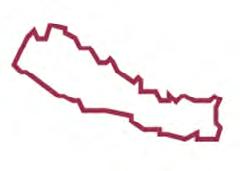
Nepal Economic Forum (NEF) is a premier private sector-led economic policy and research organization that seeks to redefine the economic development discourse in Nepal. Founded in 2009 as a not-for-profit organization under the beed (www. beed.global) umbrella, NEF is a thought center that strives to positively transform Nepal’s economic and development policies by strengthening the Nepali economy through various activities to promote an efficient and inclusive private sector. NEF has been featured in the list of Top Think Tanks in Southeast Asia and the Pacific in the Global Go-To Think Tank Index Reports 2016 through 2021.
NEF BROADLY WORKS UNDER THE FOLLOWING AREAS:
Business Policy Research Center (BPRC) consolidates NEF’s activities into a hub that takes a holistic approach to the issues; generates dialogue between the public and private sectors on economic growth concerns, and acts as a platform for information dissemination.
NEF produced the following products as part of BPRC in 2021:

Himalayan Circular Economy Forum (HICEF)
HiCEF is a platform to ideate research, initiate policy dialogues and disseminate information relating to the circular economy and the Himalayas.
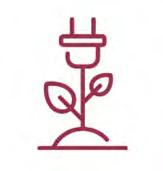

Center for Digital Transformation

Center for Digital Transformation is an incubation program that addresses cross-cutting themes related to digital adoption and revolution in emerging and frontier markets of Asia and Africa.

Global Nepali Network
Global Nepali Network is a platform to connect Nepalis around the world regardless of their citizenship.

Renewable Energy Center
Renewable Energy Center is an incubation program that engages multiple stakeholders to articulate discourse that will shape nationallevel energy policies.
Nepal and the World Nepal and the World (NAW) will study Nepal's foreign policy and diplomacy.
Center for Private Sector Development
The Center for Private Sector Development (CPSD) will focus on private sector-led development by supporting the growth of small and medium enterprises.
DOCKING NEPAL’S ECONOMIC ANALYSIS 112
Nepal Economic Forum has been engaged in the discourse of federalism in Nepal since 2009. NEF has engaged in multiple policy discourses, conducted assessments and produced publications on Doing Business in Nepal against the backdrop of federalism. Hence, through the Doing Business in Federated Nepal (DBFN) vertical, NEF shall continue to engage itself in fostering a conducive business environment in the federated structure, supporting local businesses and empowering local bodies in governance. For this, NEF intends to open national chapters in each of the seven provinces of Nepal to promote localized efforts.
NEF operates in domain of Development Consulting (devCon) in conjunction with beed management. It works with a variety of bilateral, multilateral, national and international institutions in the areas of policy research, economic analysis, value chain analysis, enterprise development, sectorial studies and public private dialogue.

We are striving to ensure financial sustainability for NEF to complement the support it currently receives from beed management and the Open Society Foundations. If you are interested to support NEF, please do get in touch with info@nepaleconomicforum.org
www.linkedin.com/company/nepal-economic-forum



@NEFNepal
https://www.youtube.com/channel/UCP5RNfvnTKSuSrZO4gqGpJw
@nepaleconomicforum
@nepaleconomicforum
https://medium.com/@nepal-economic-forum



NEFPORT ISSUE 52 – MARCH 2023 113





